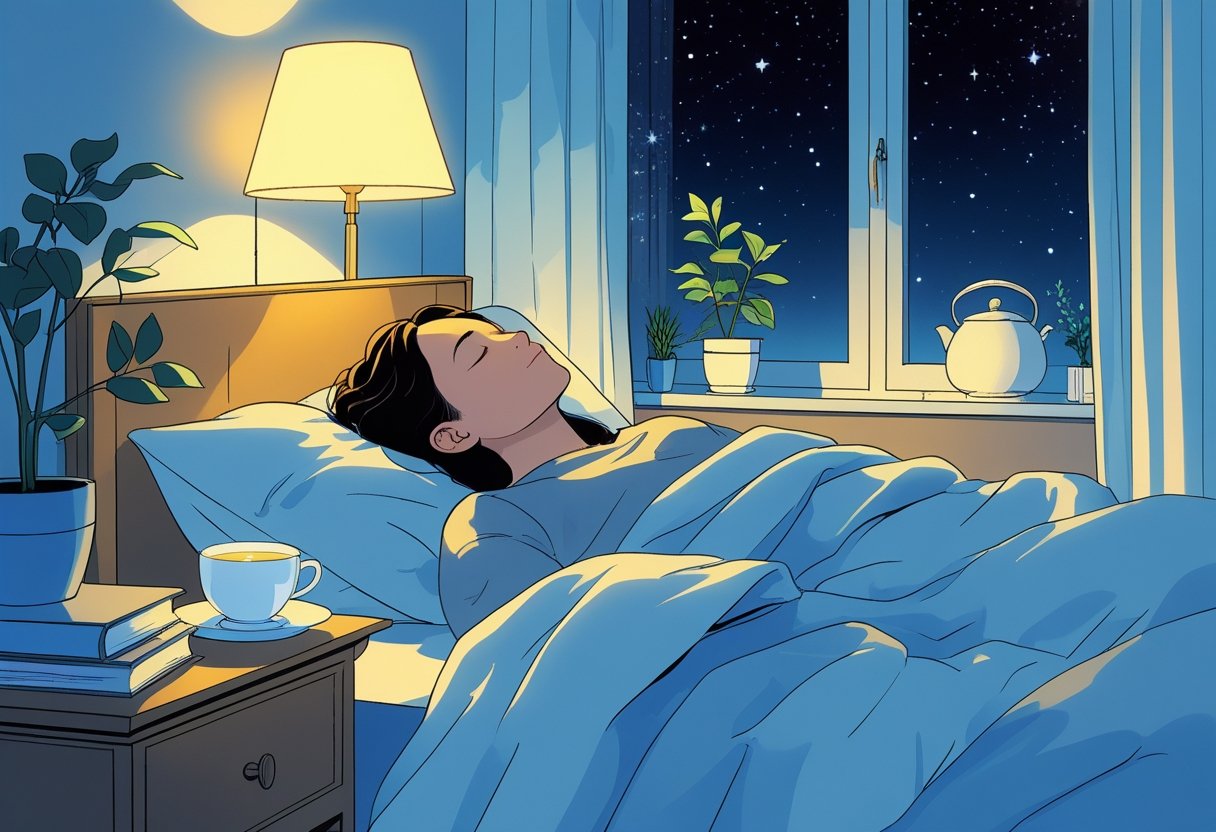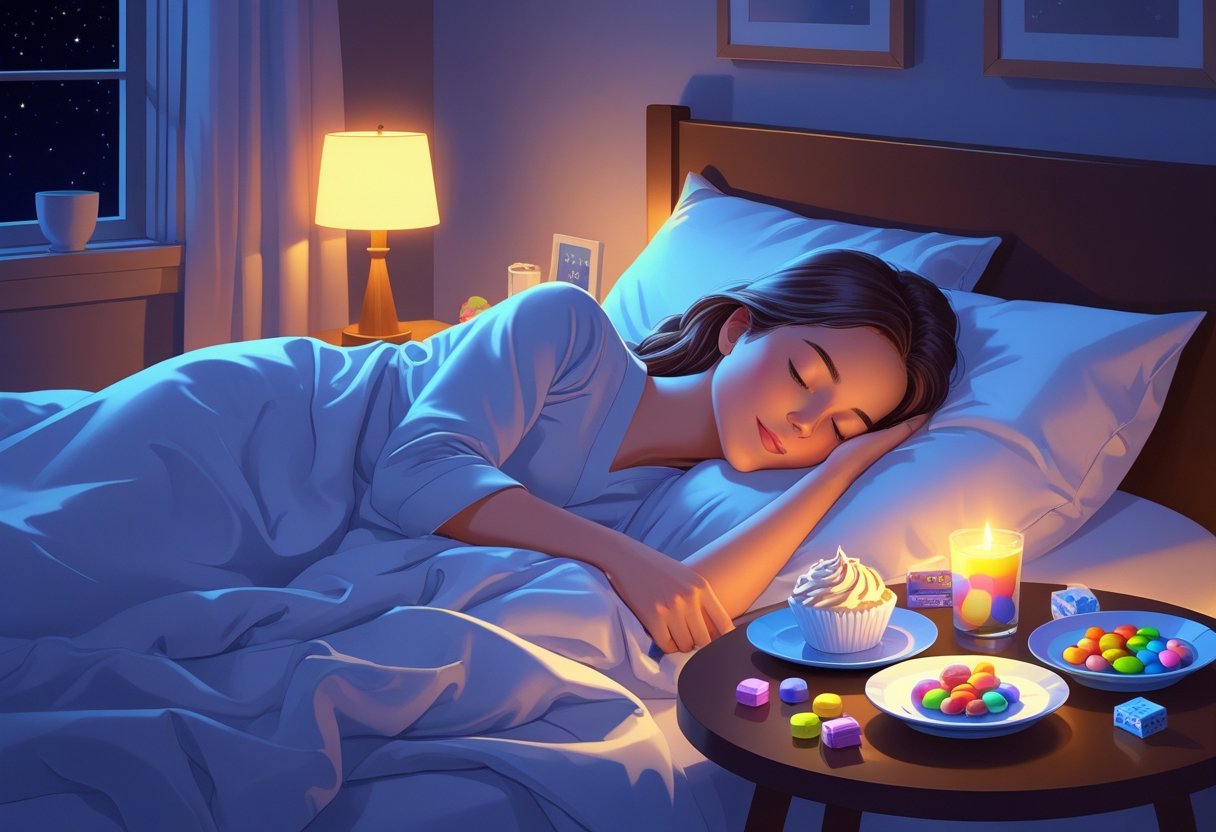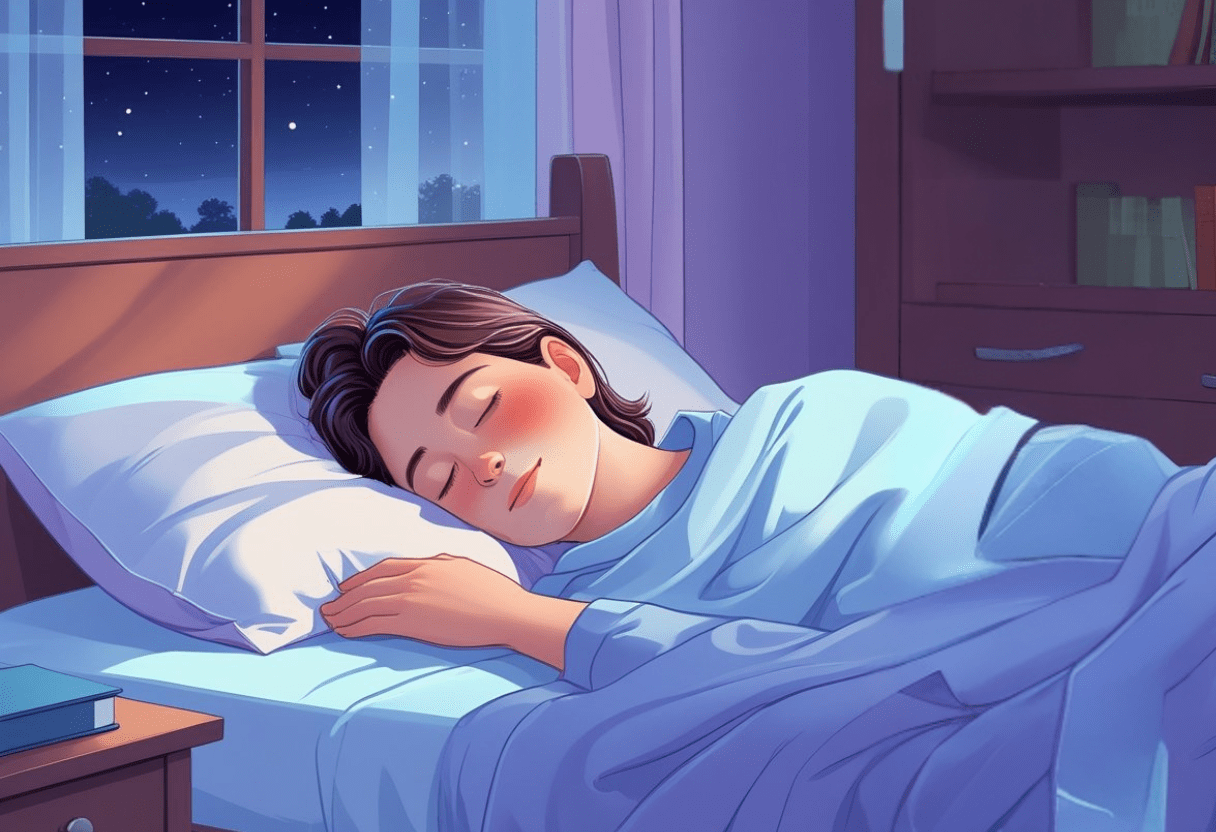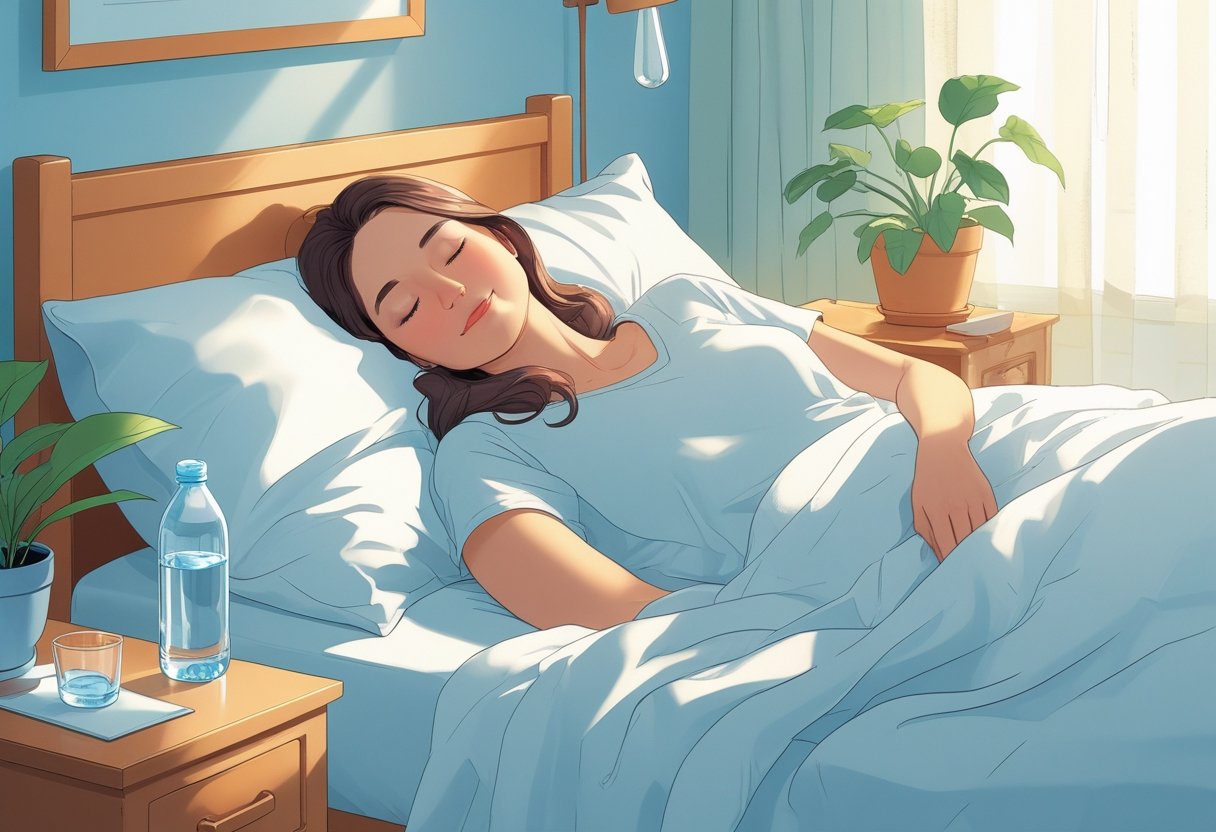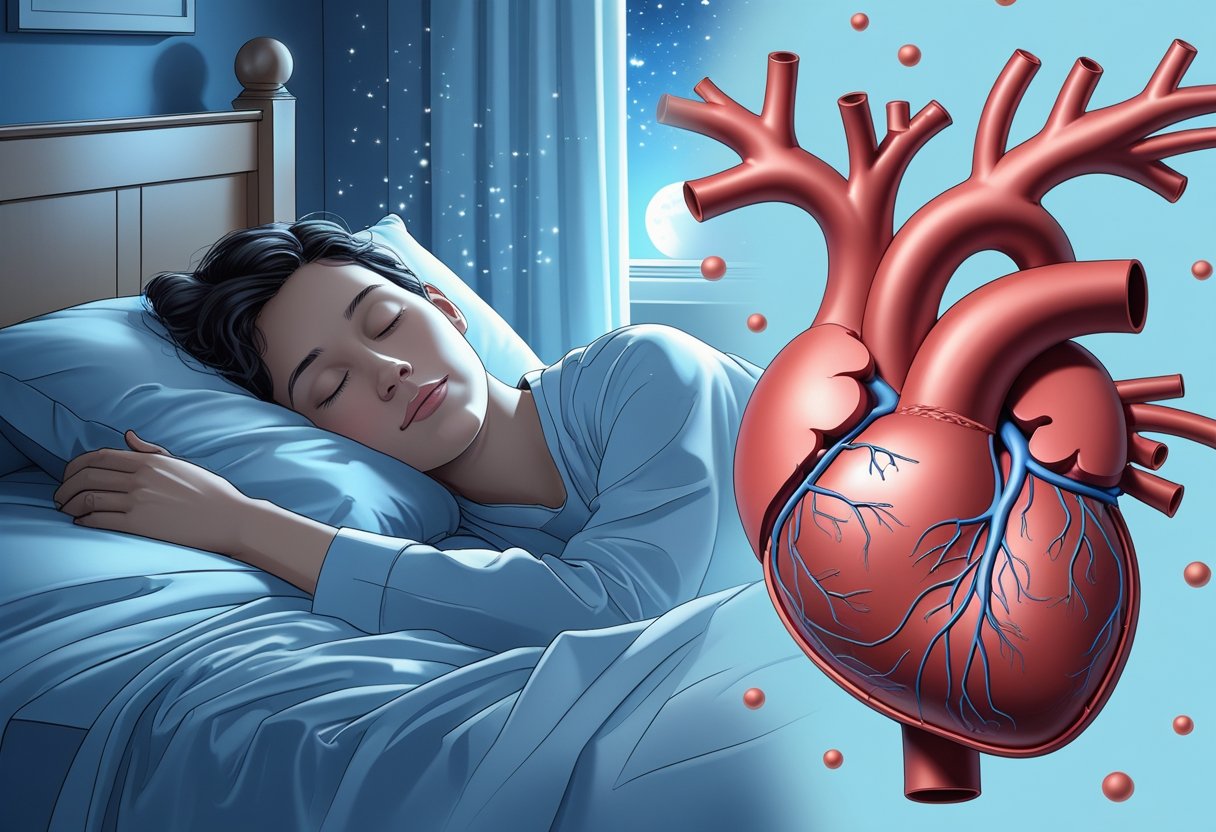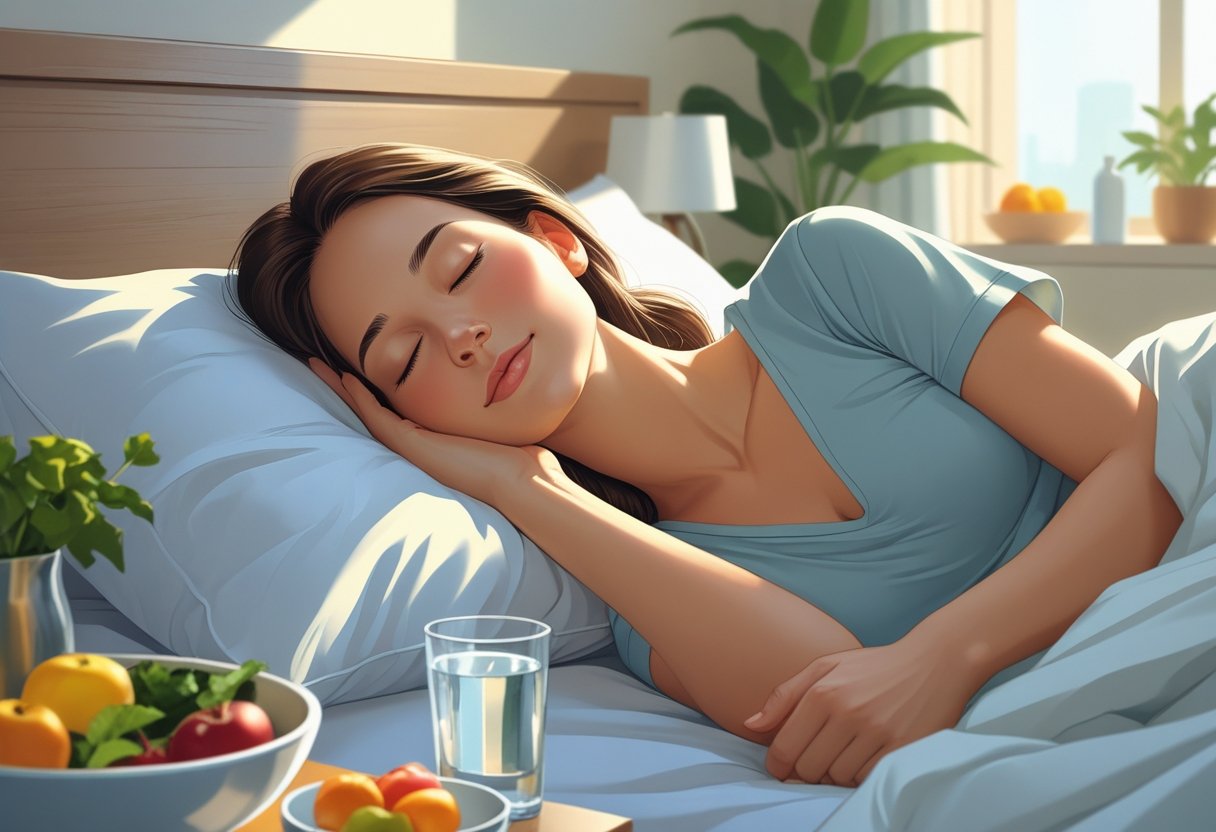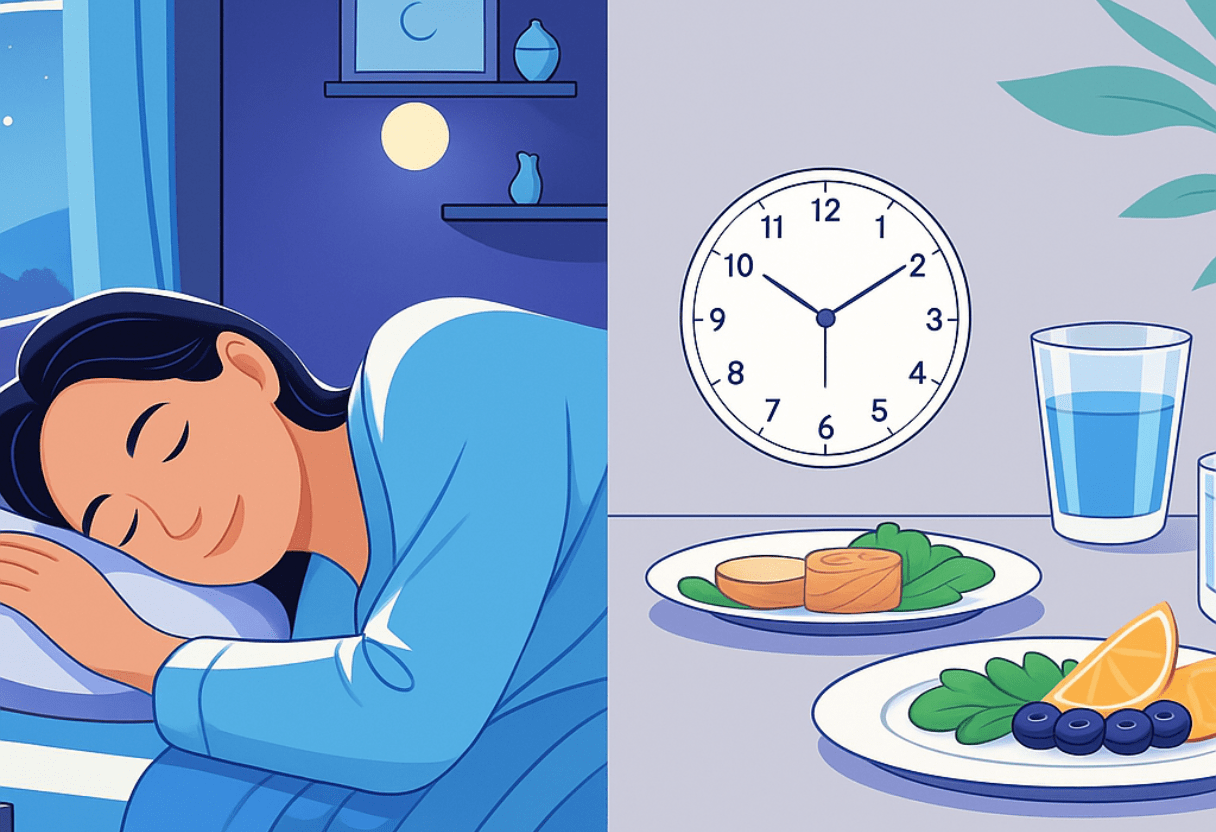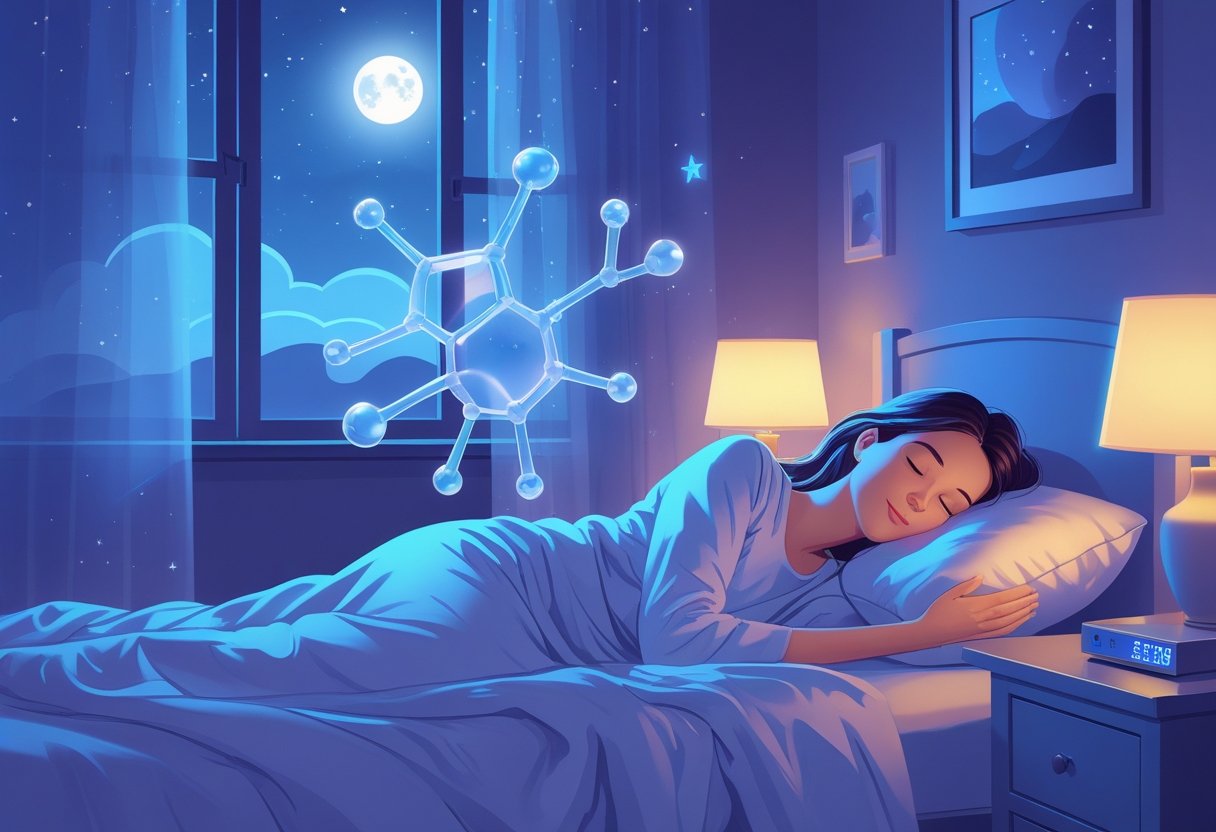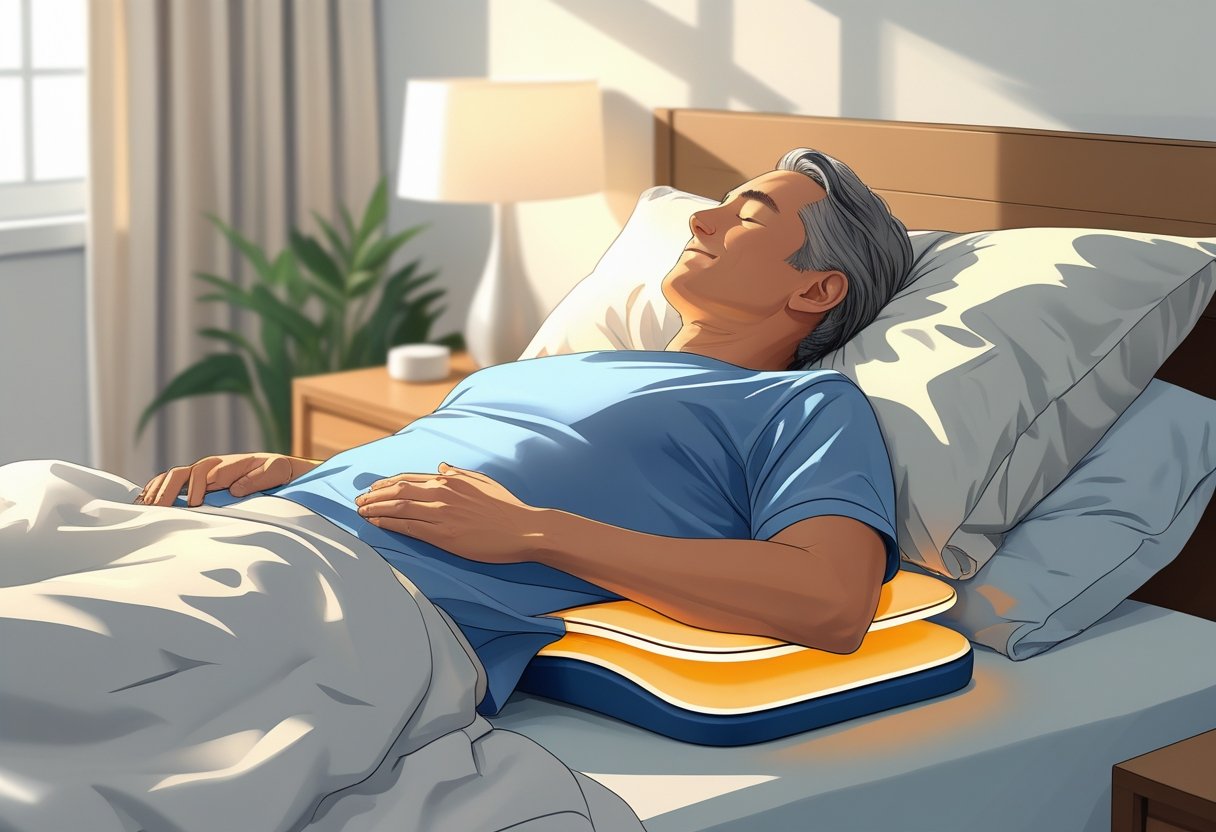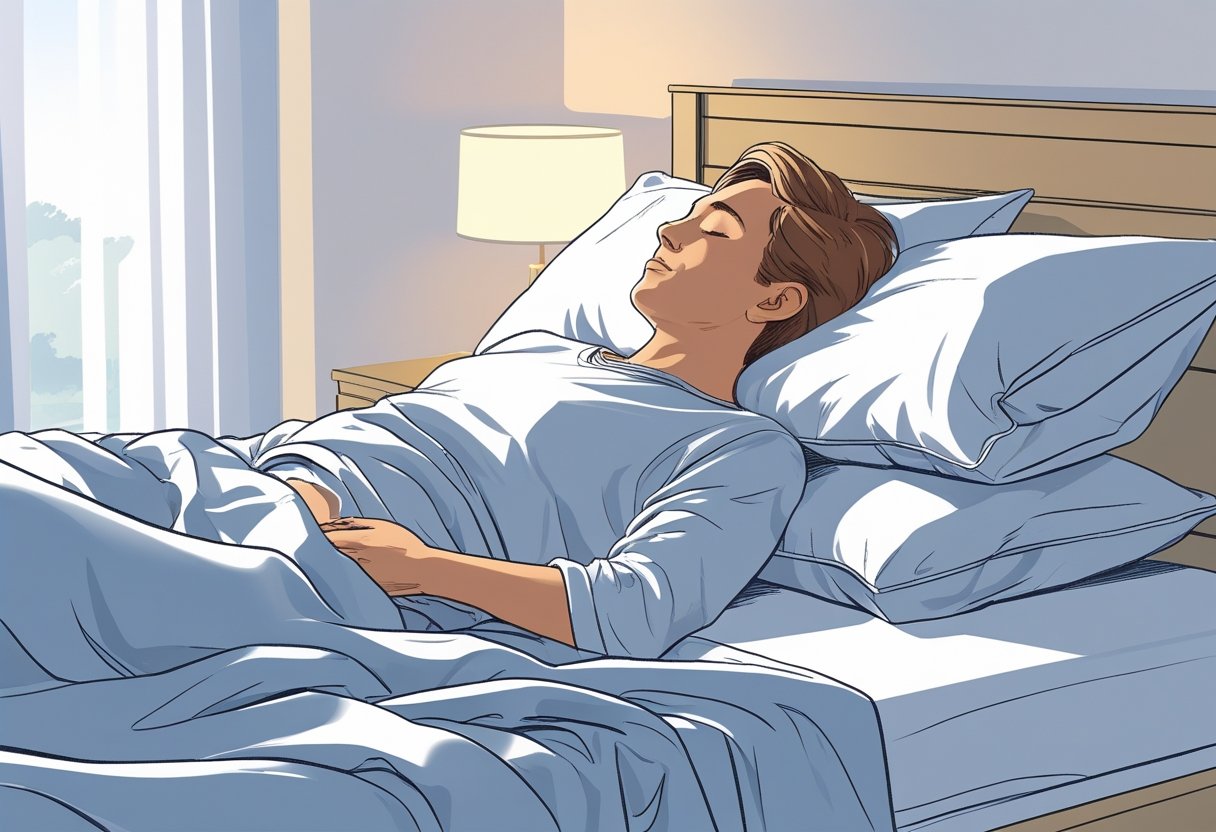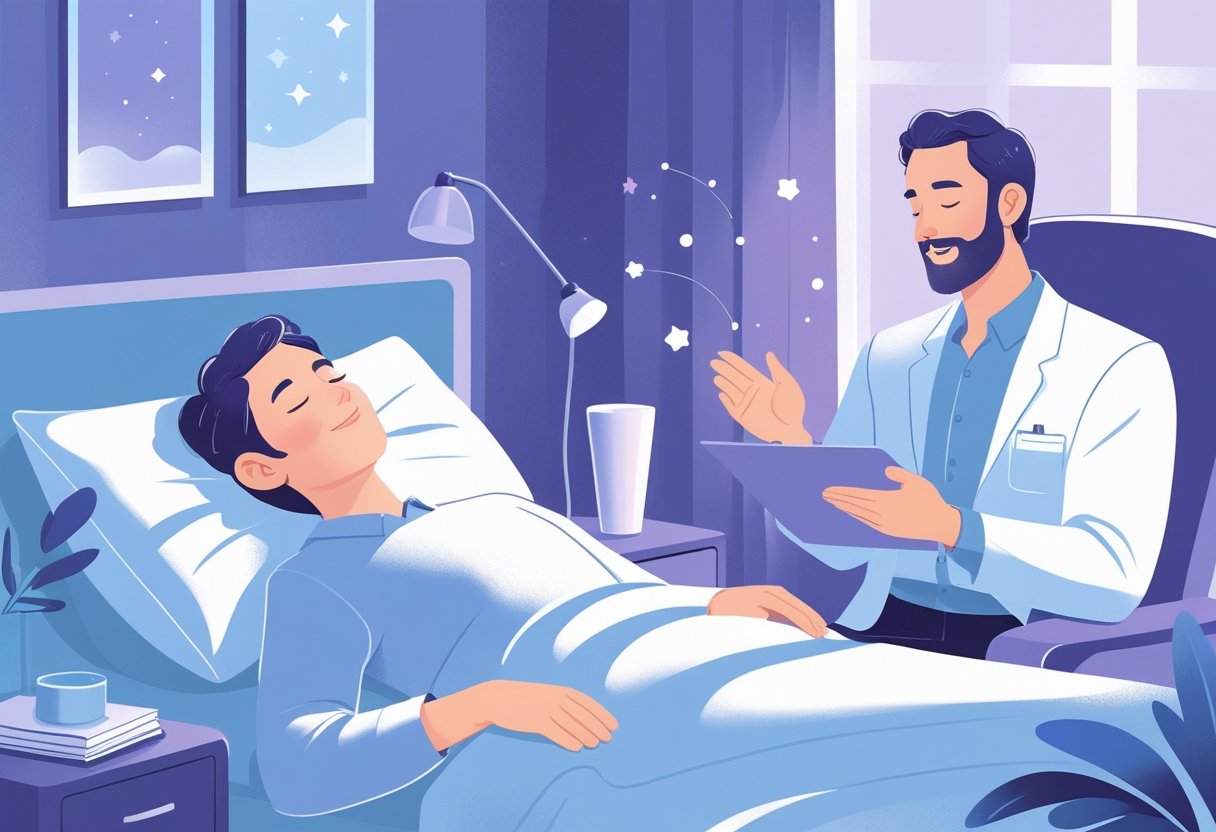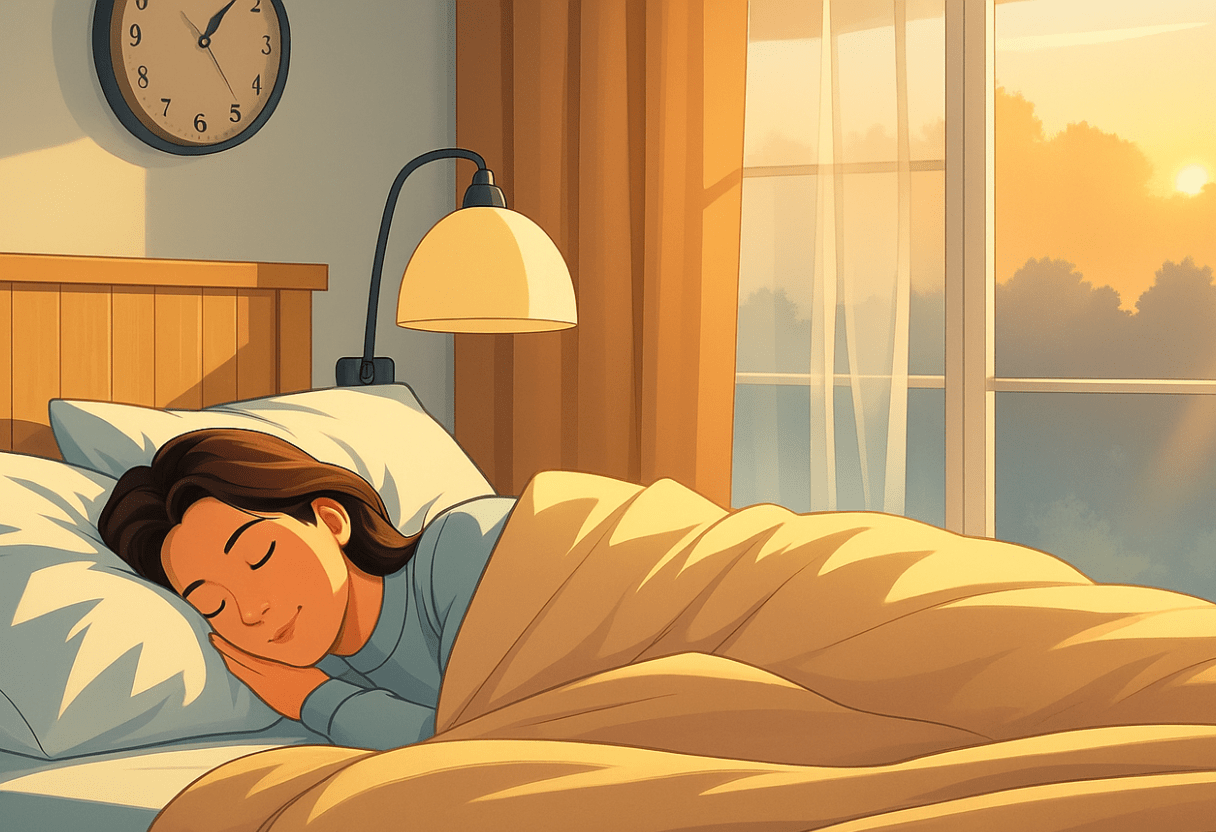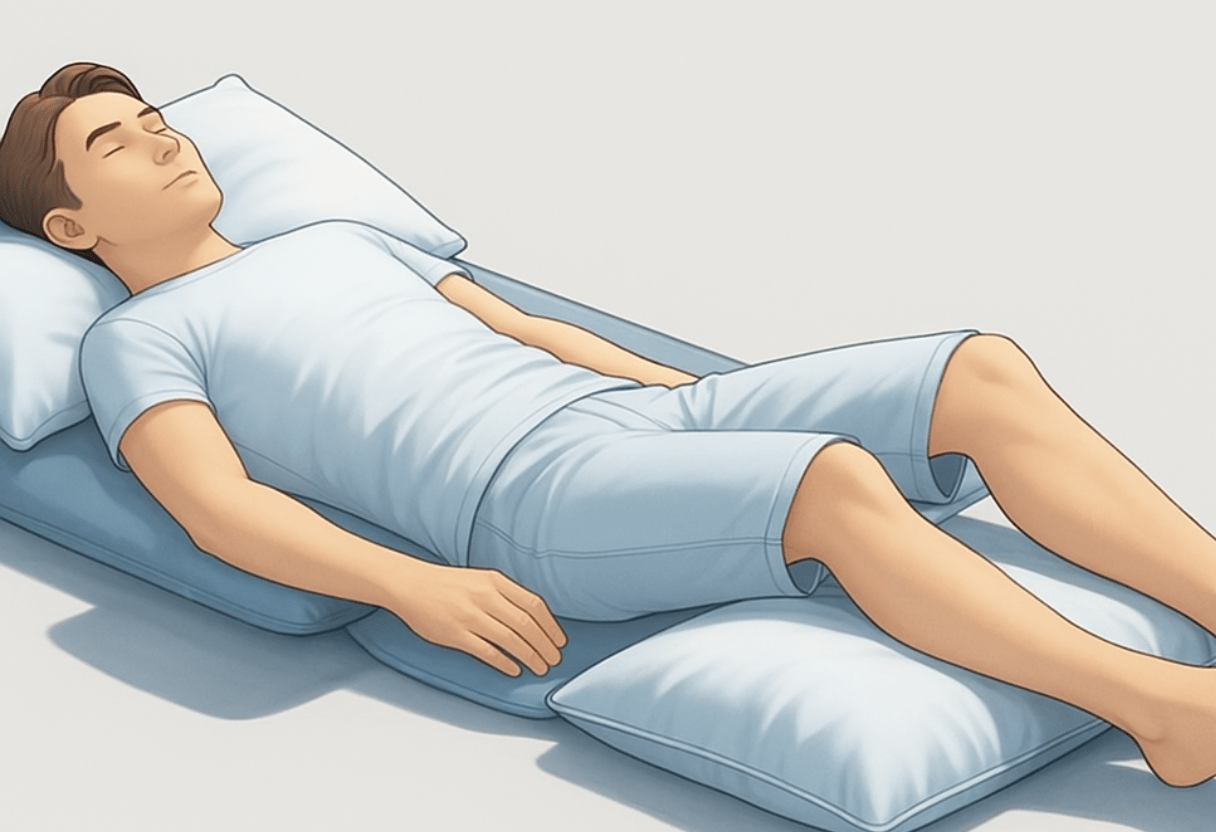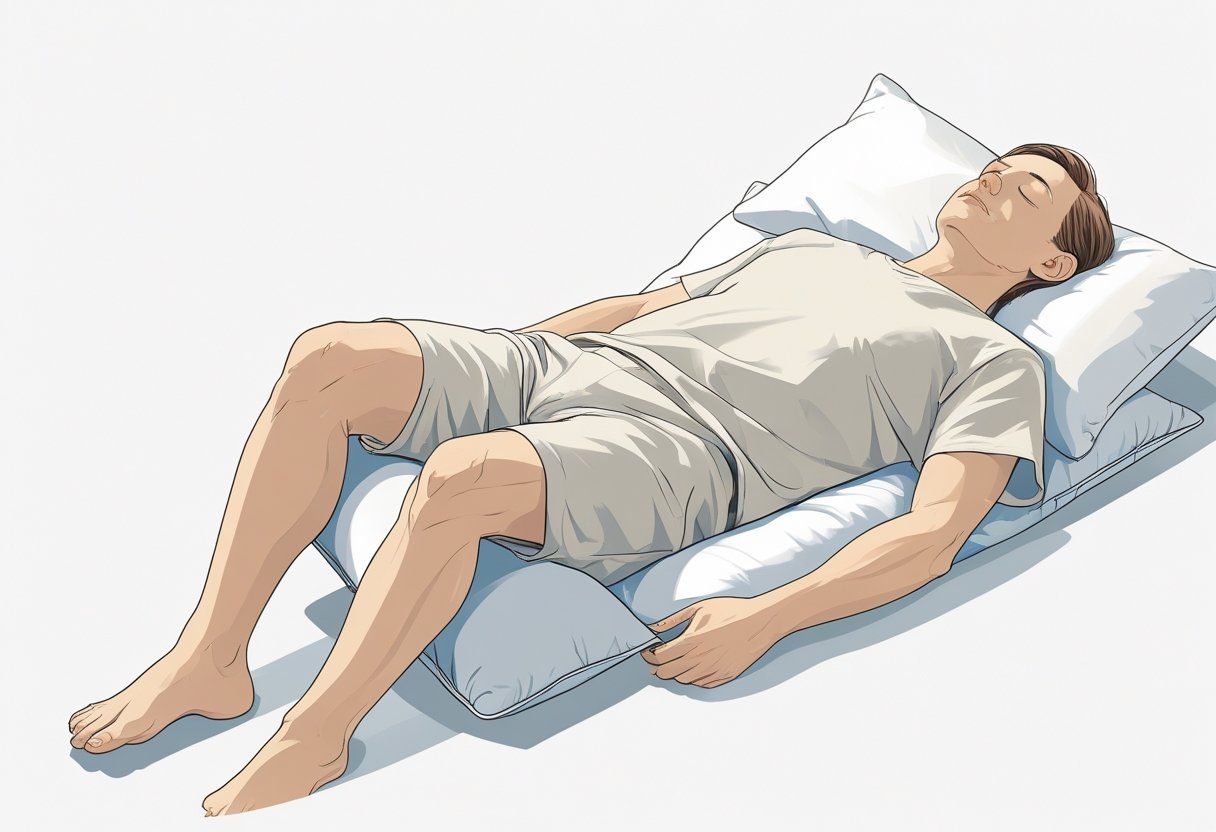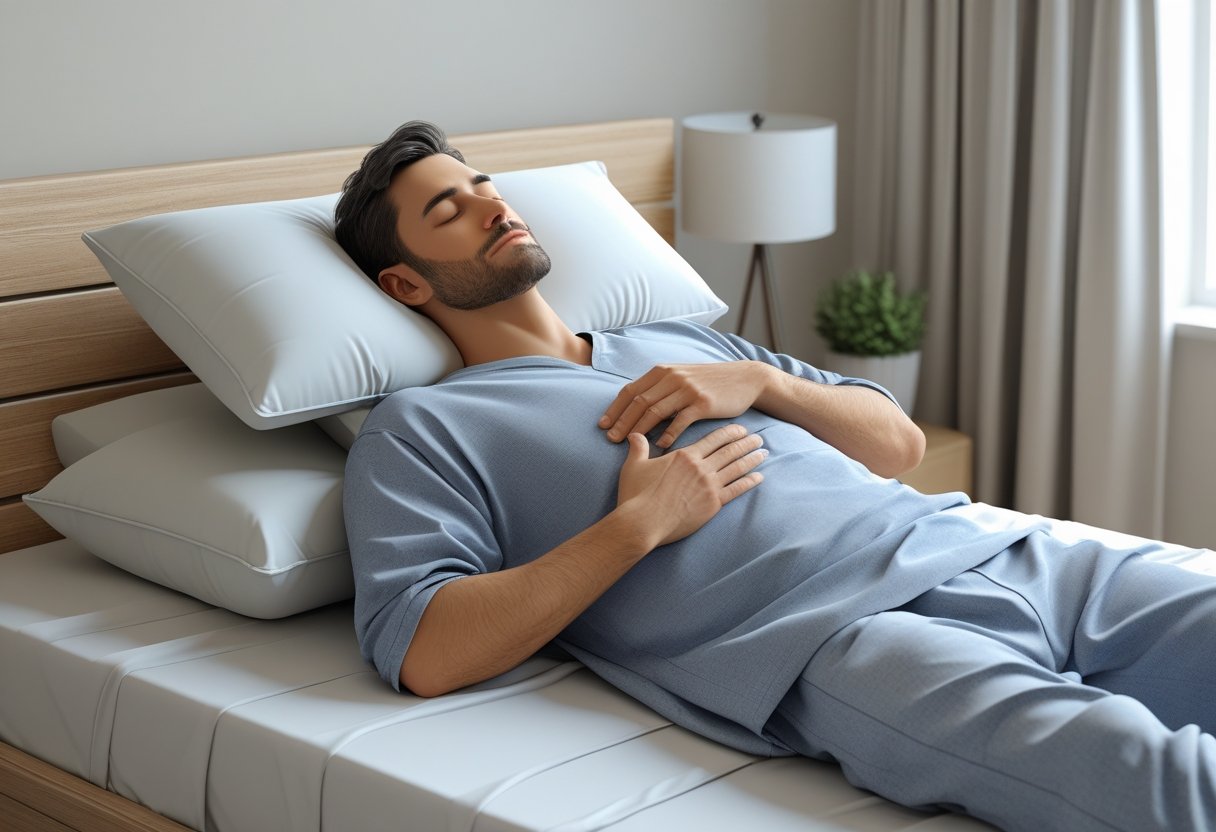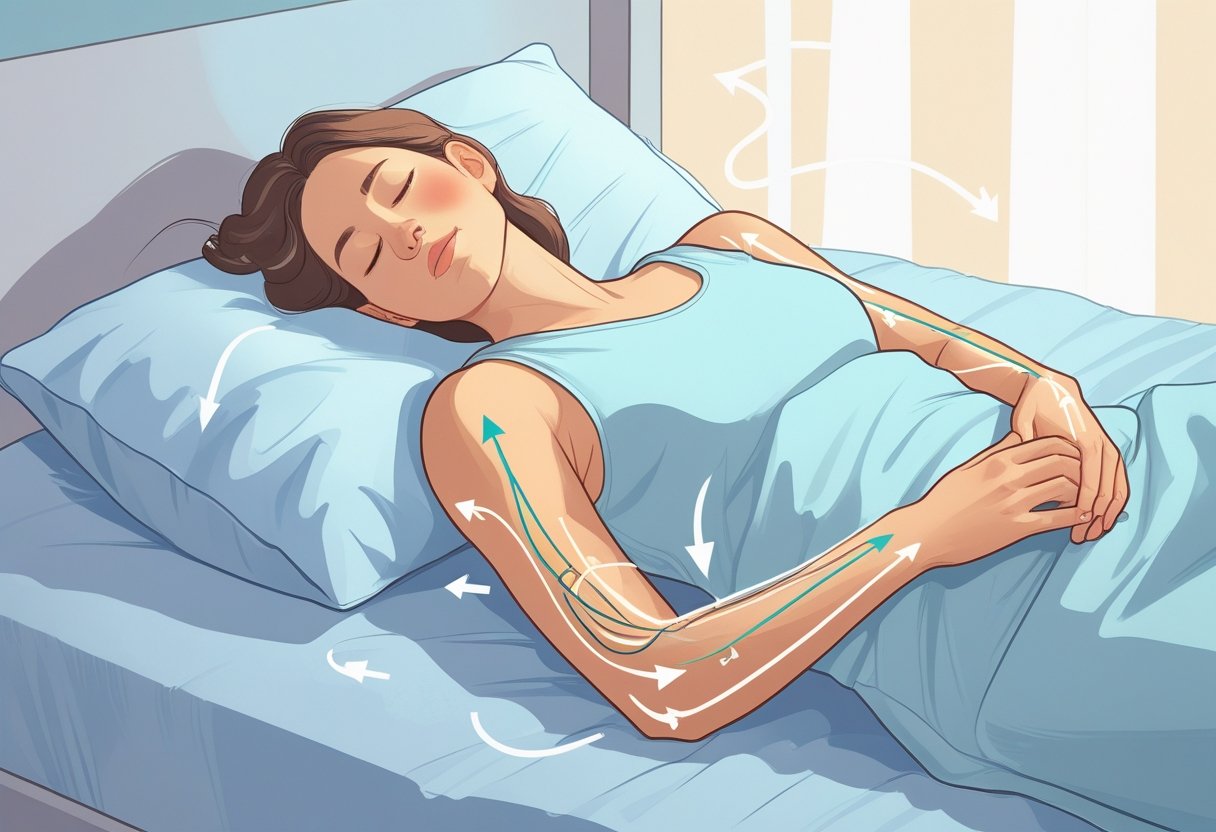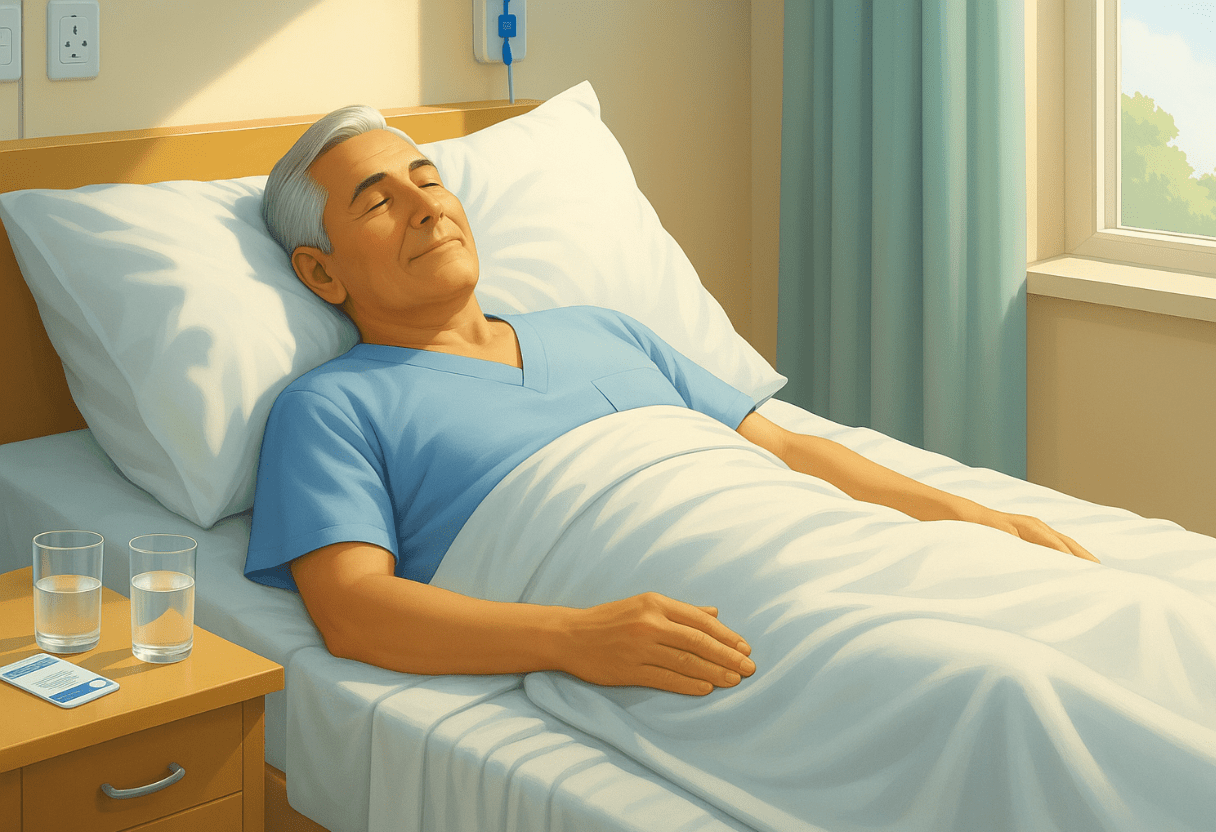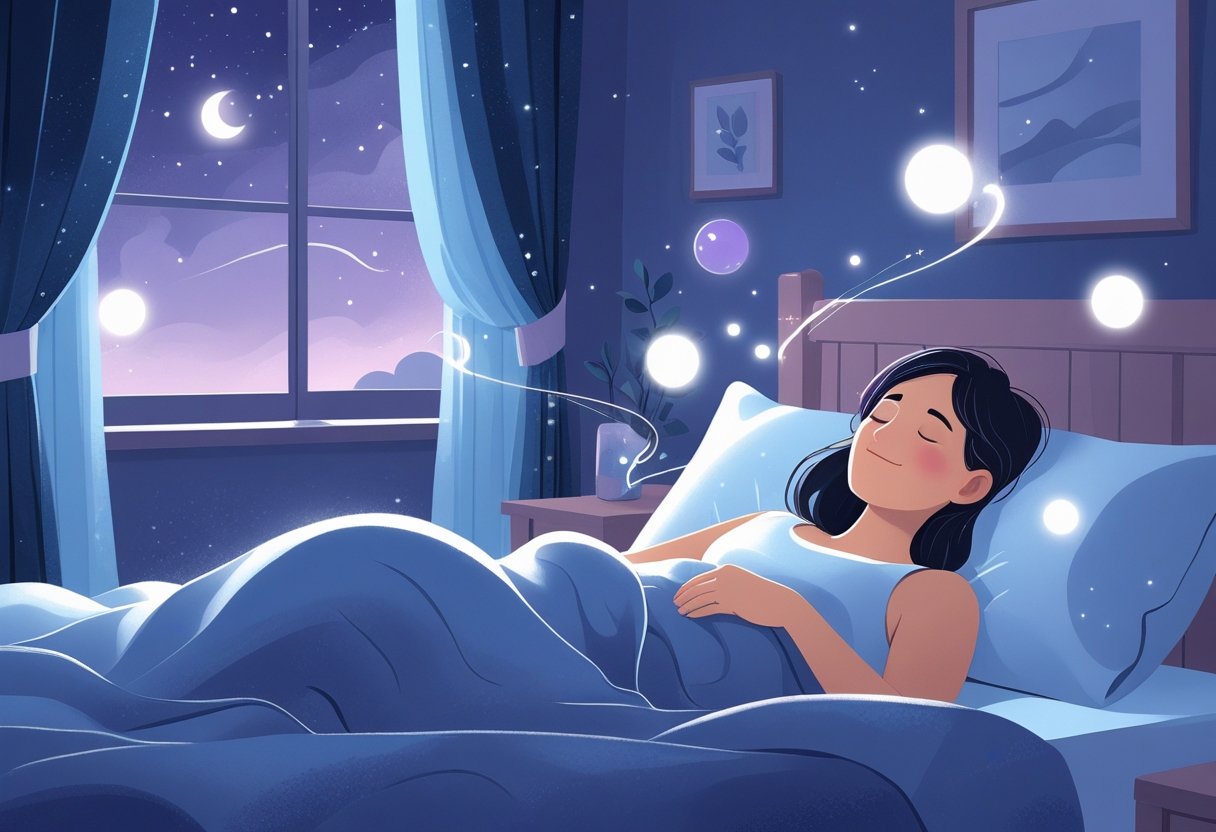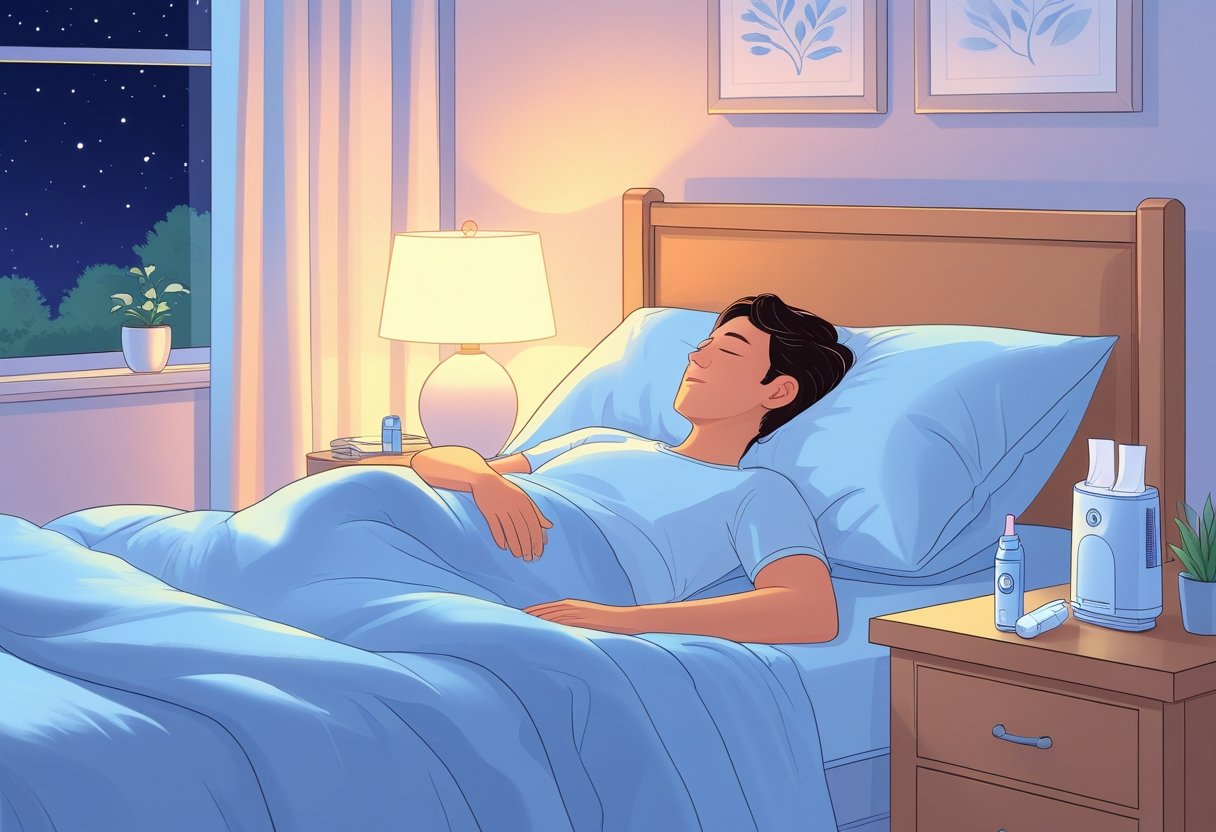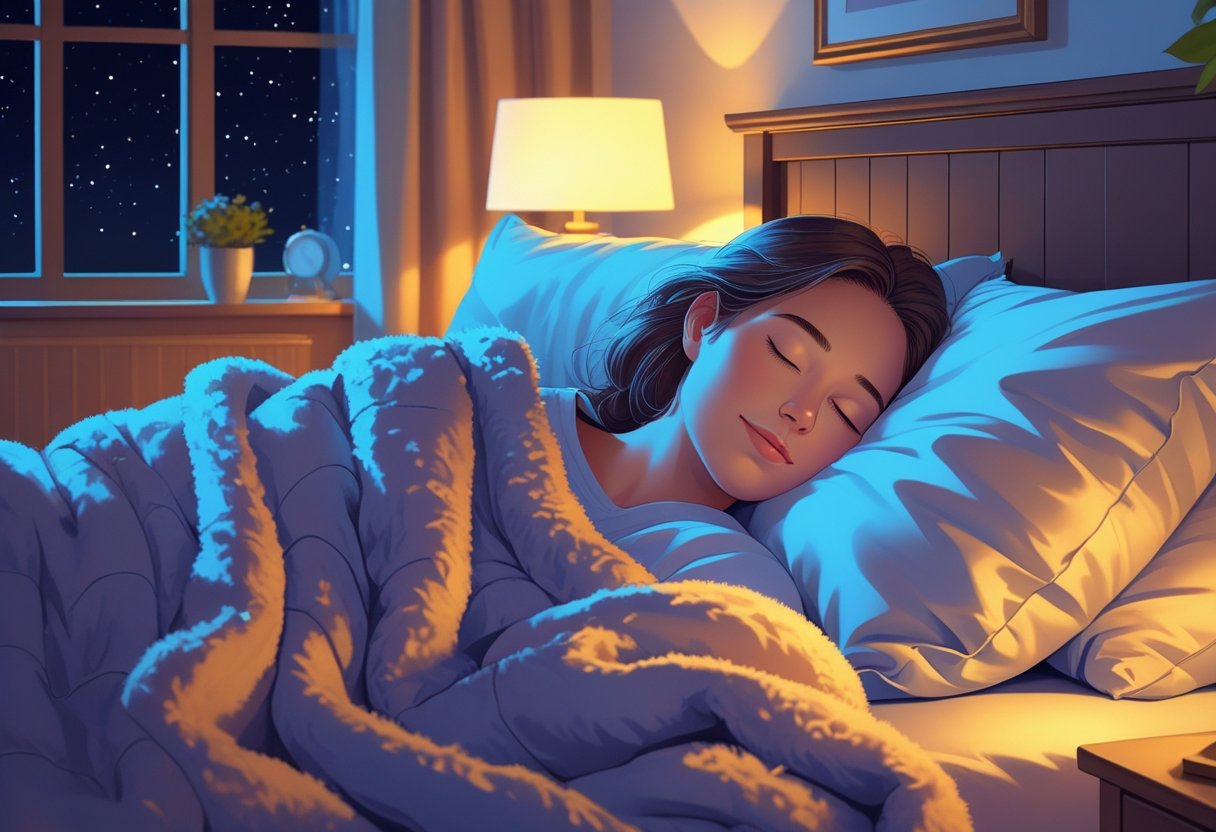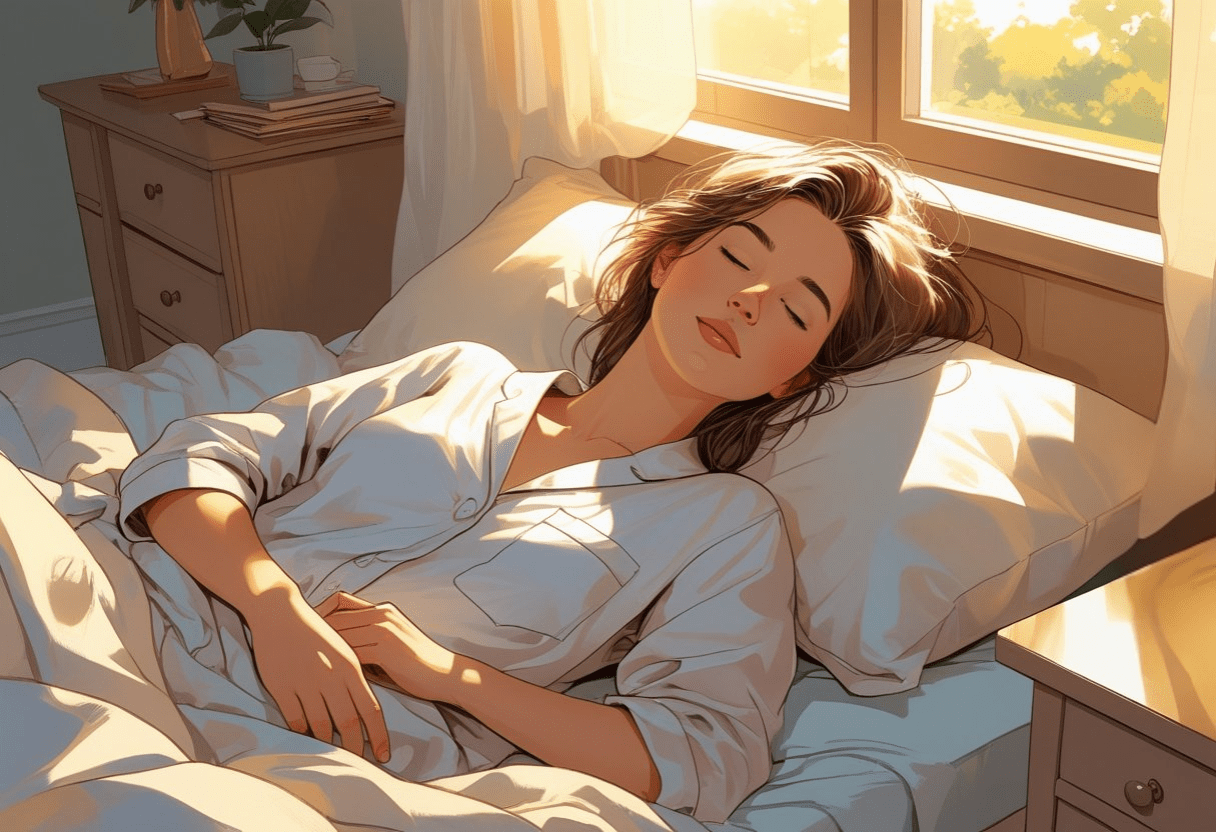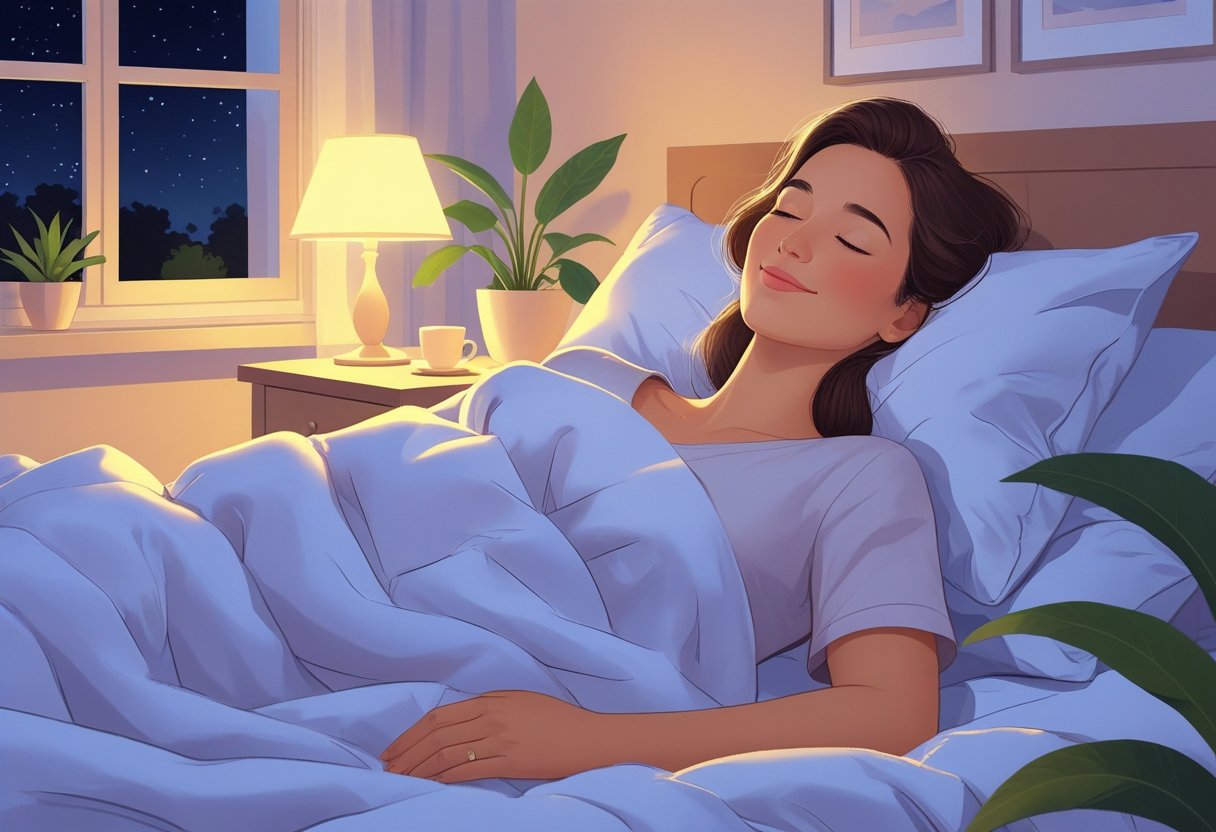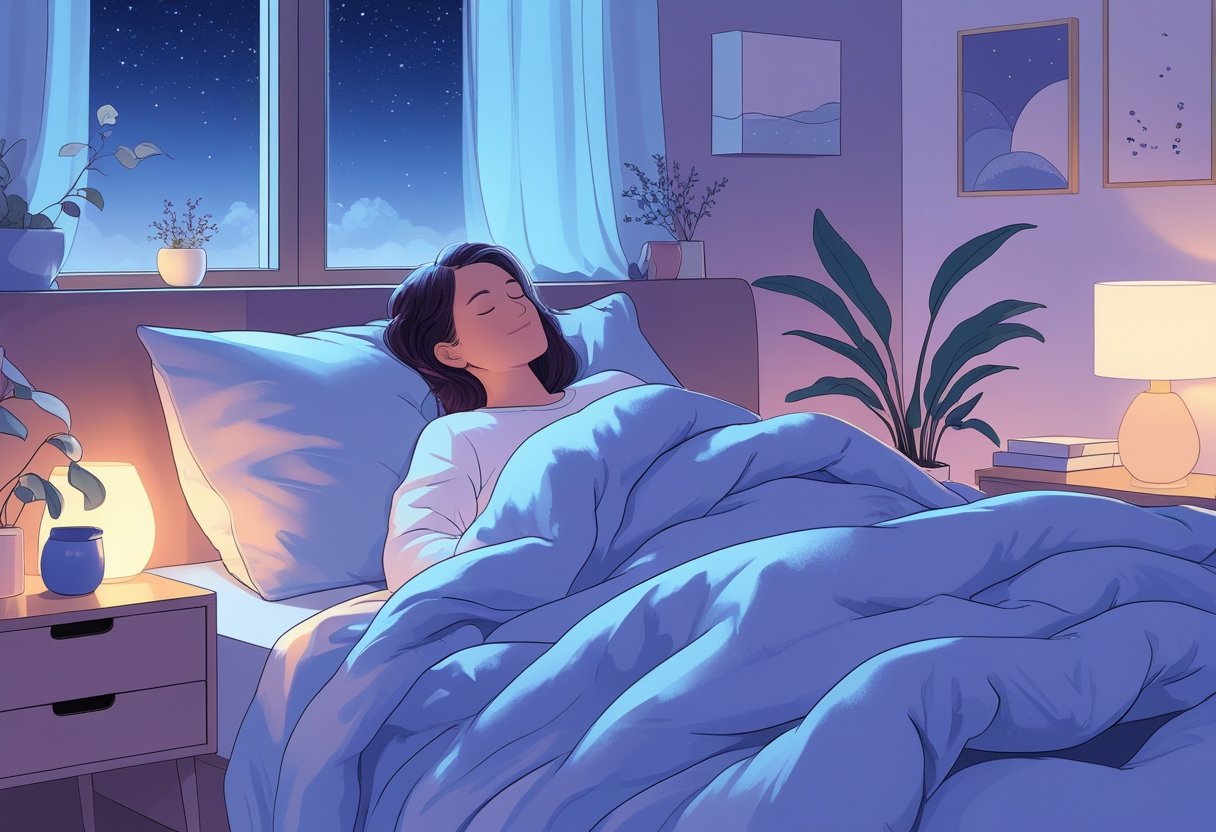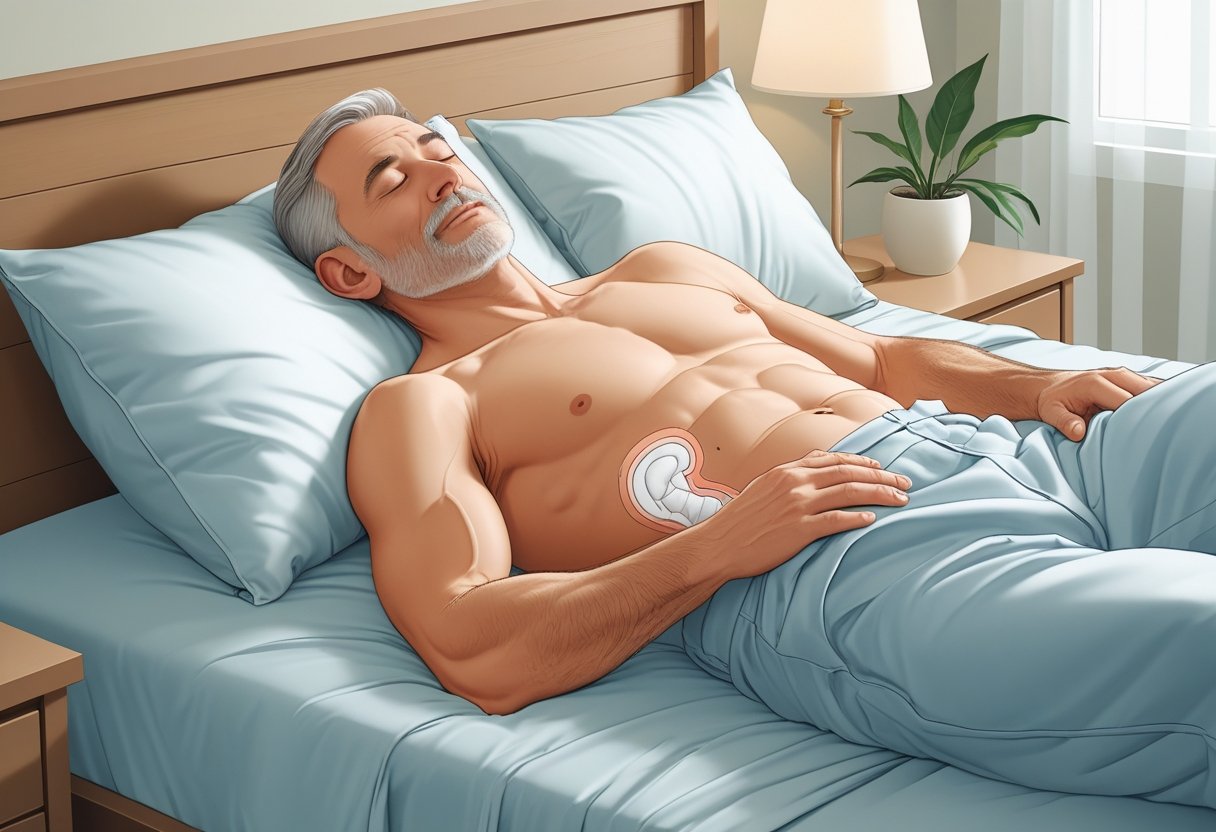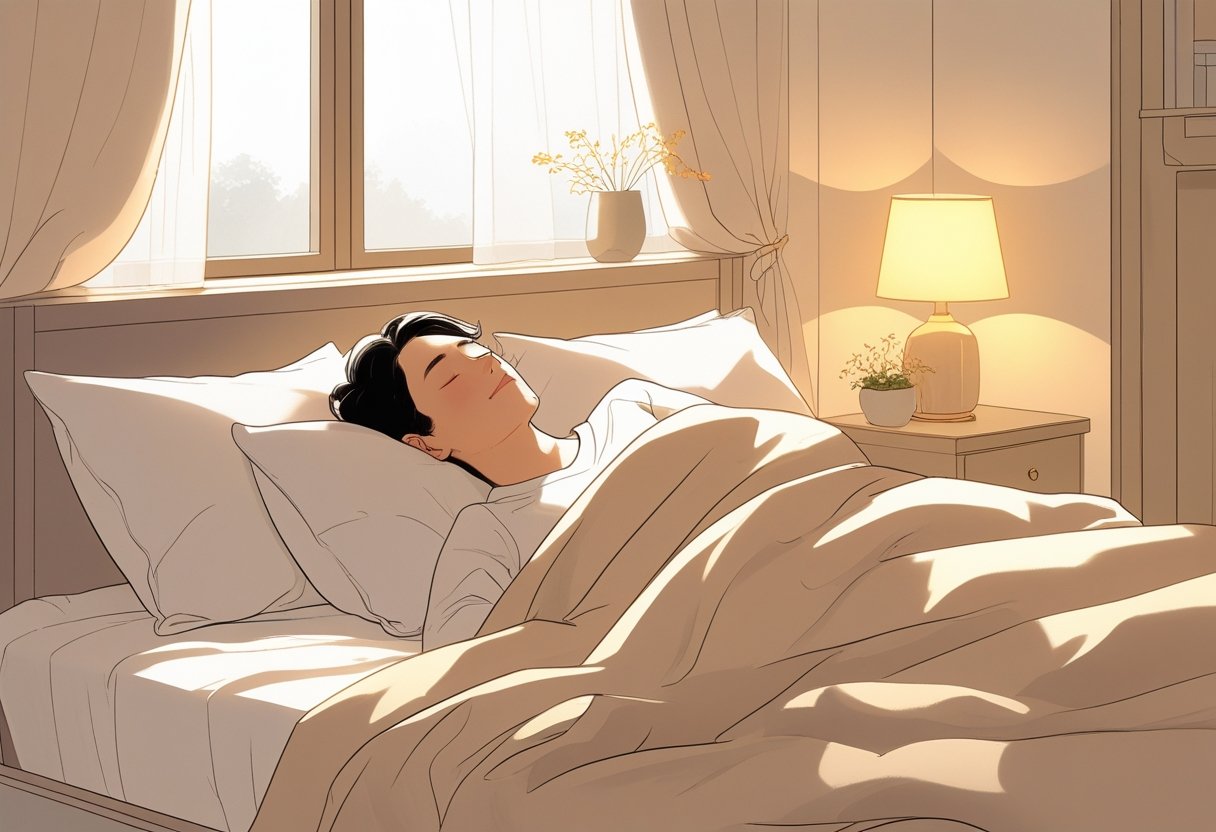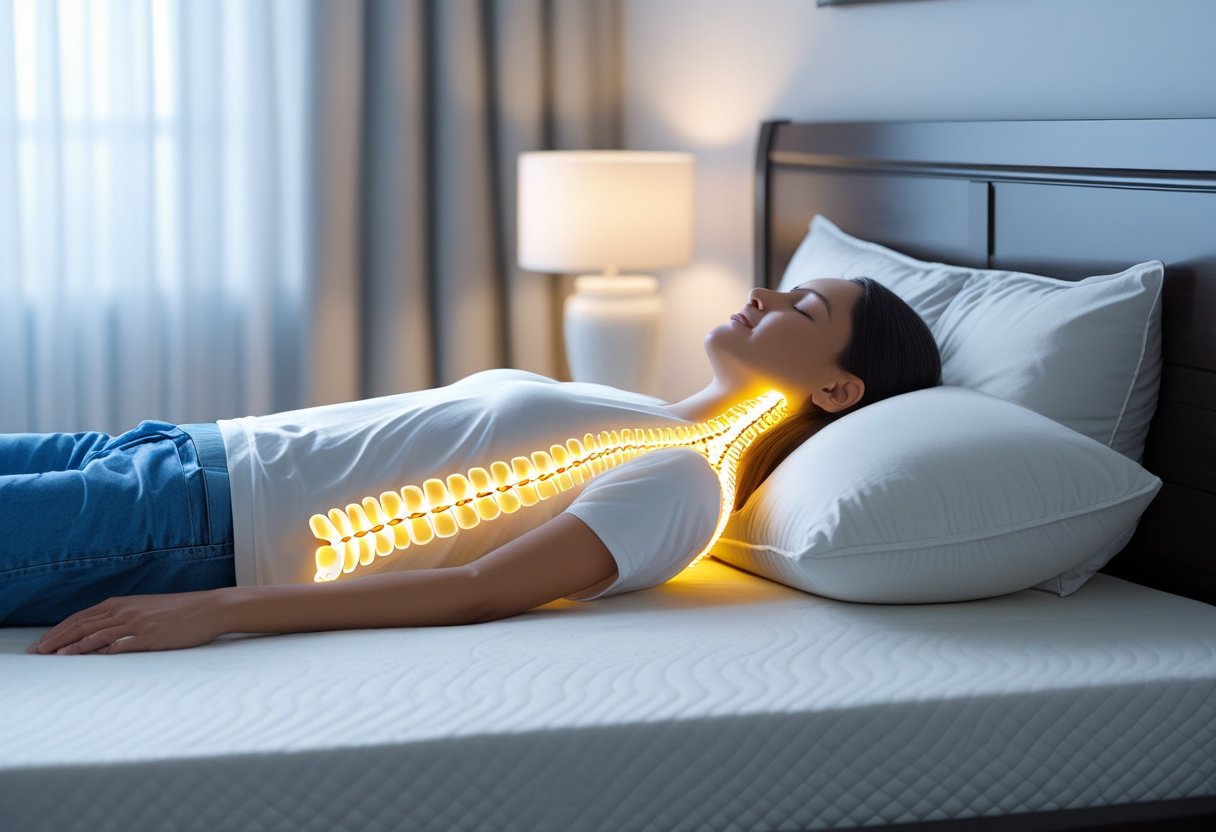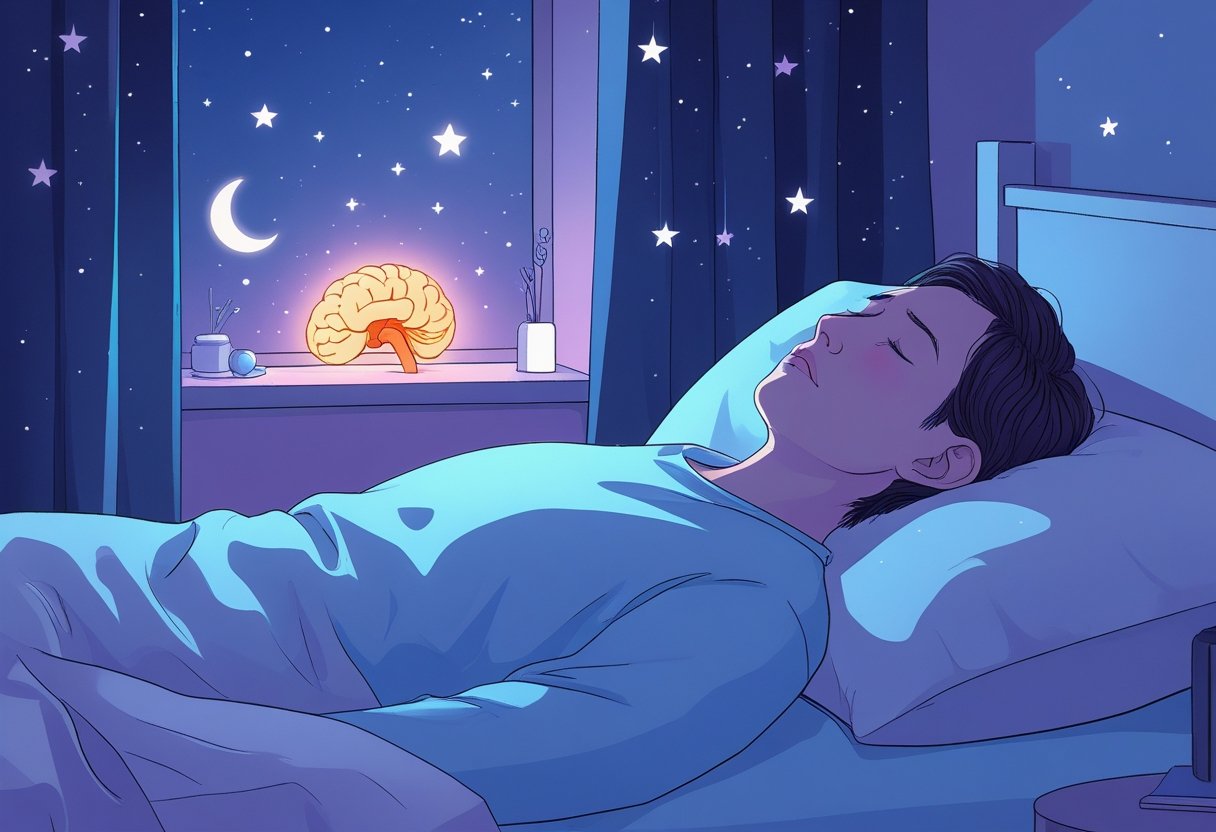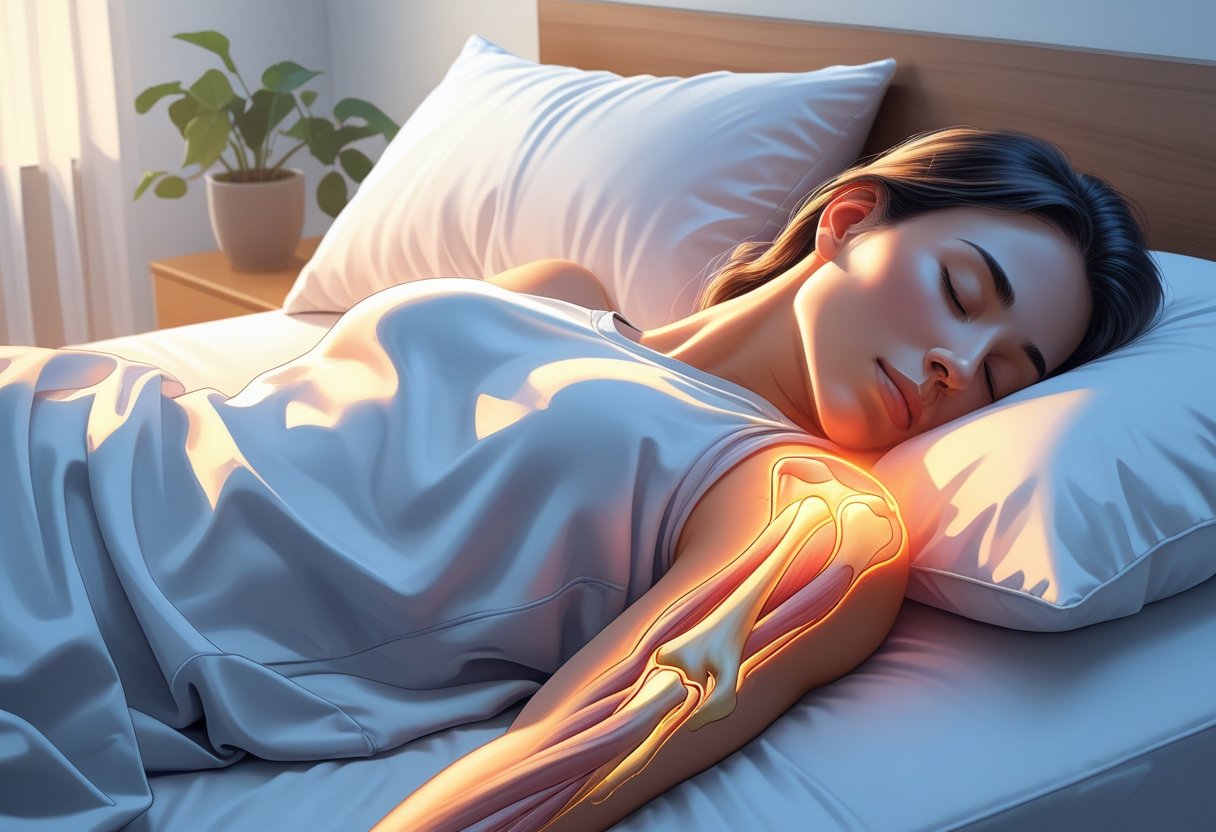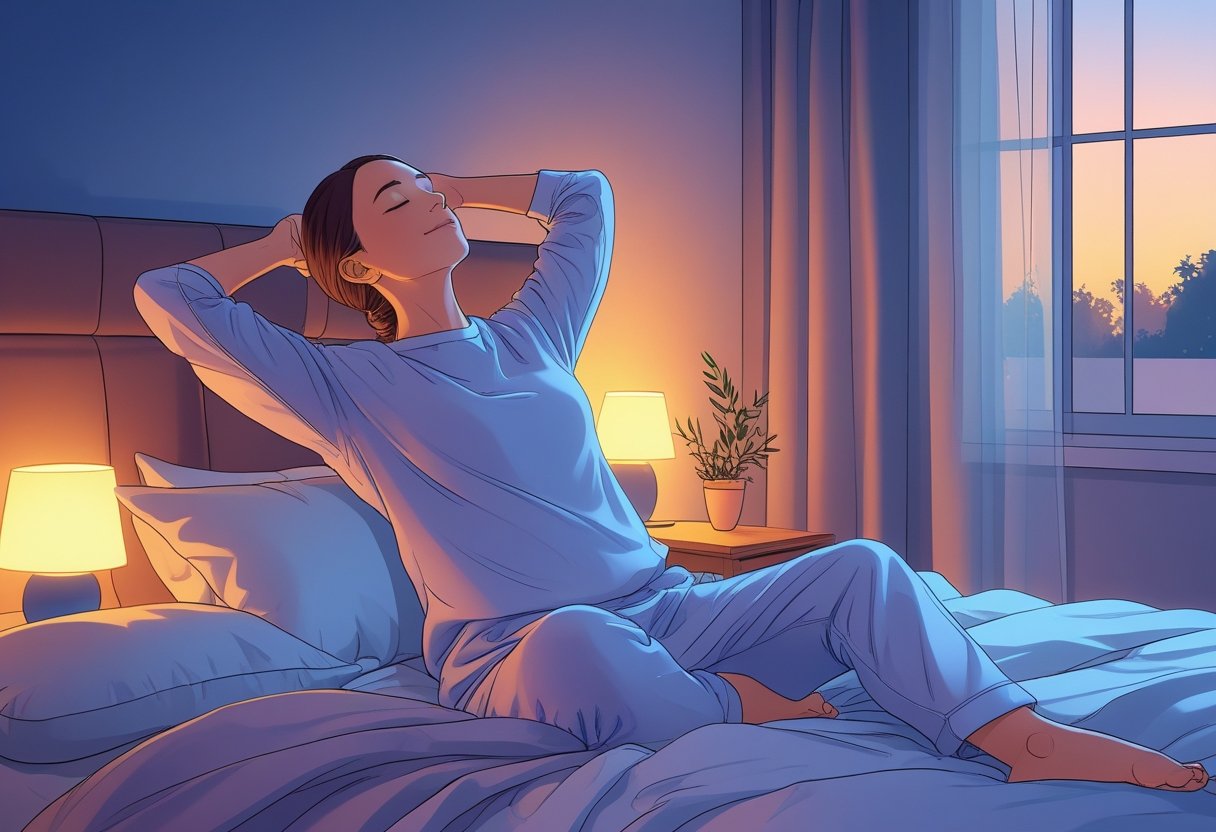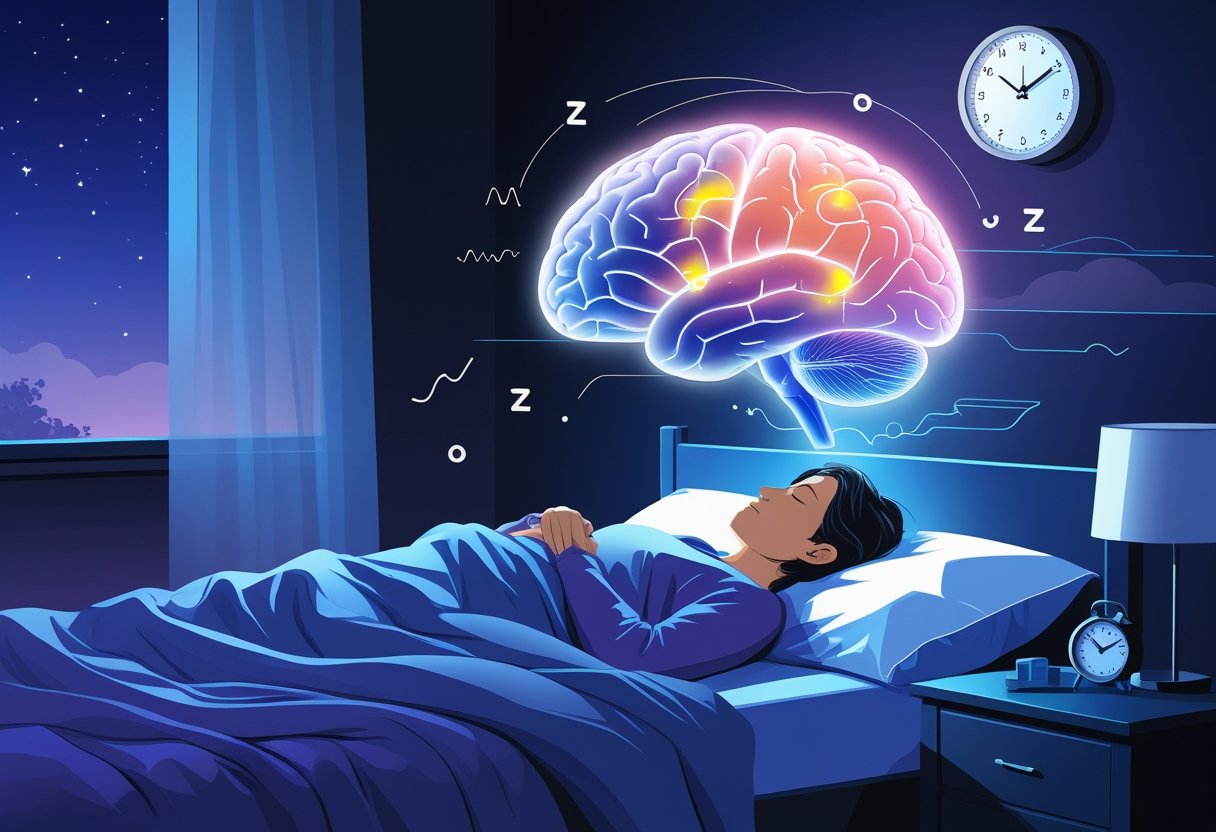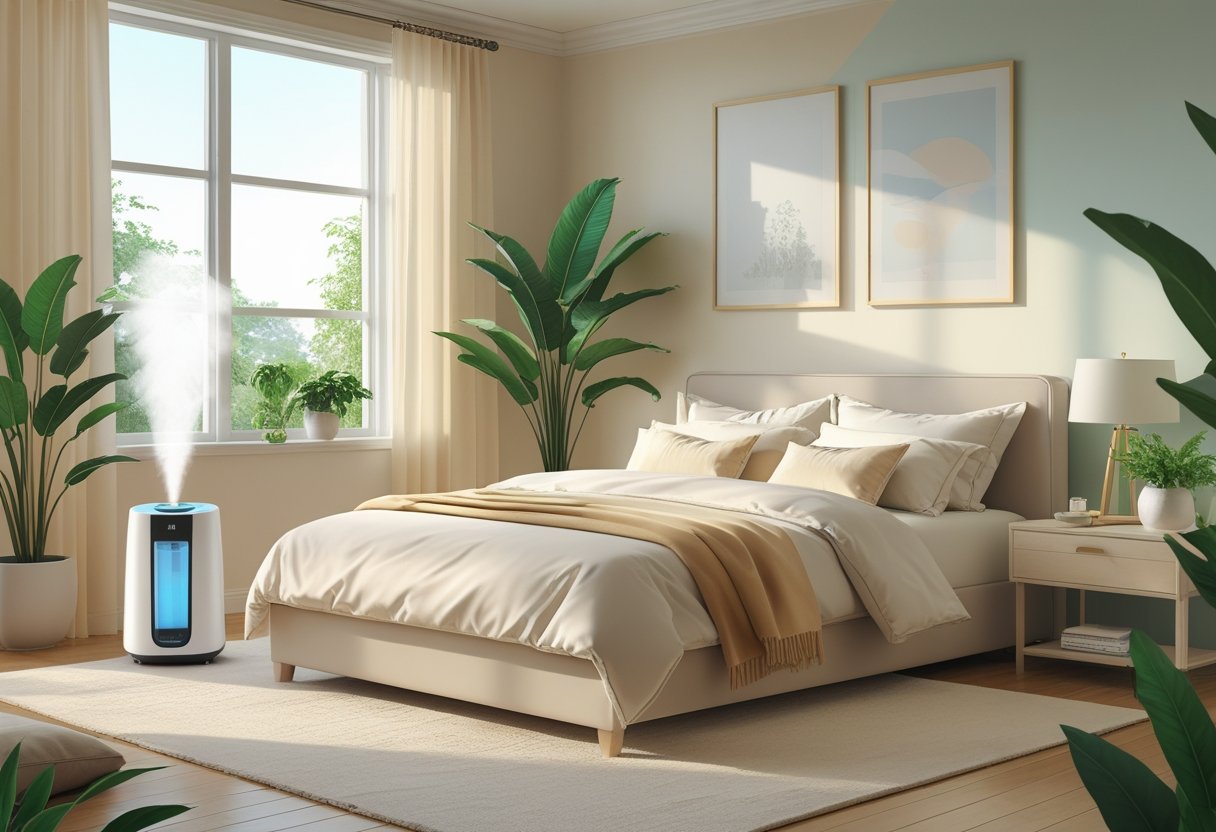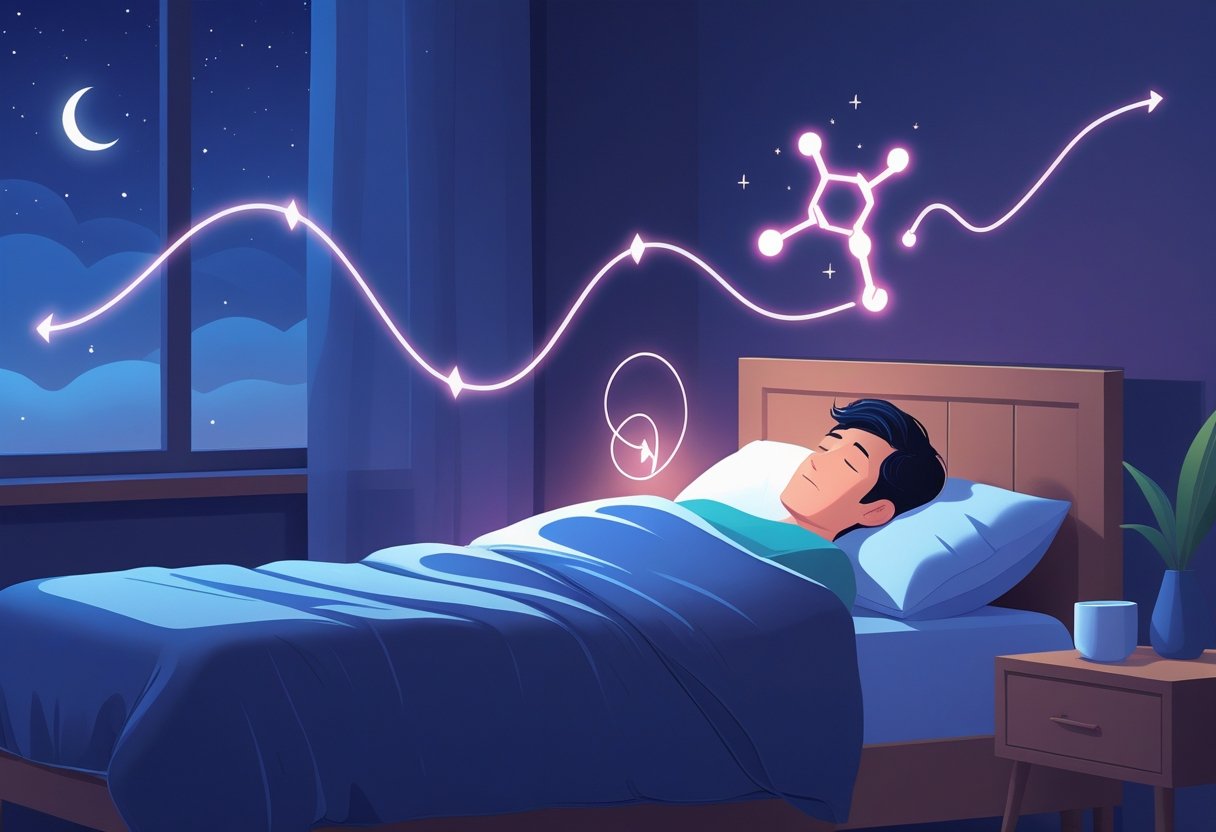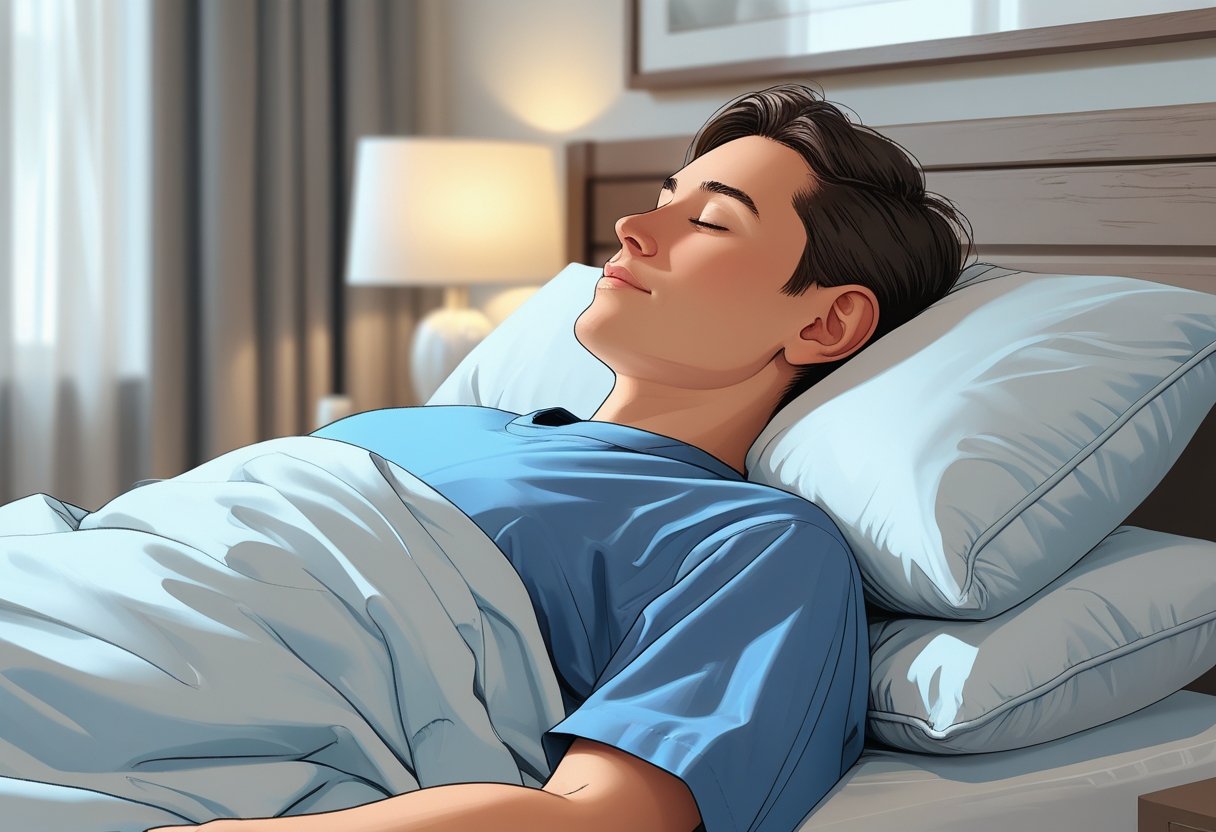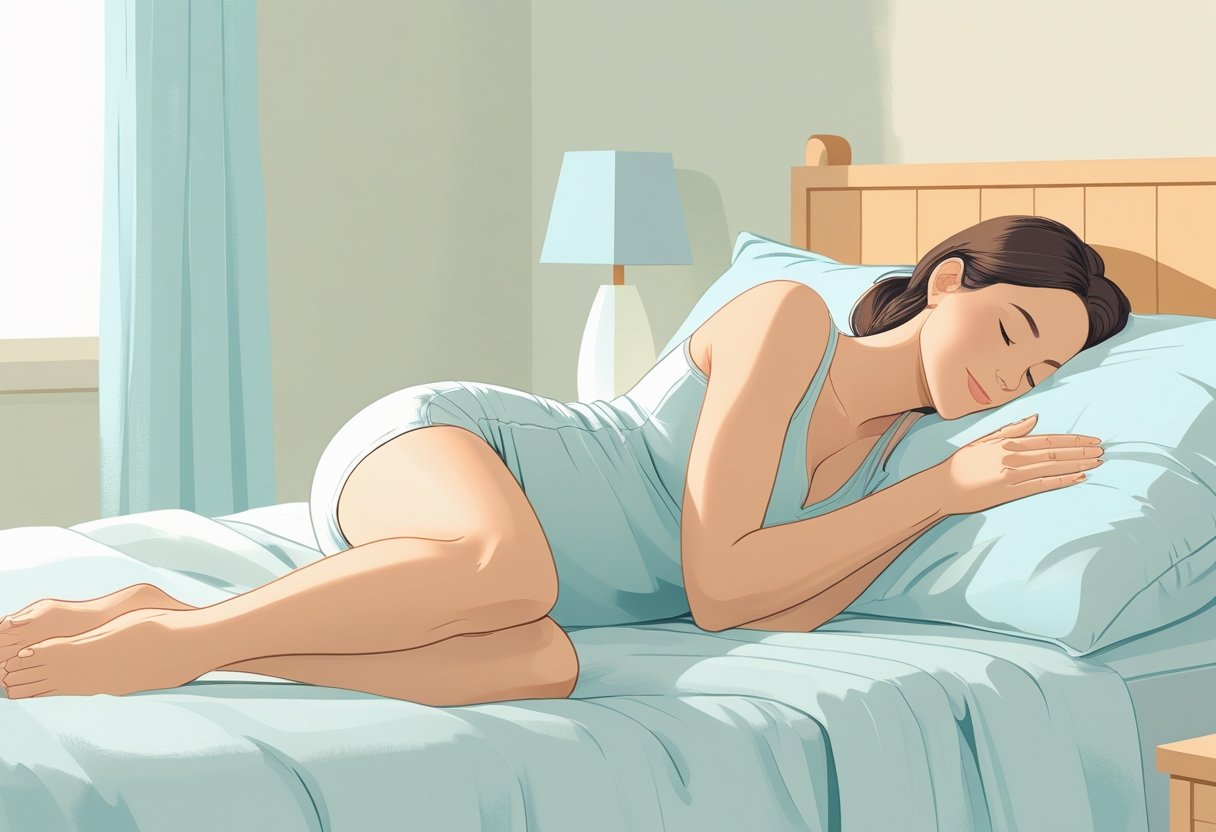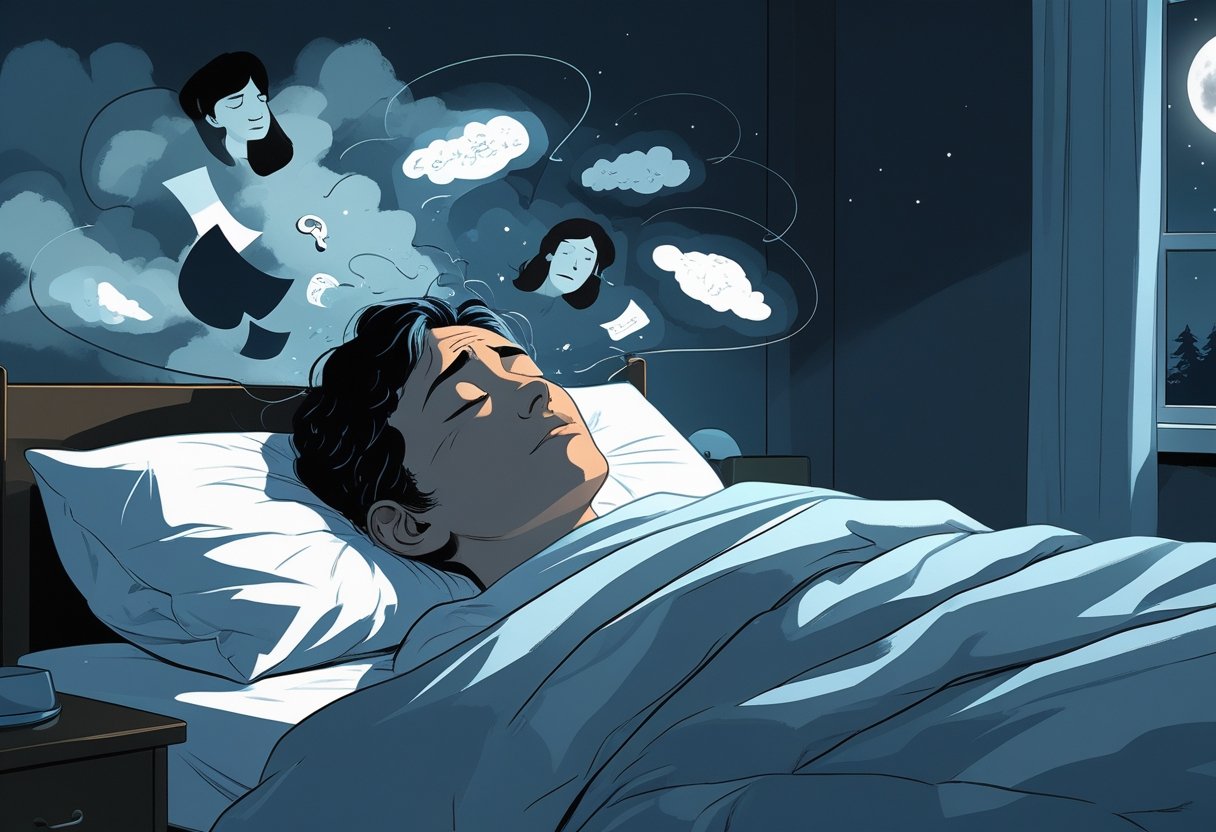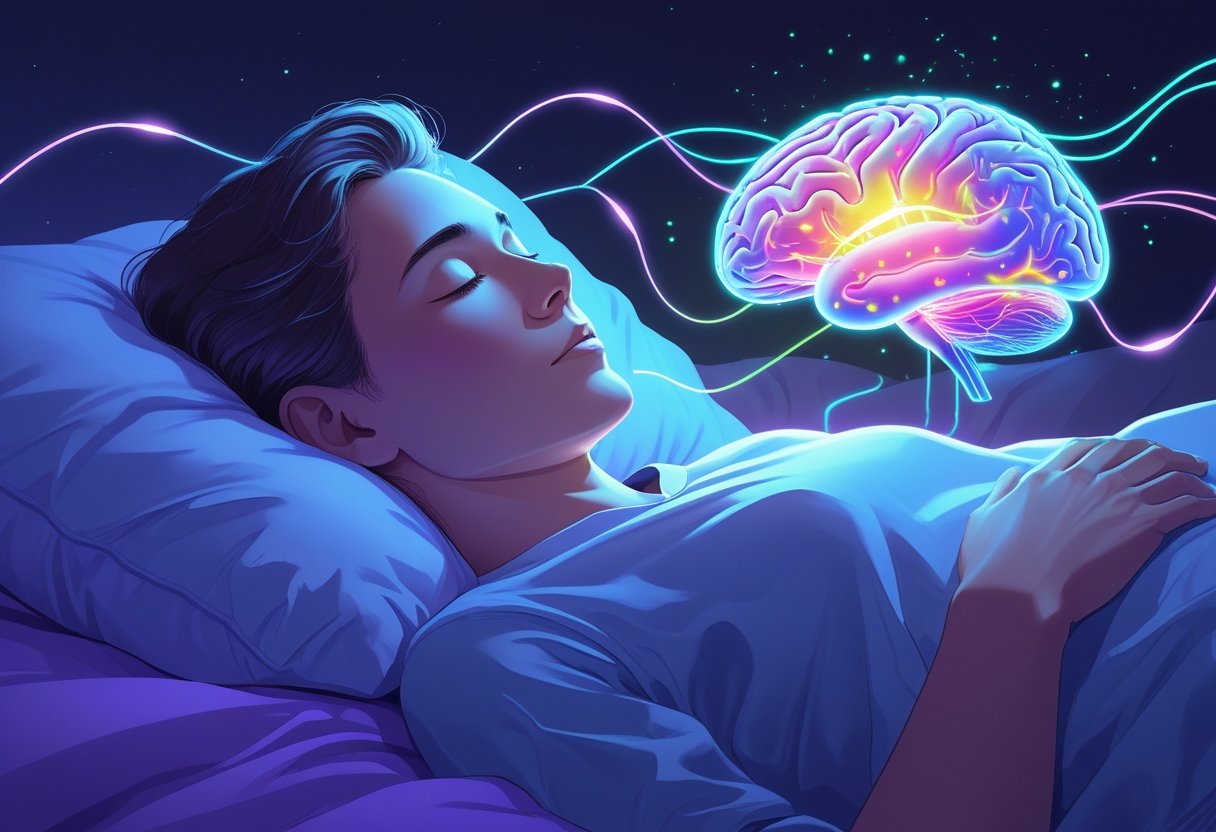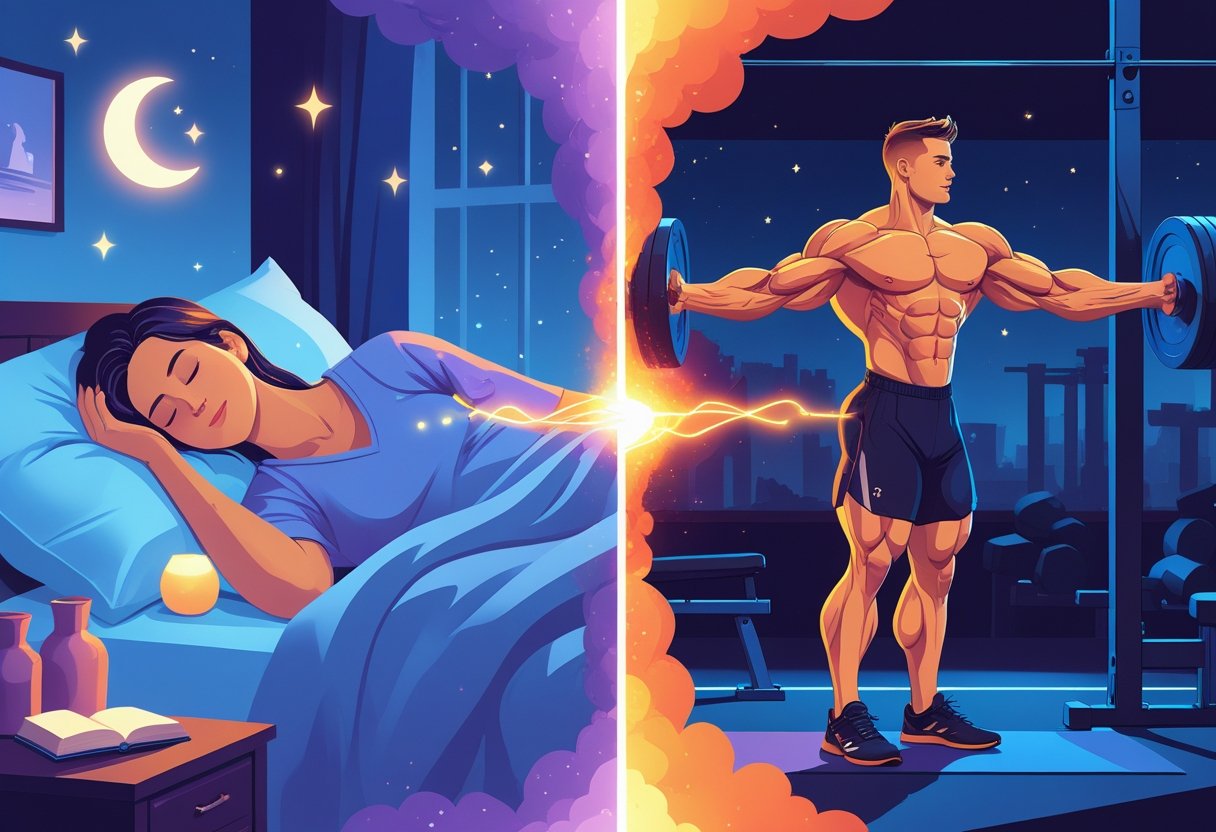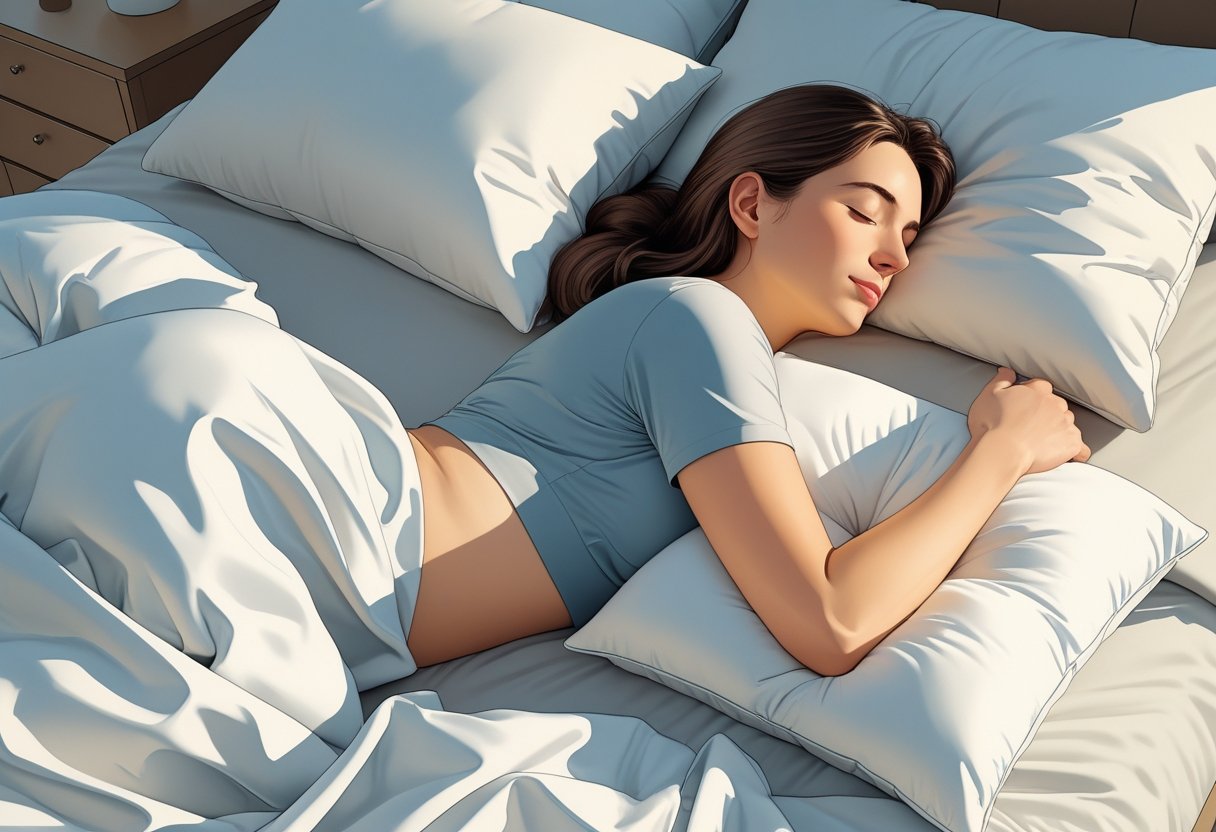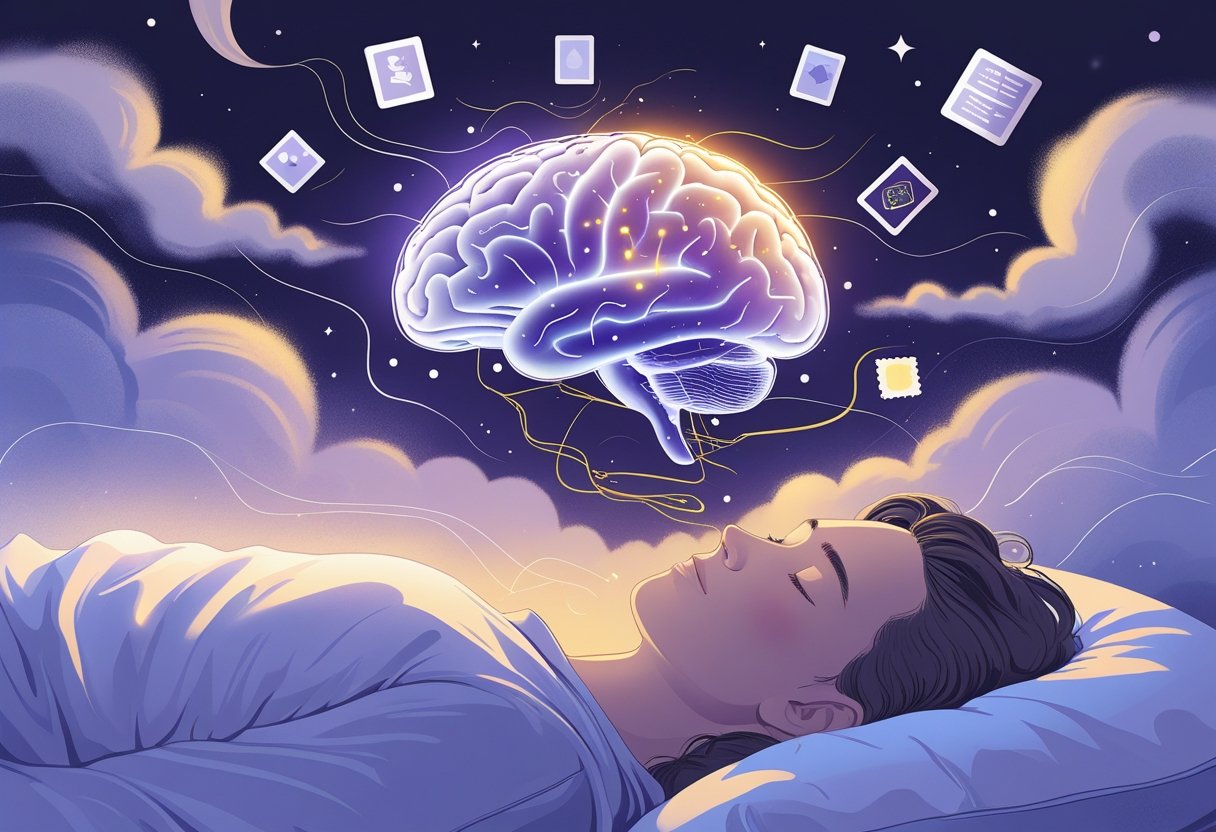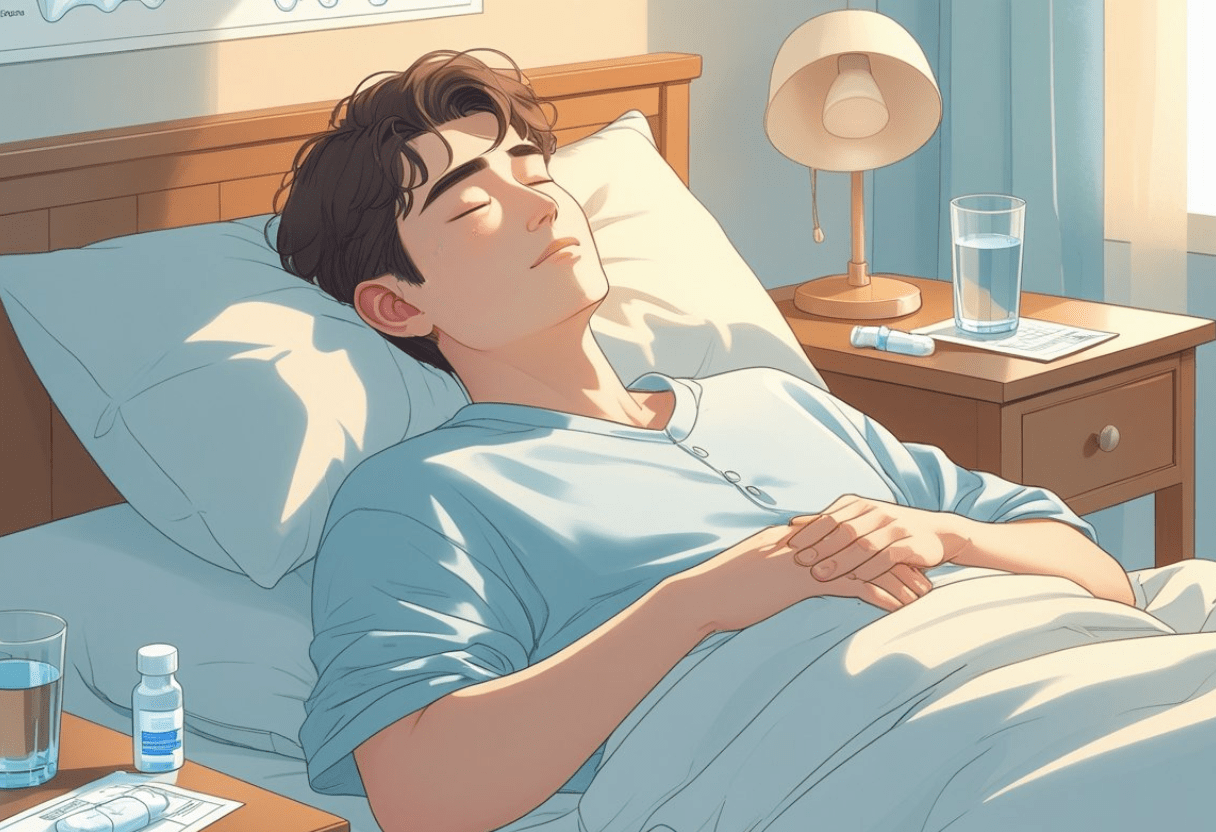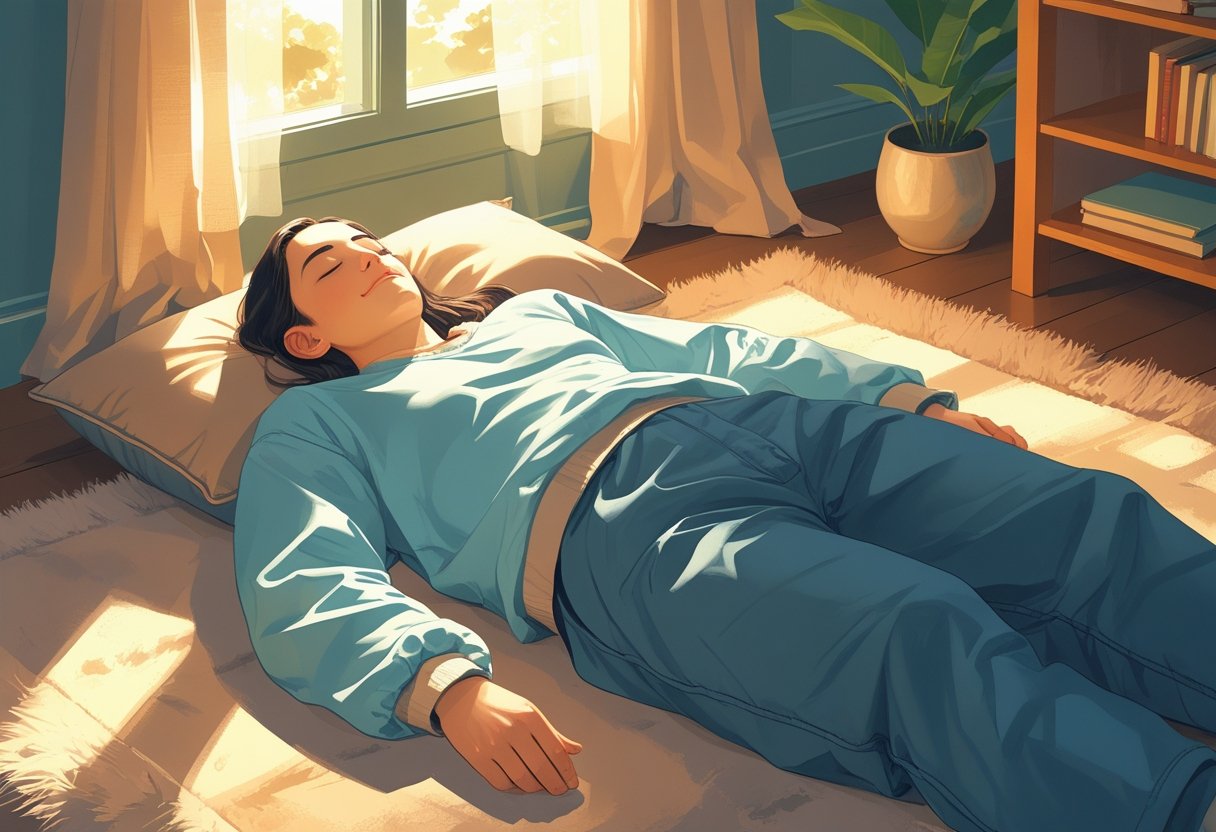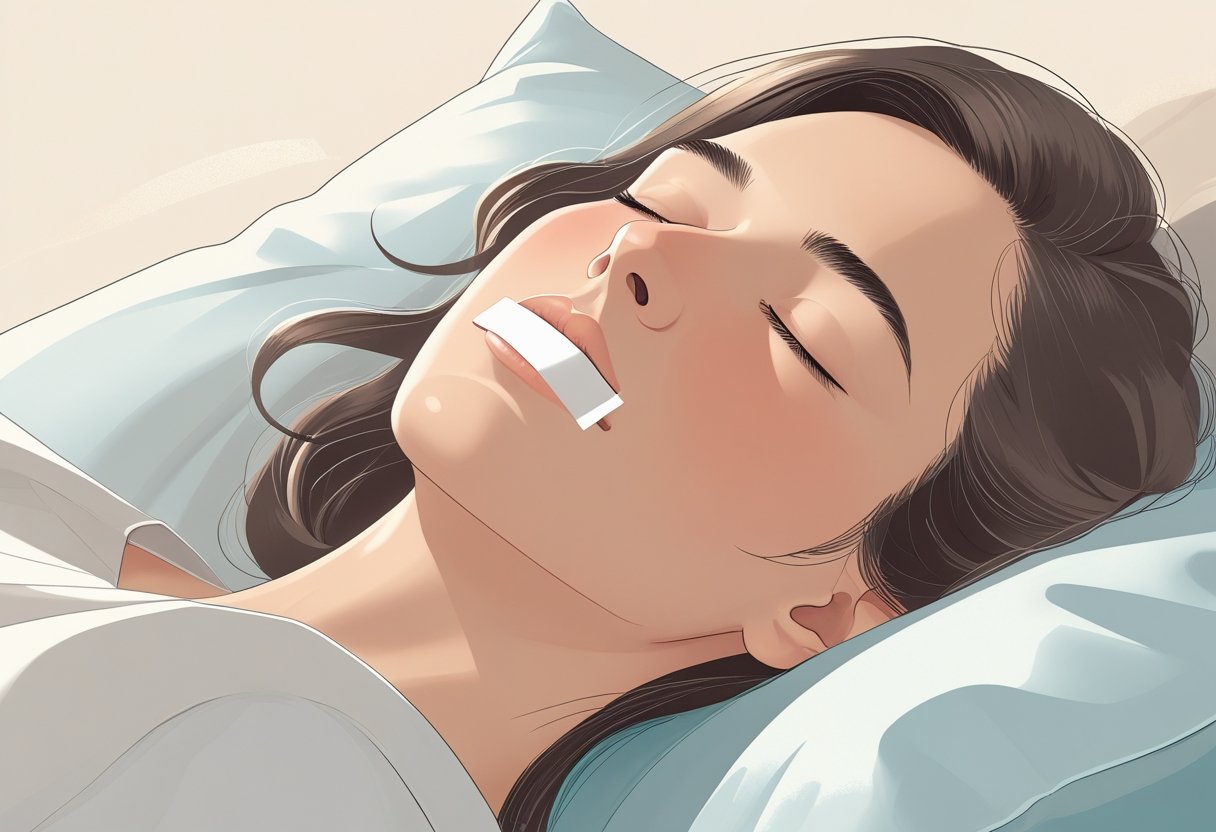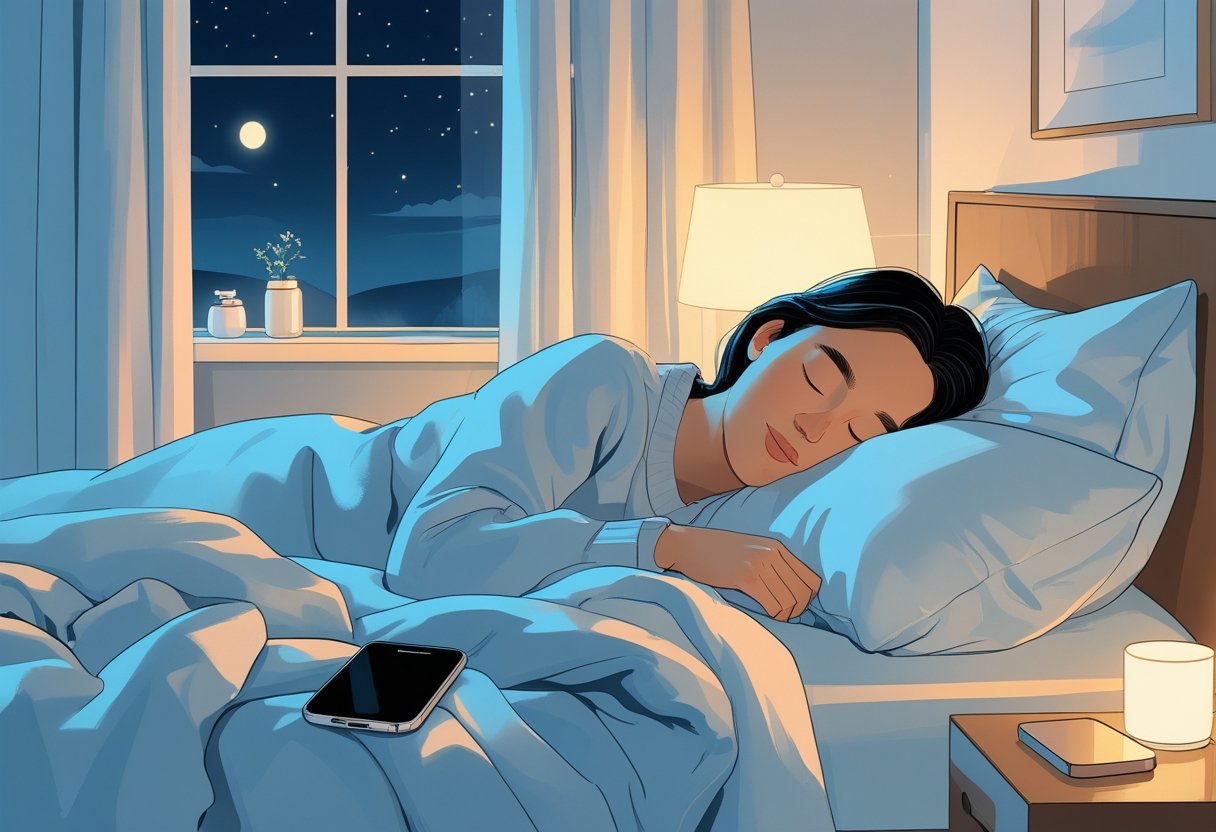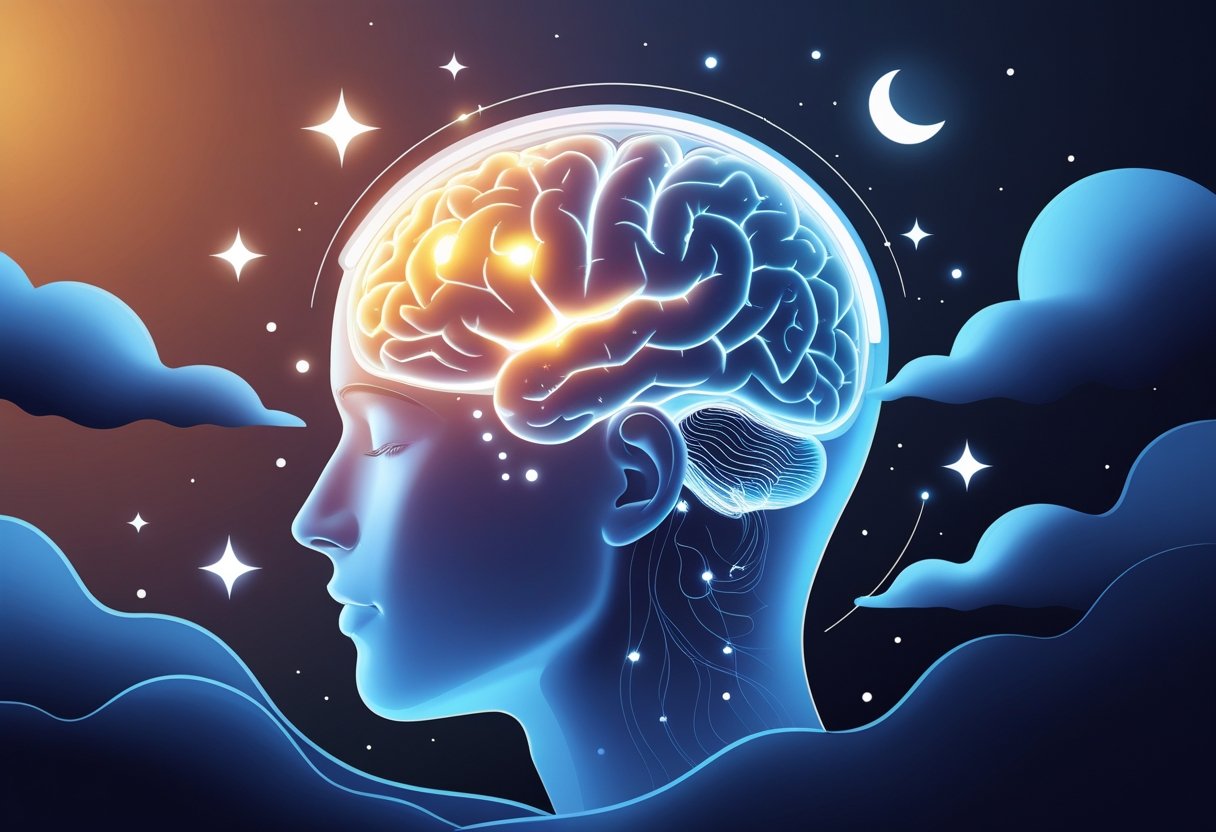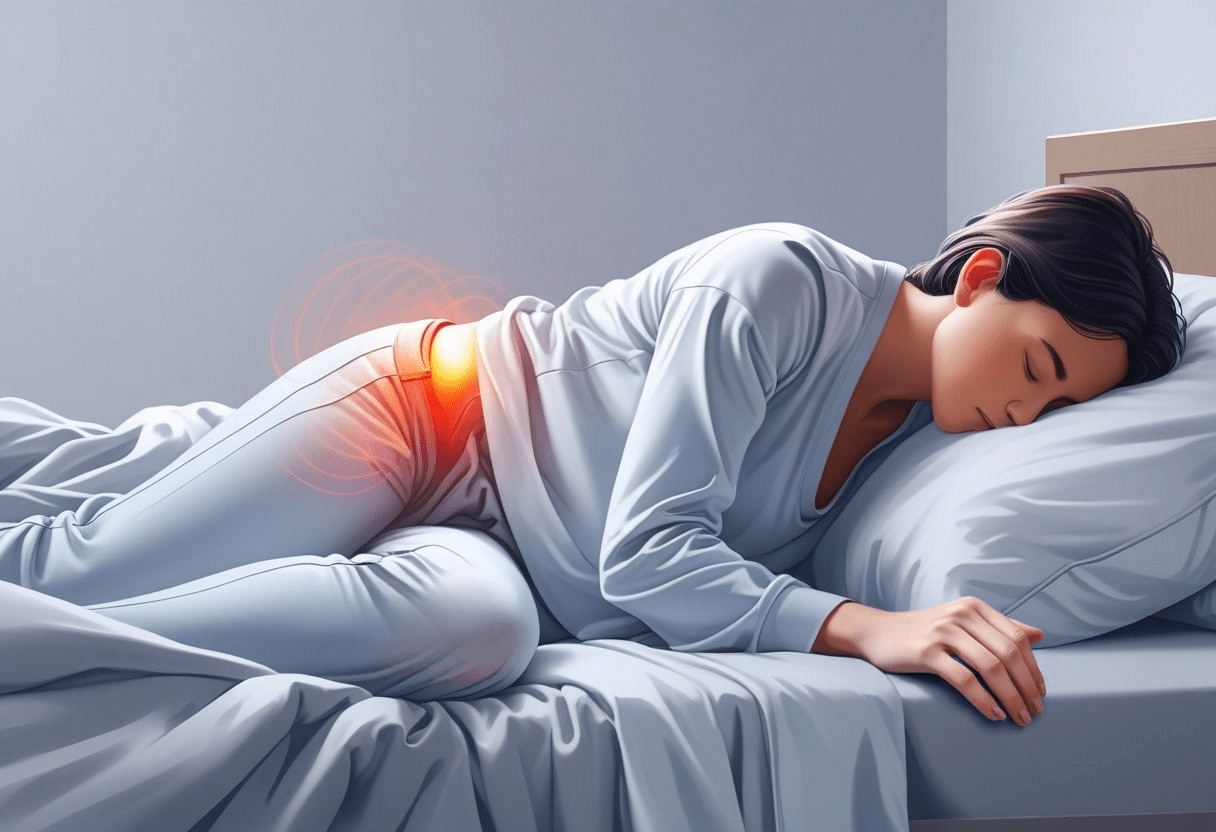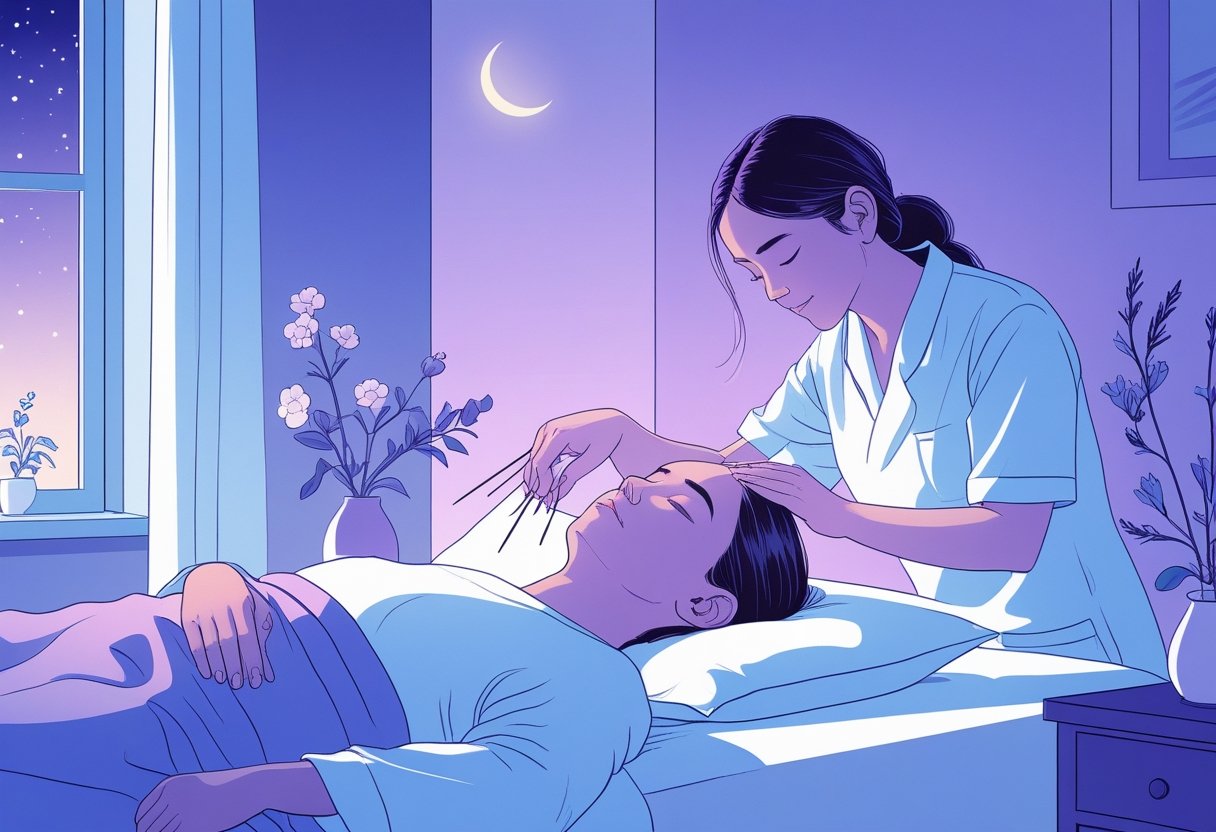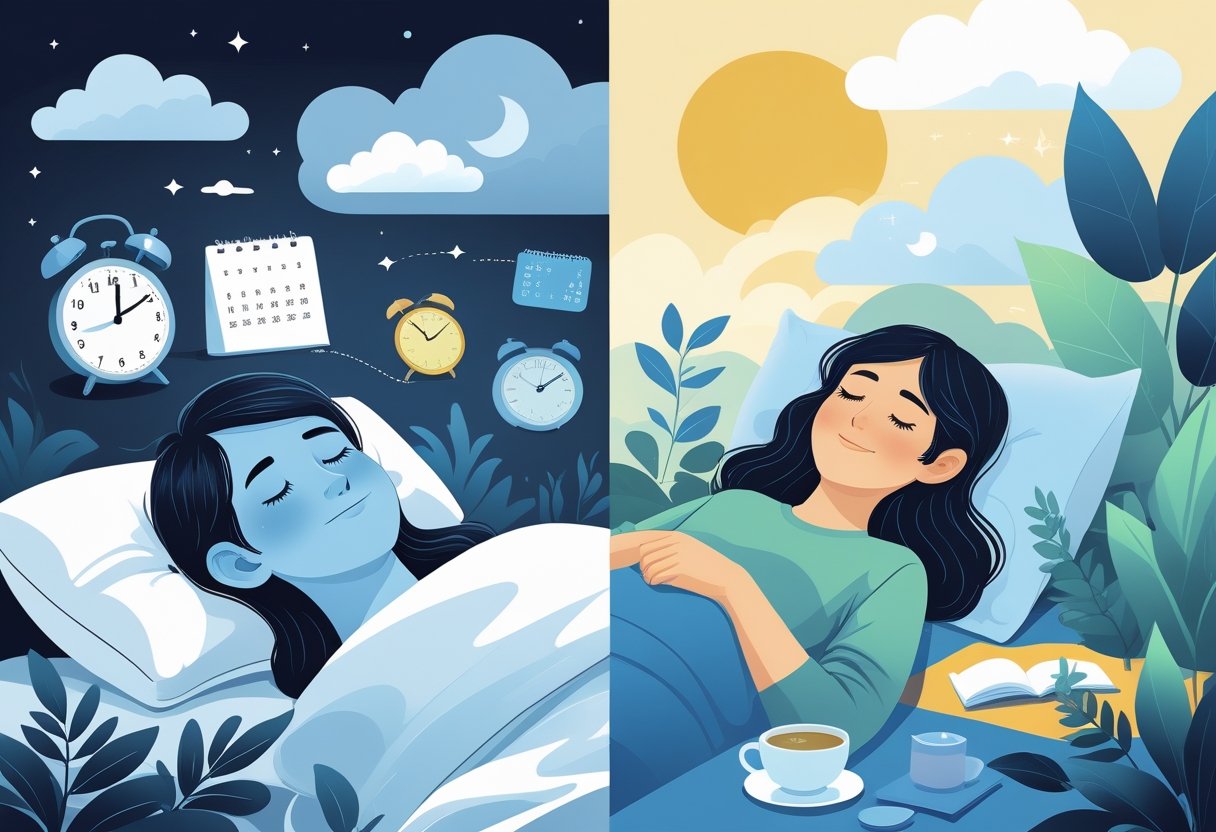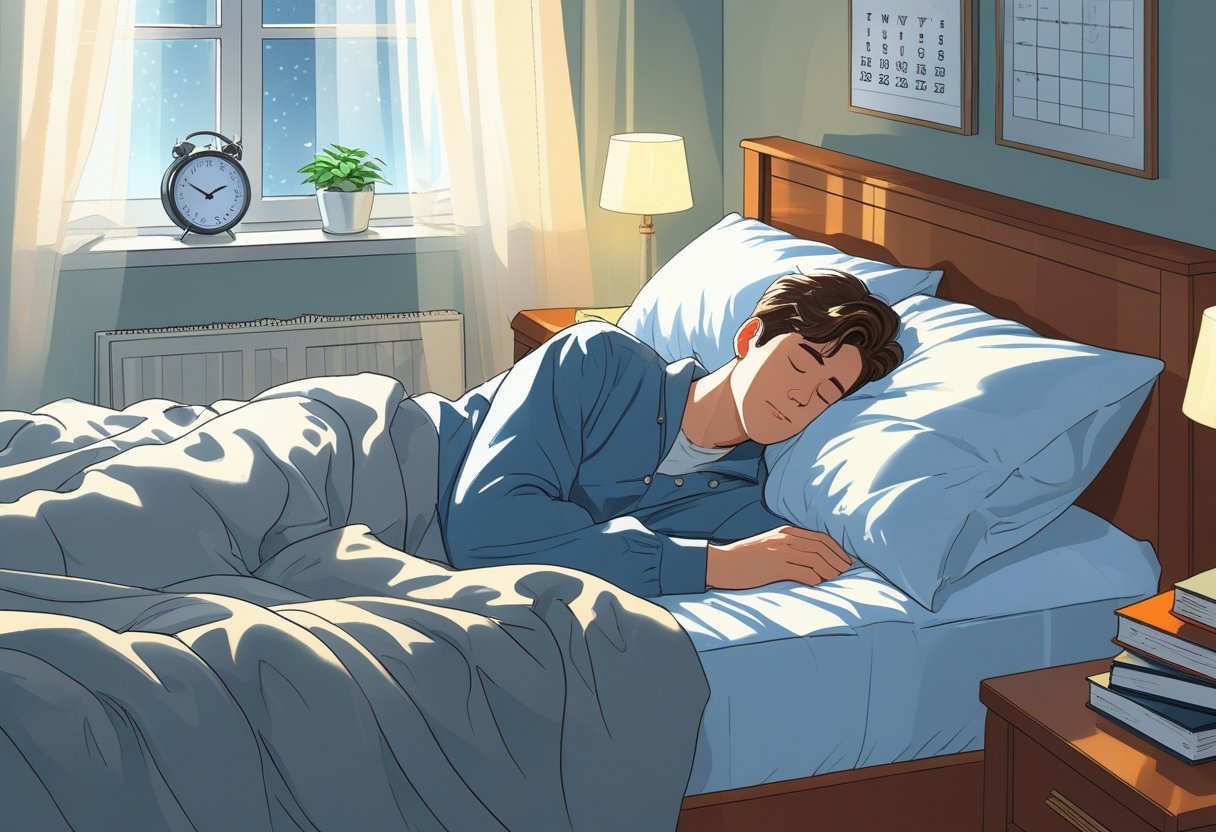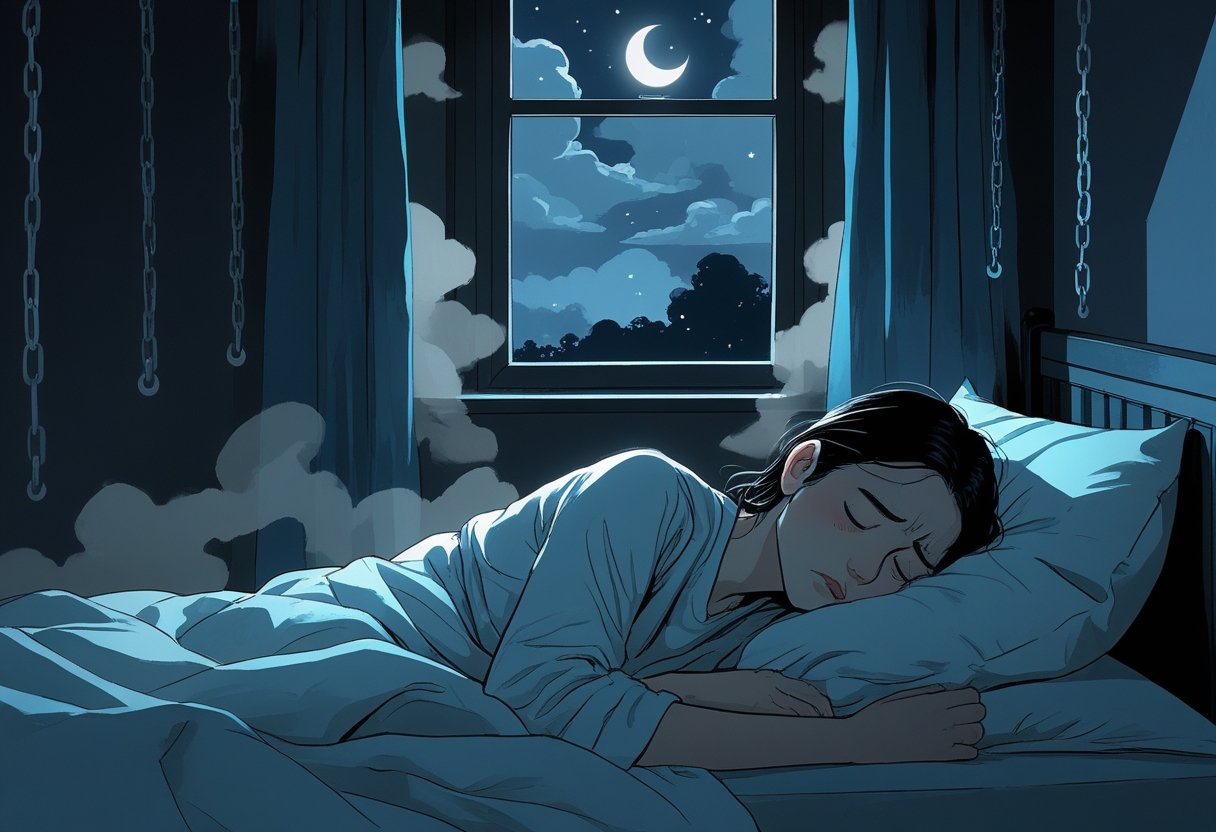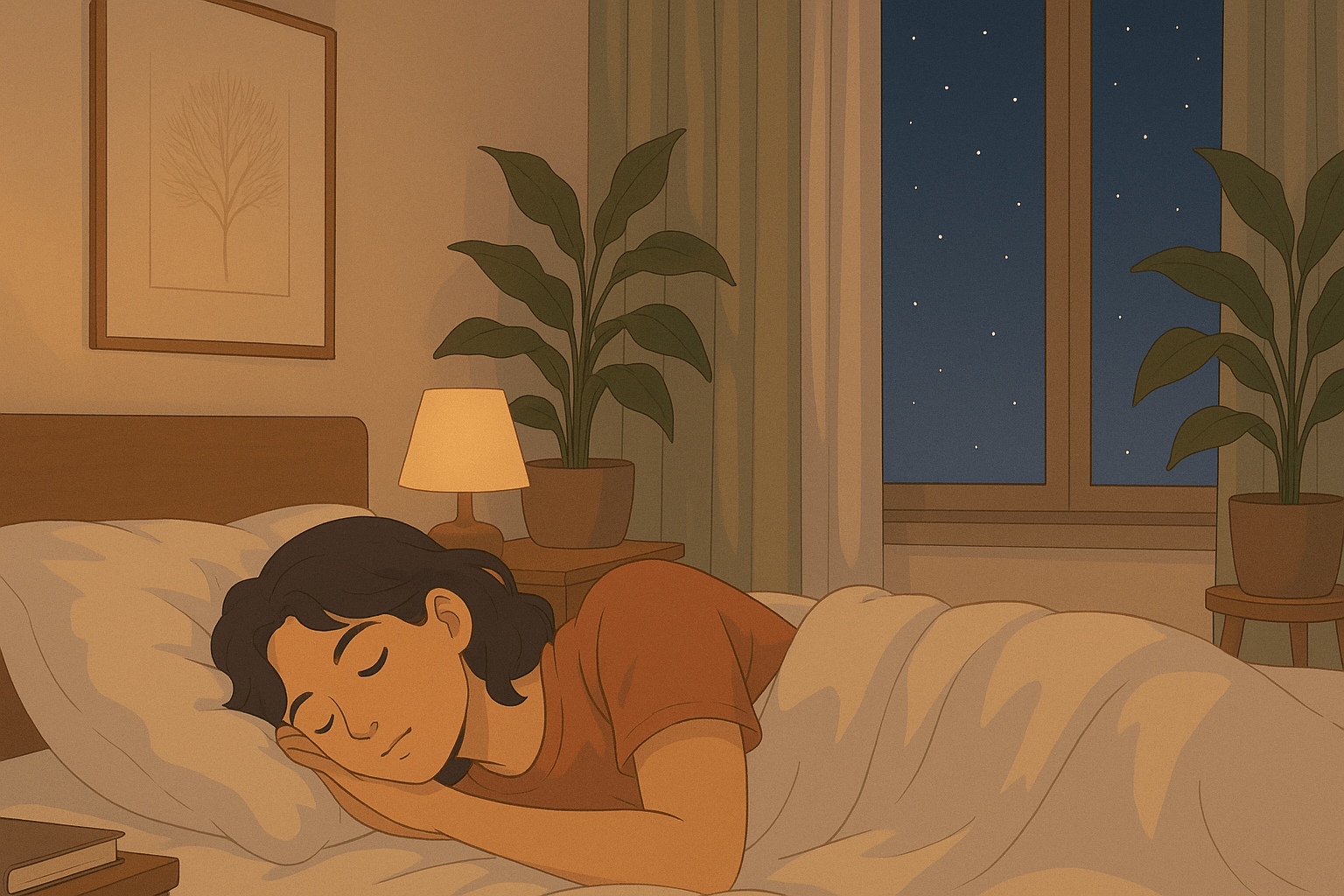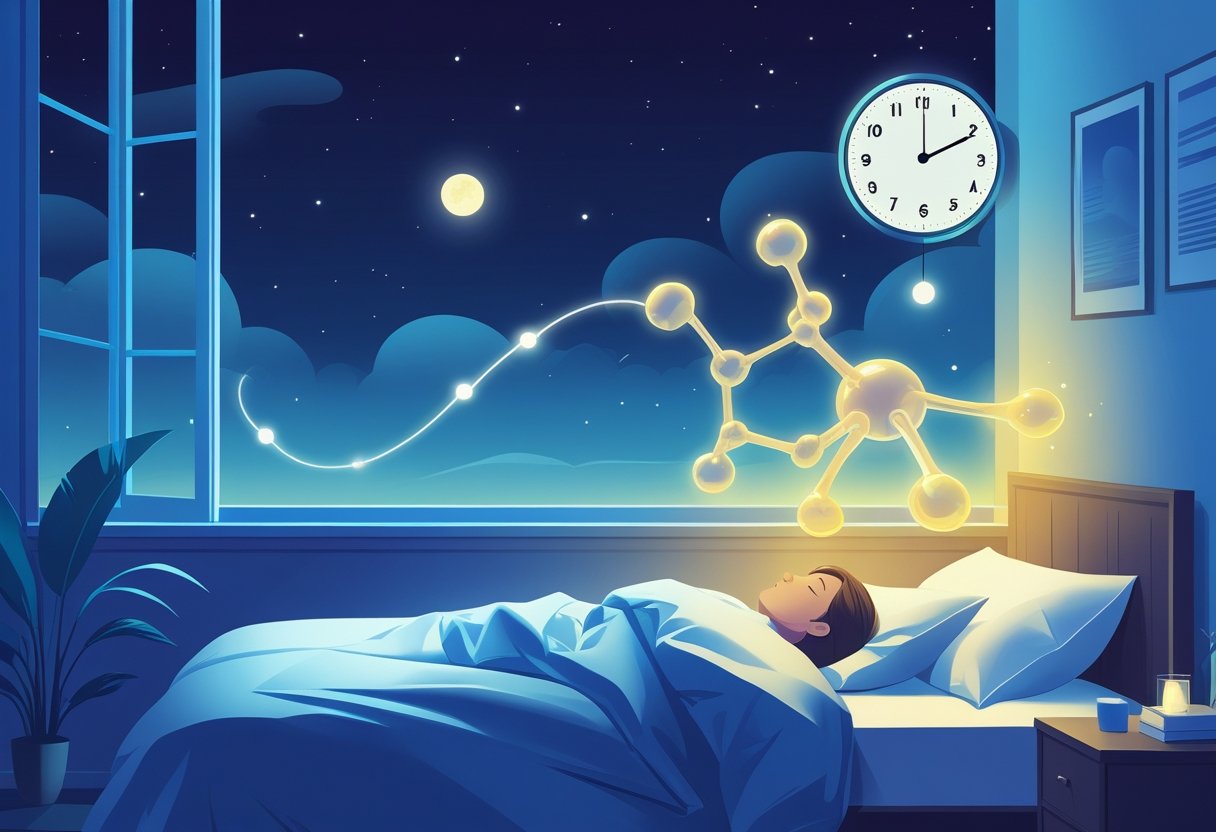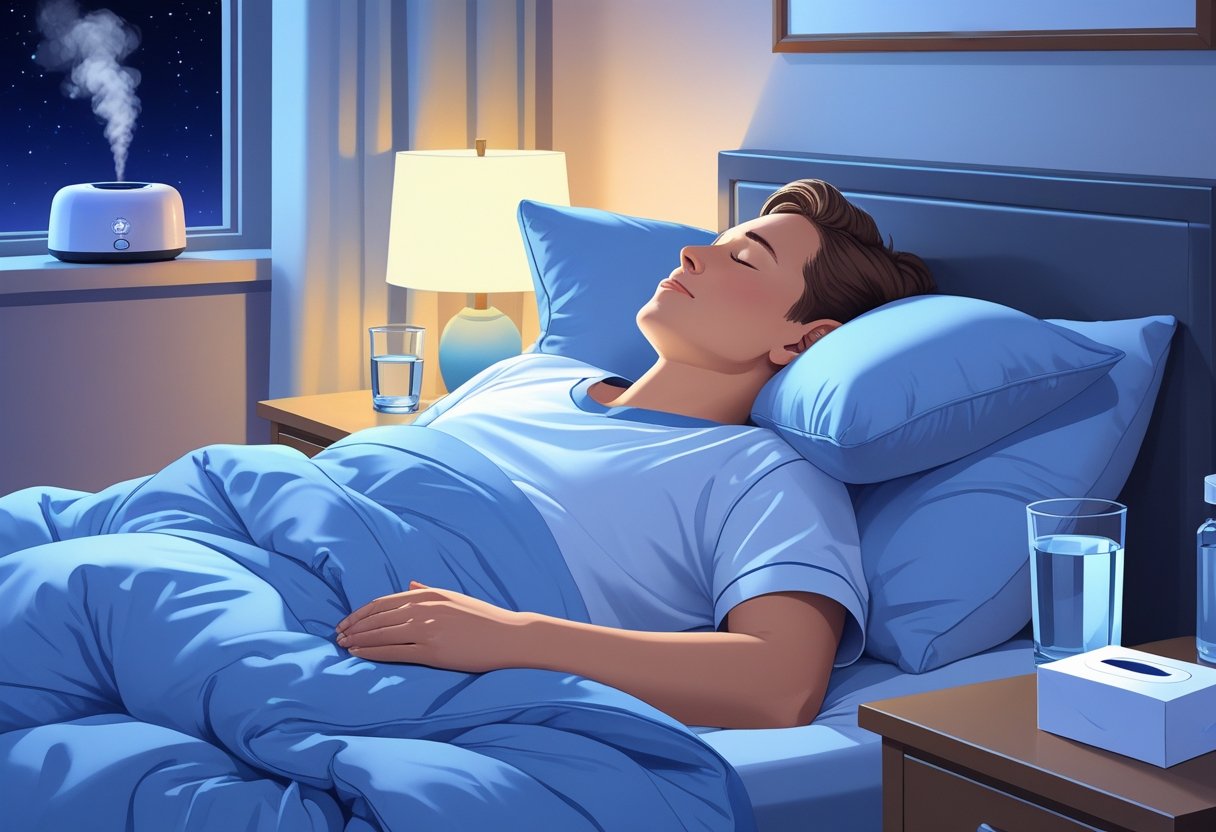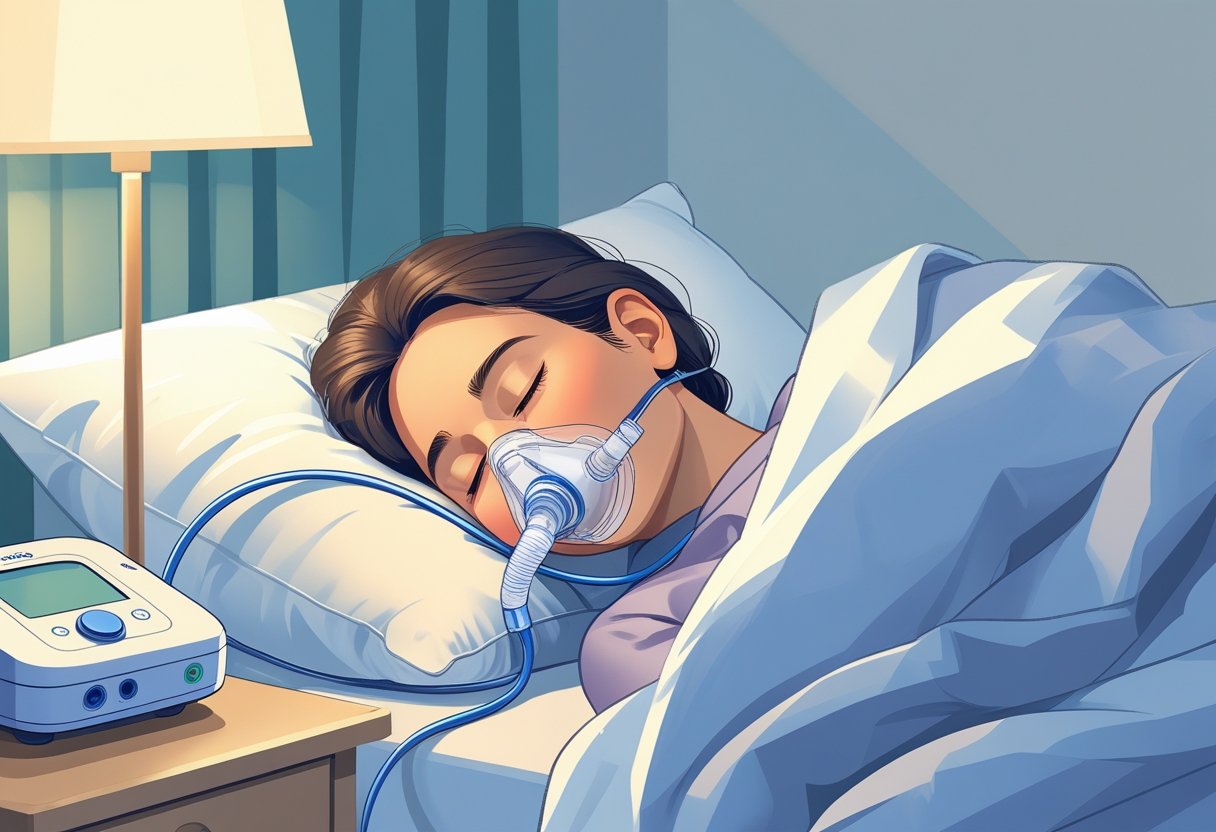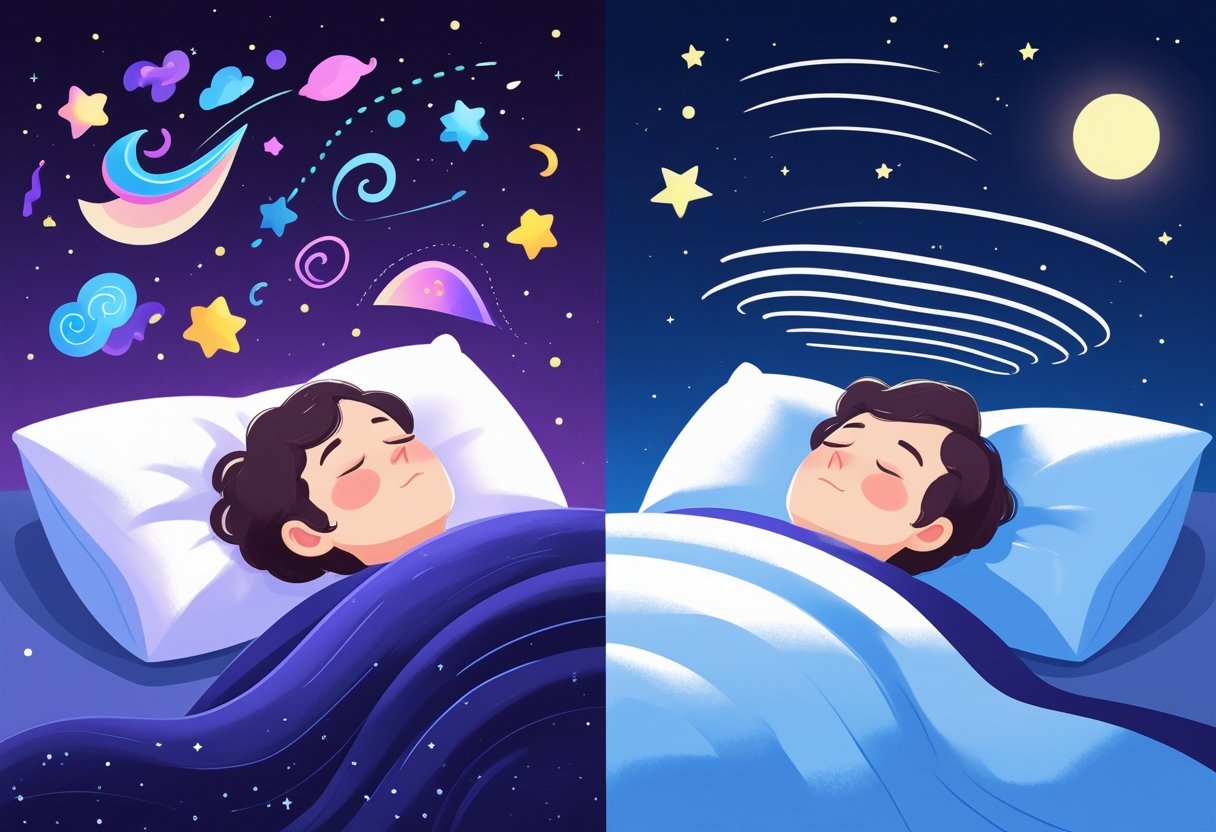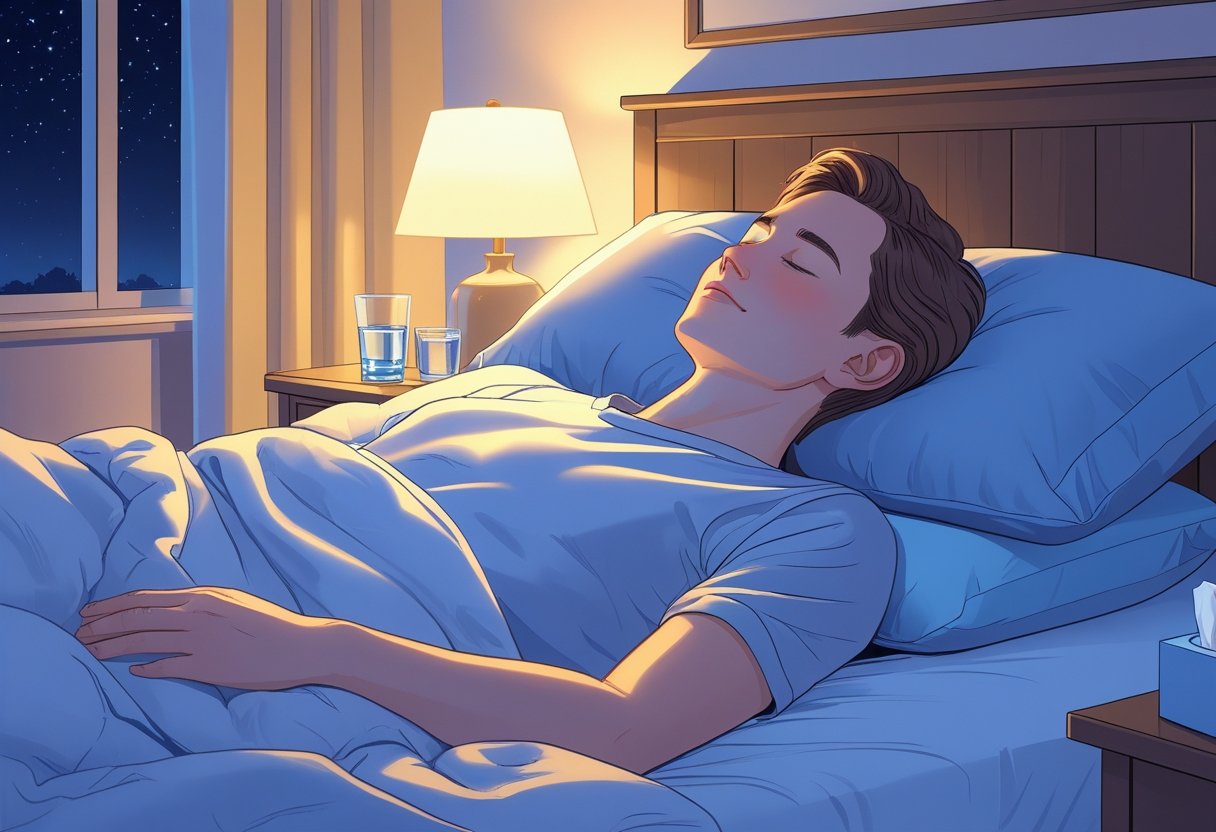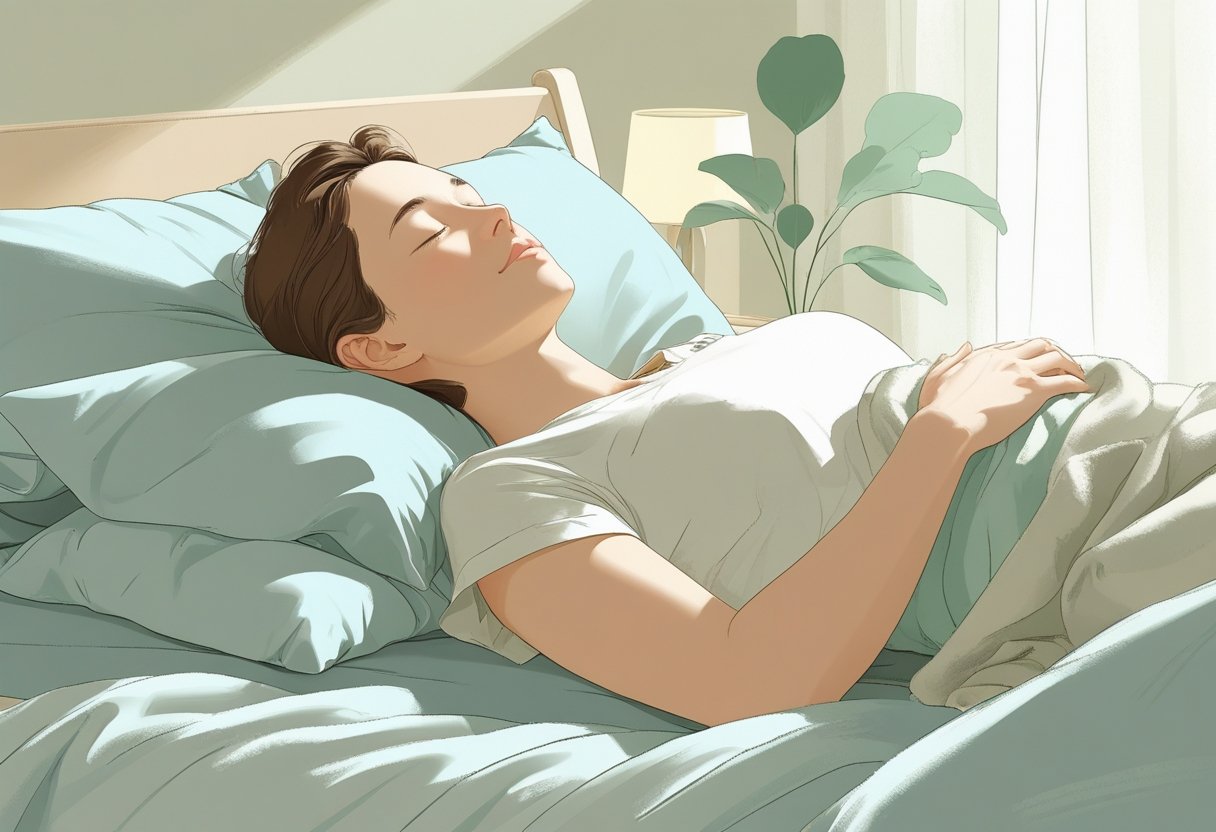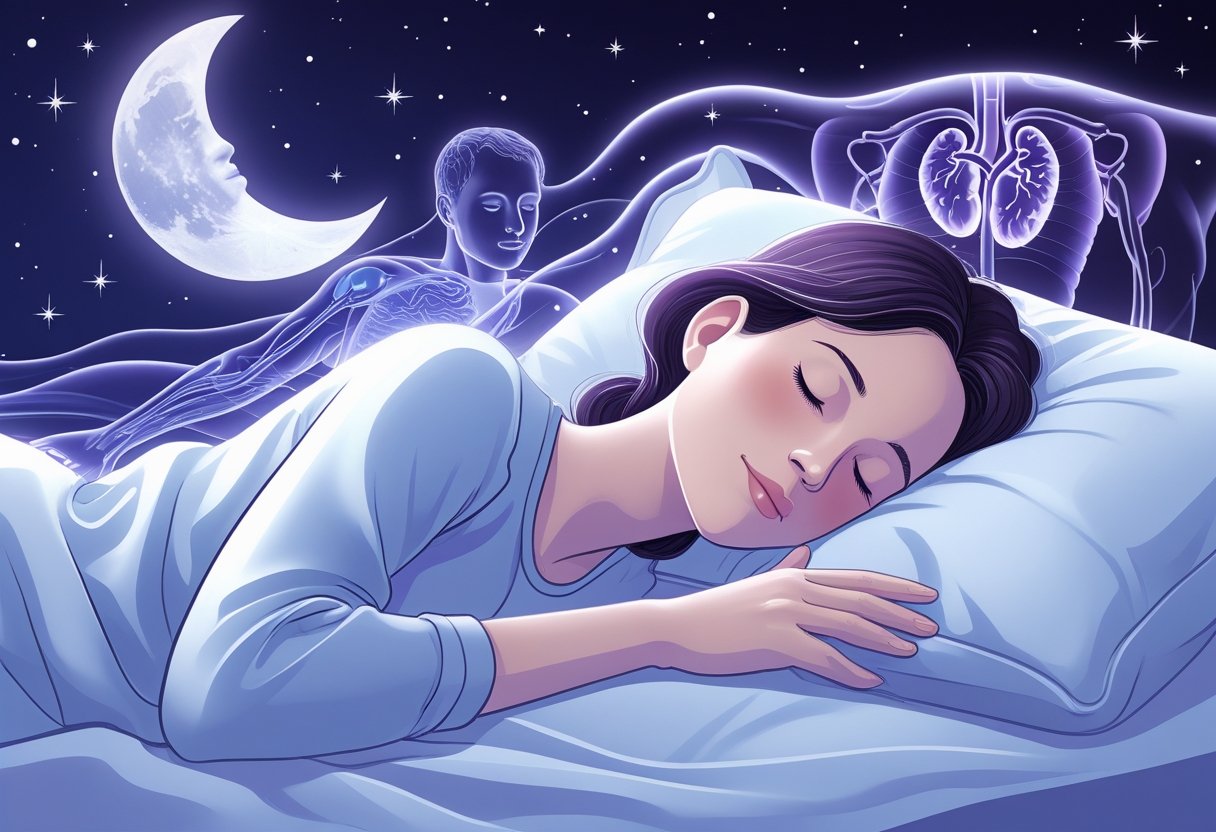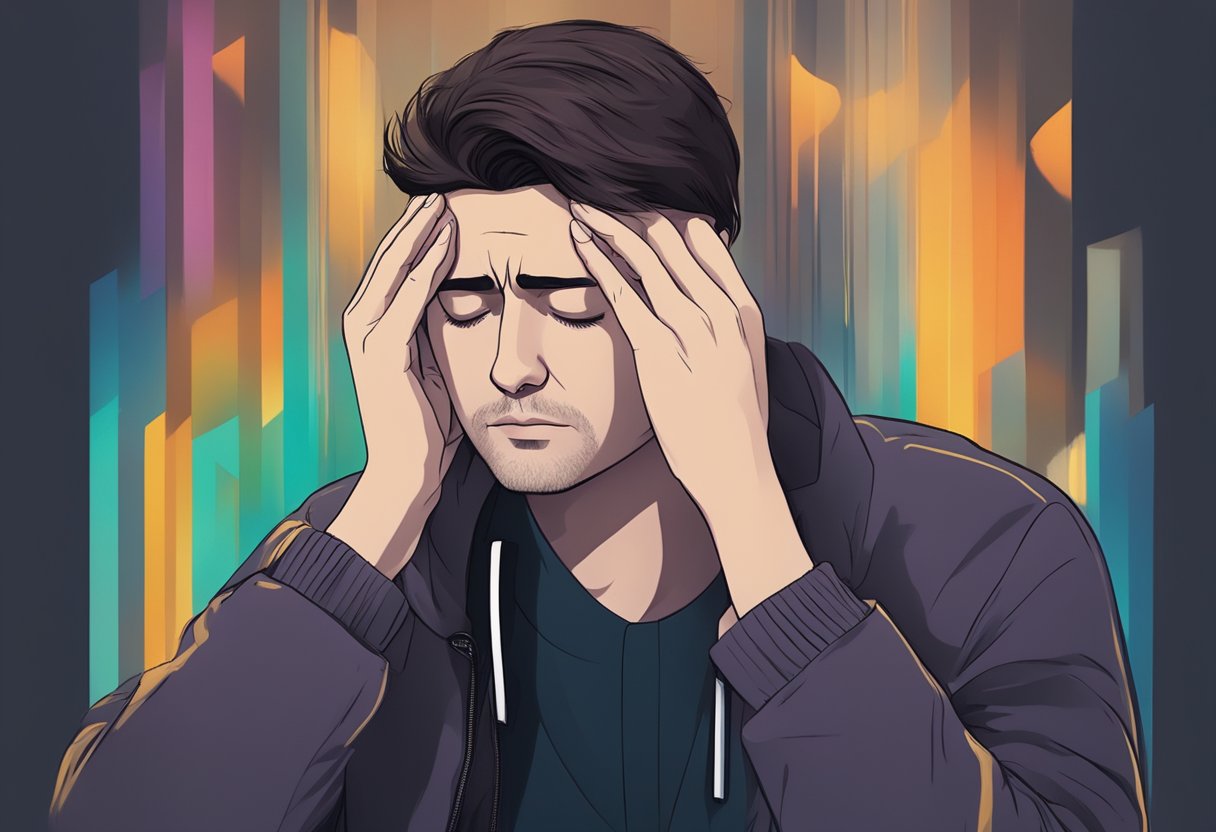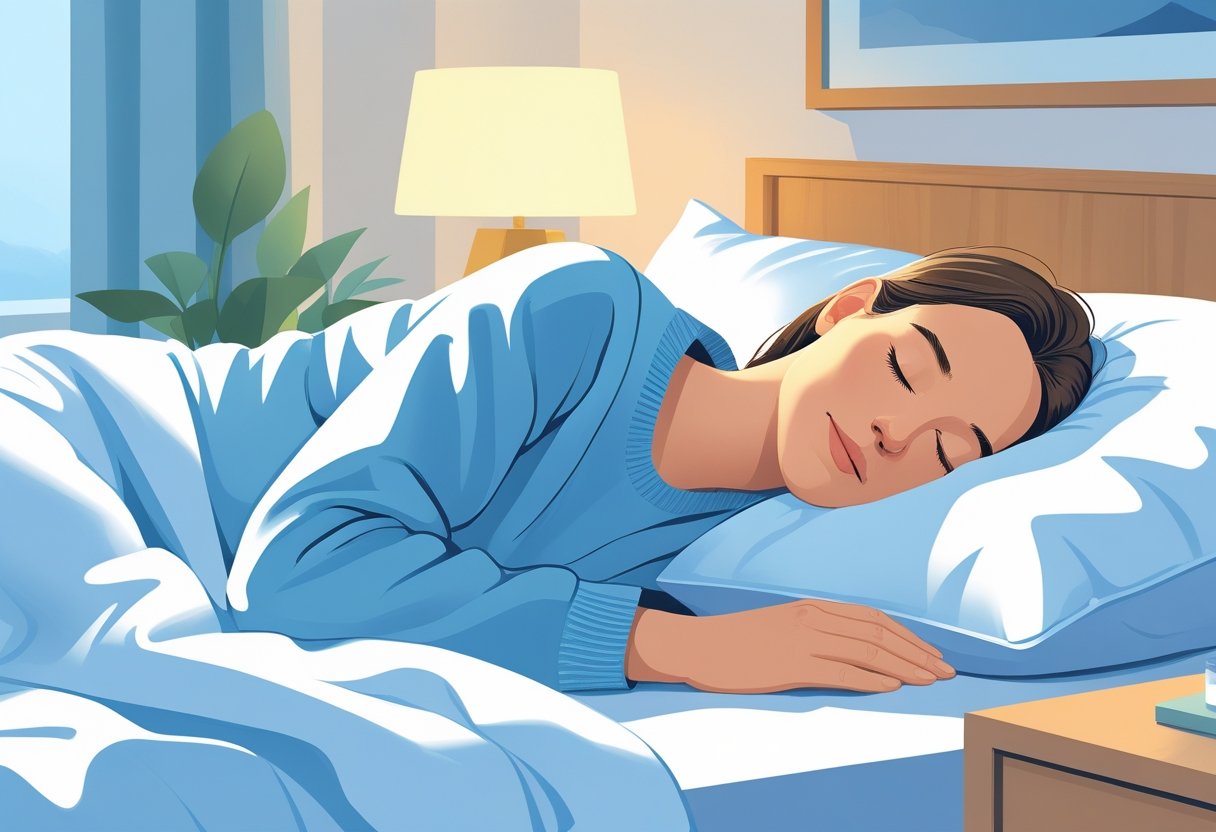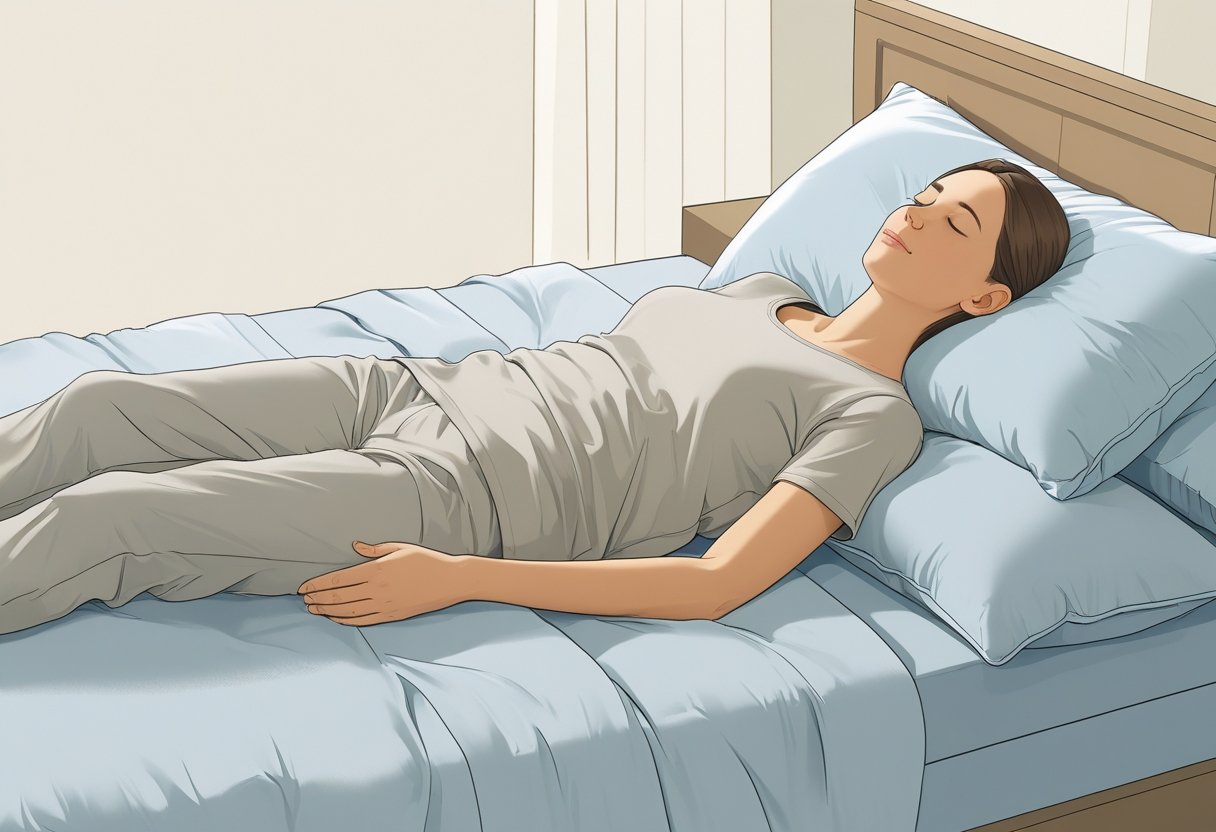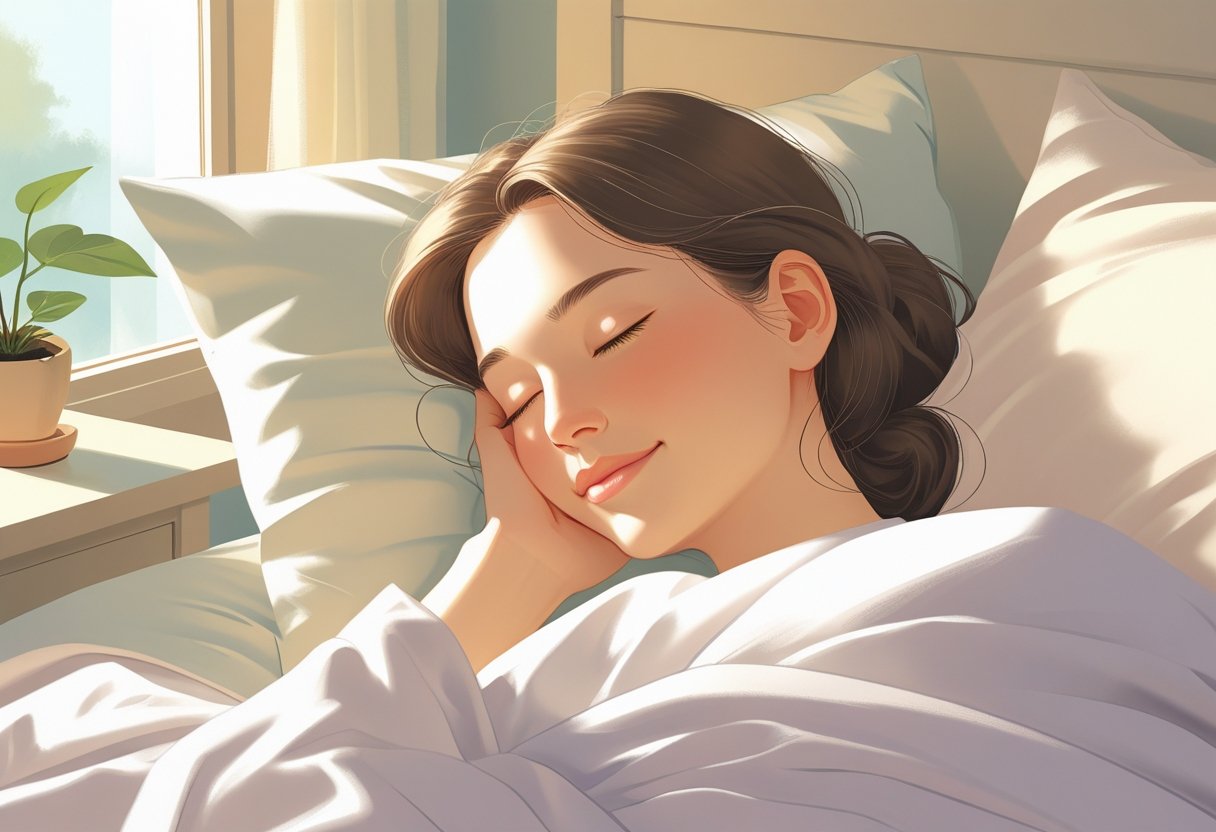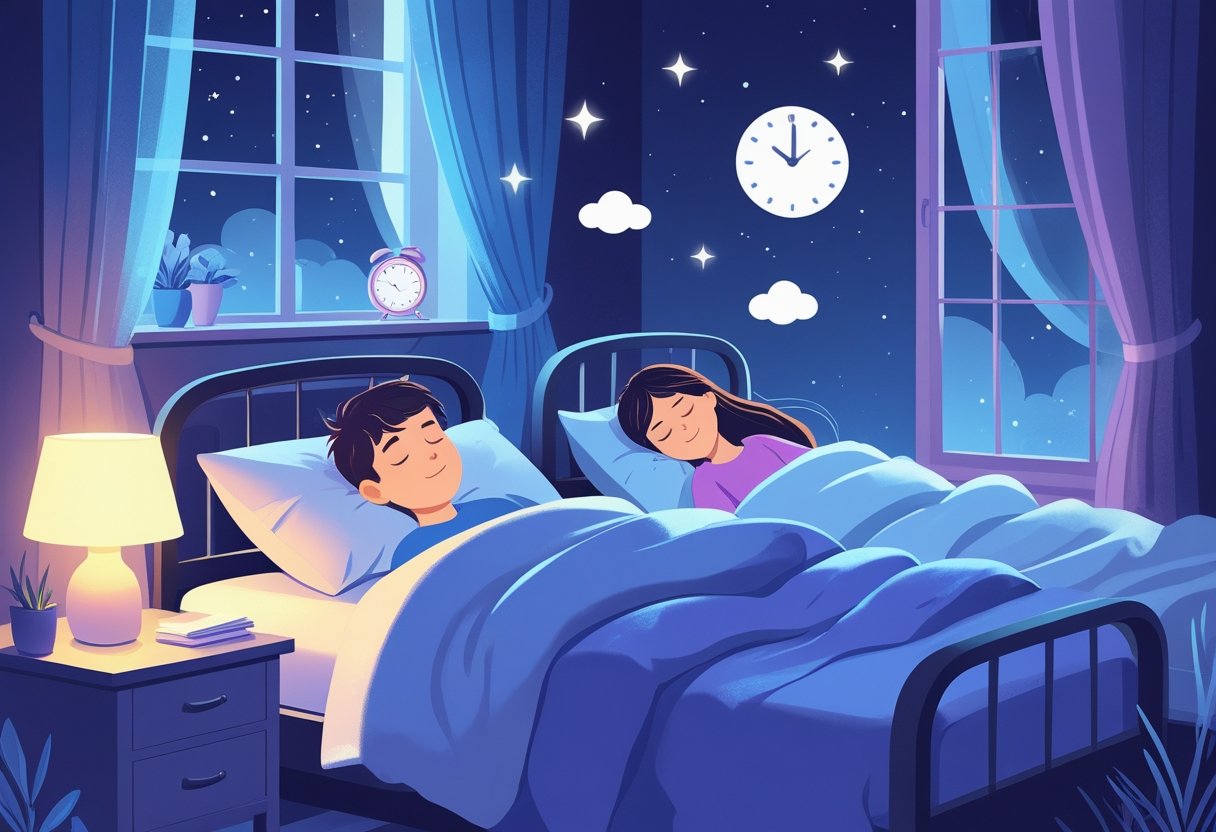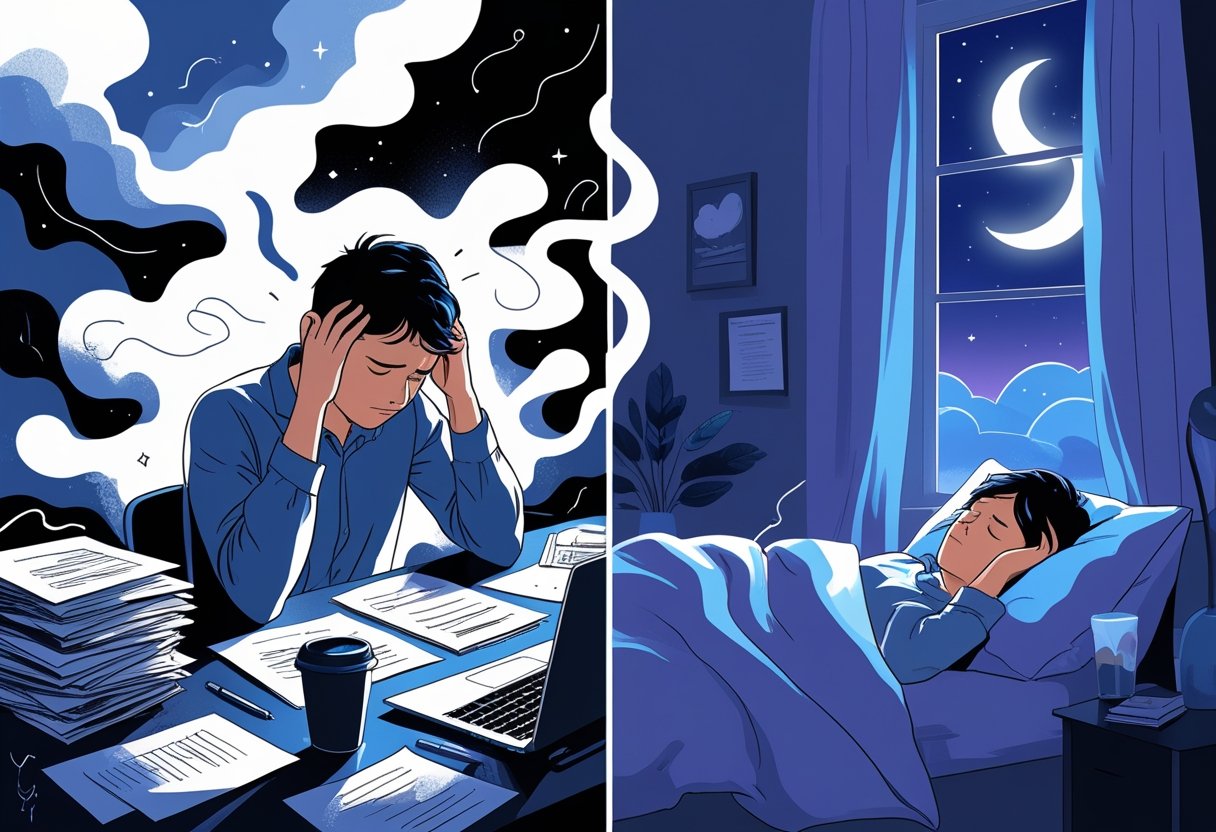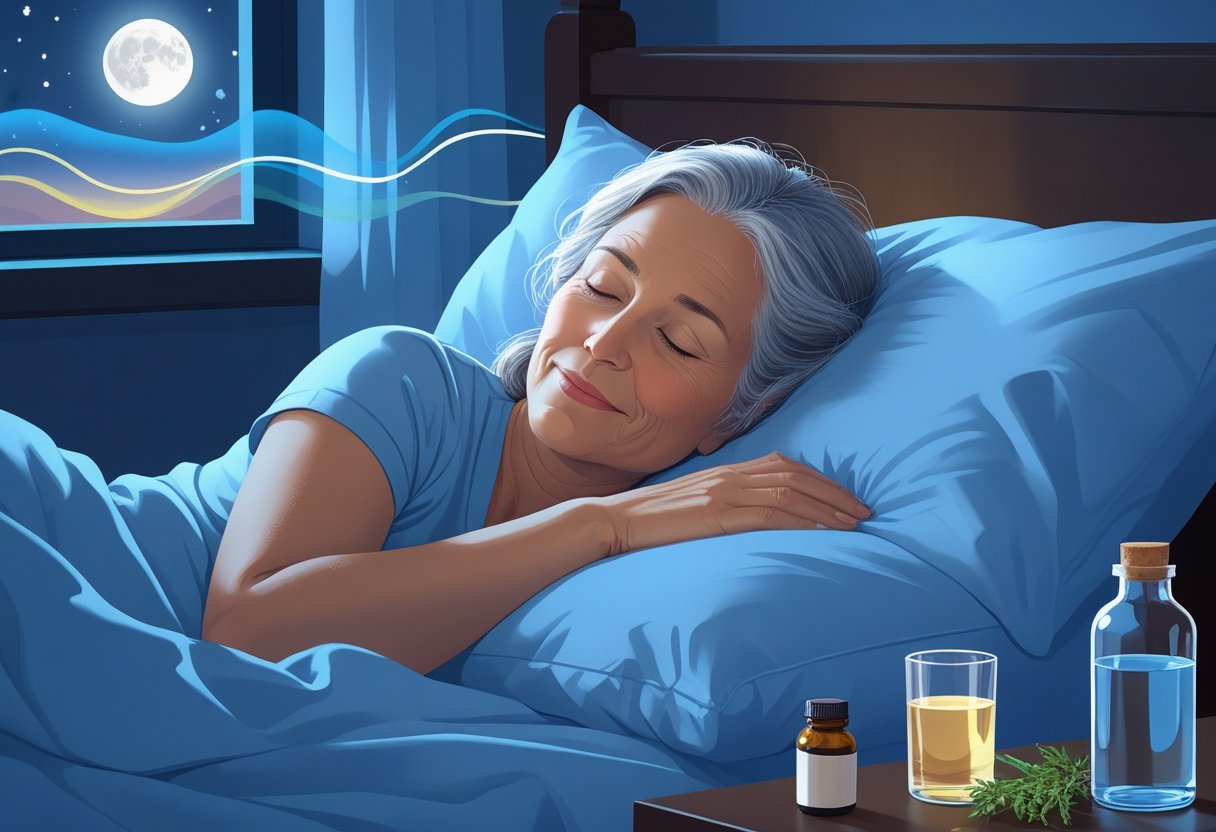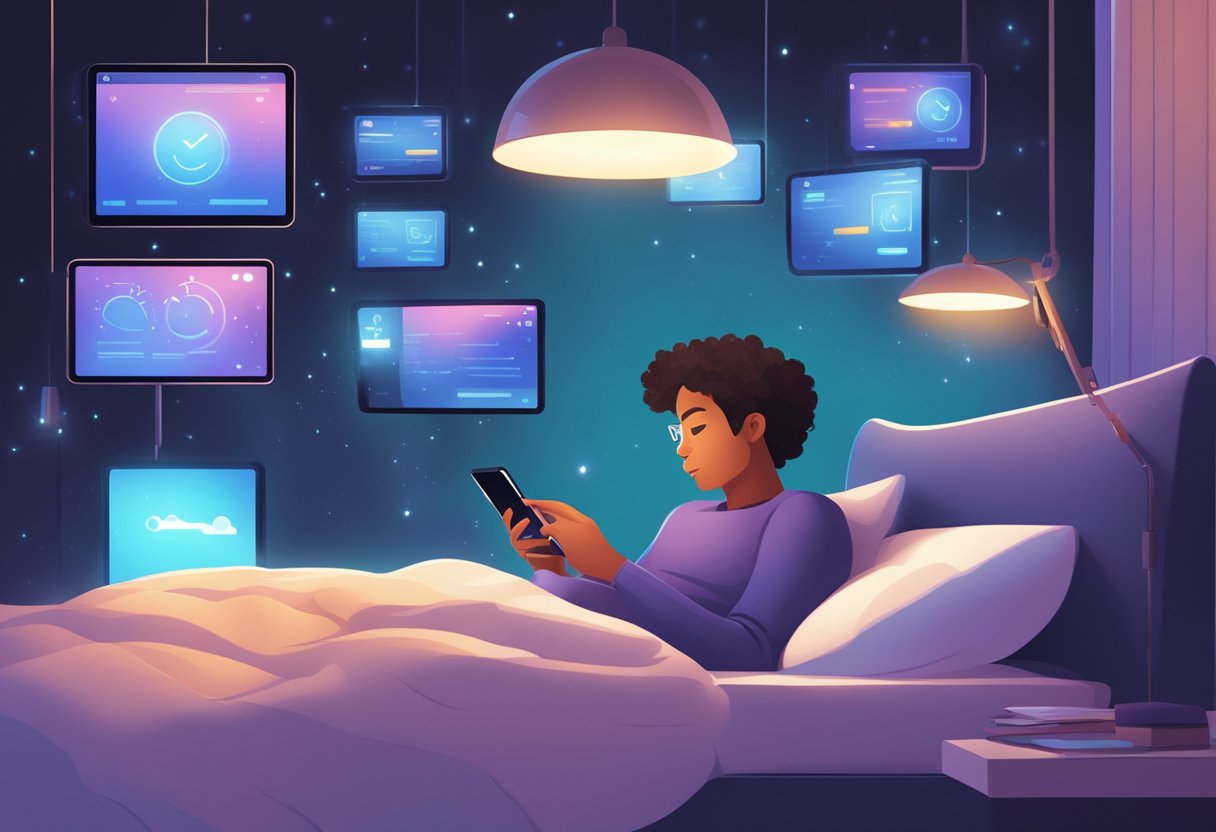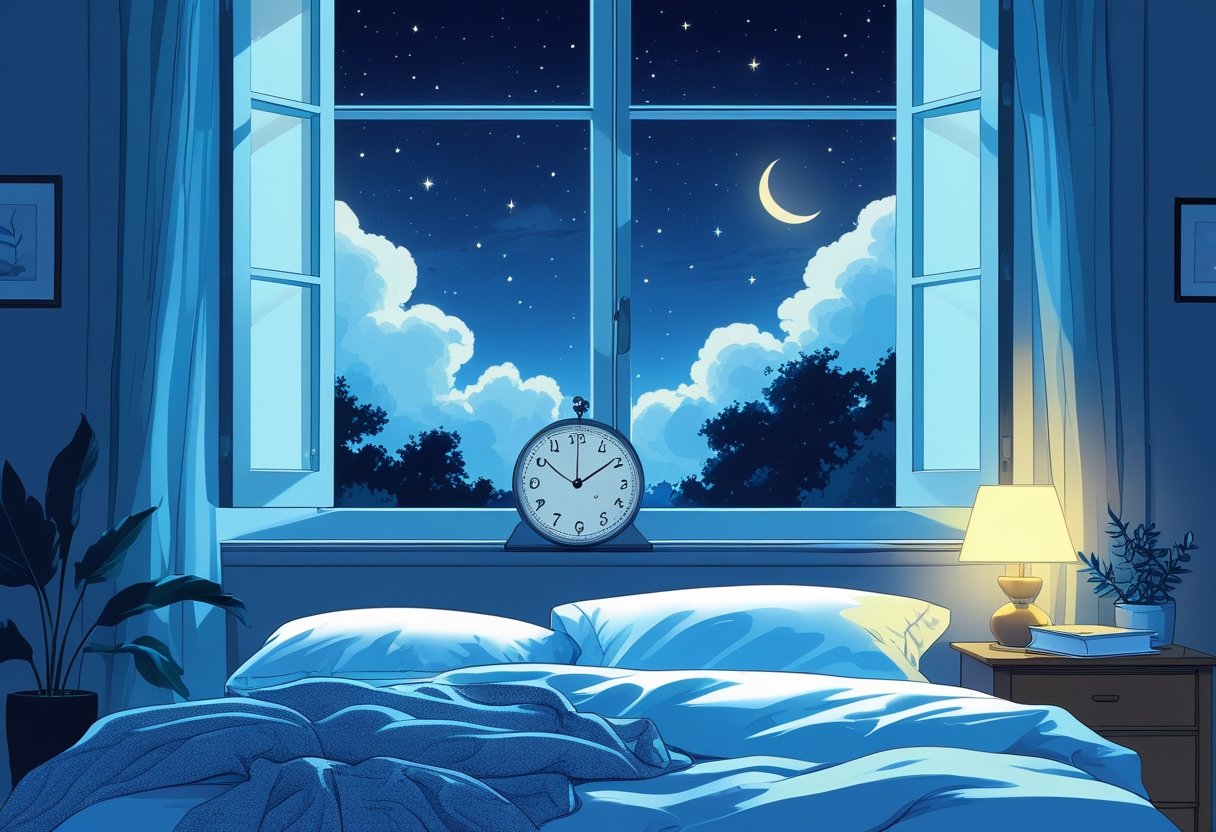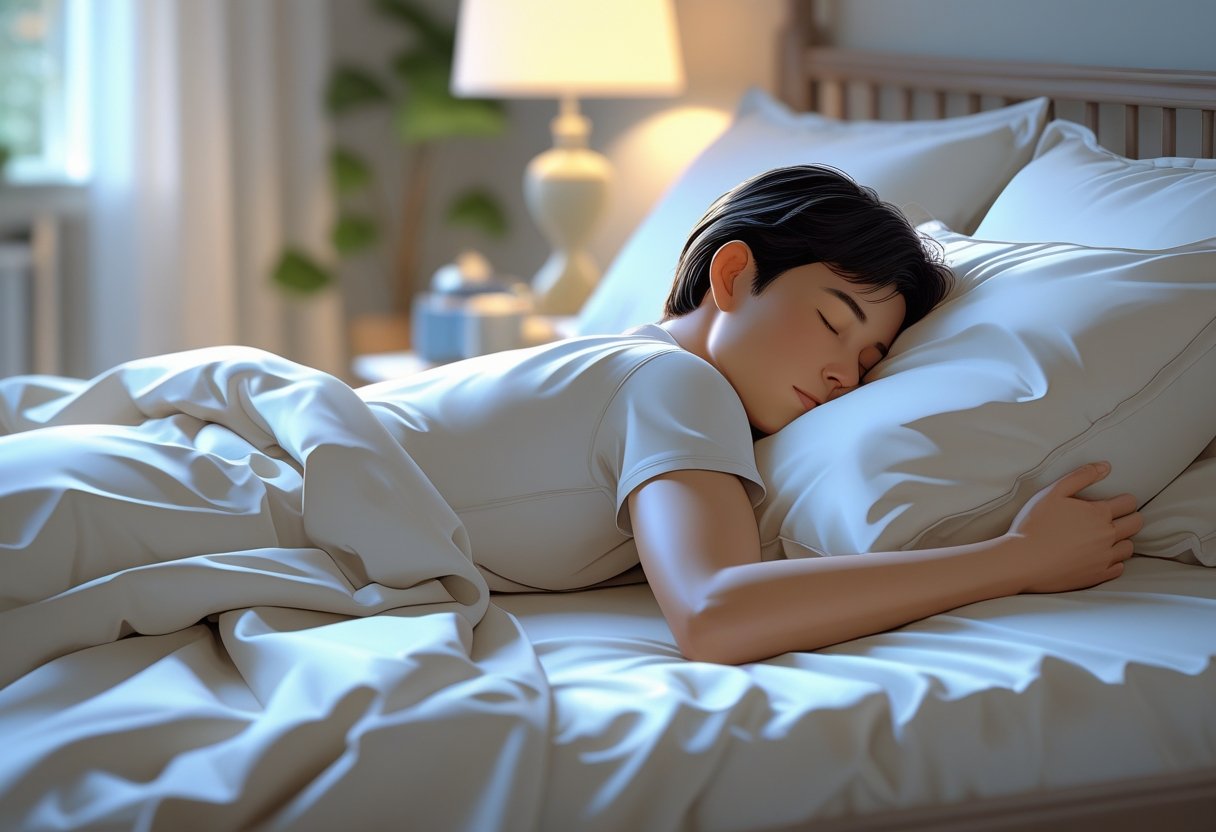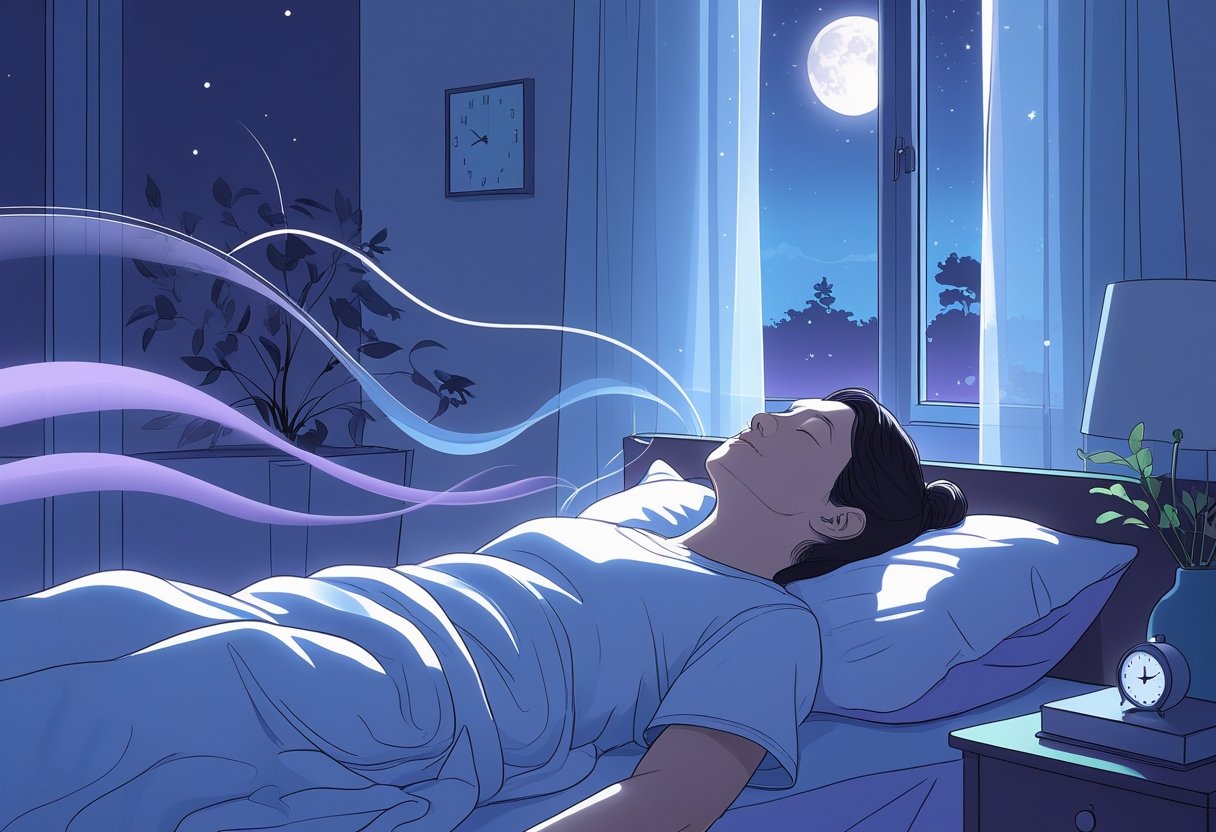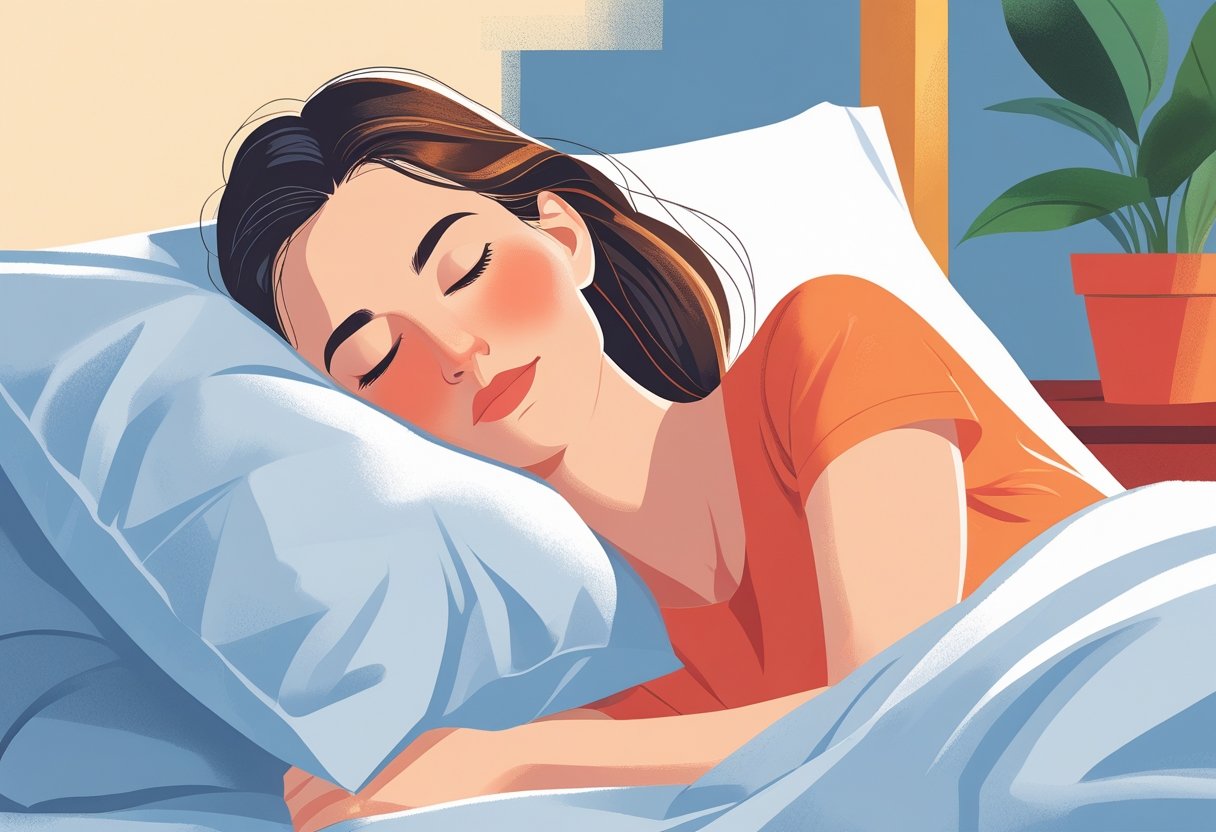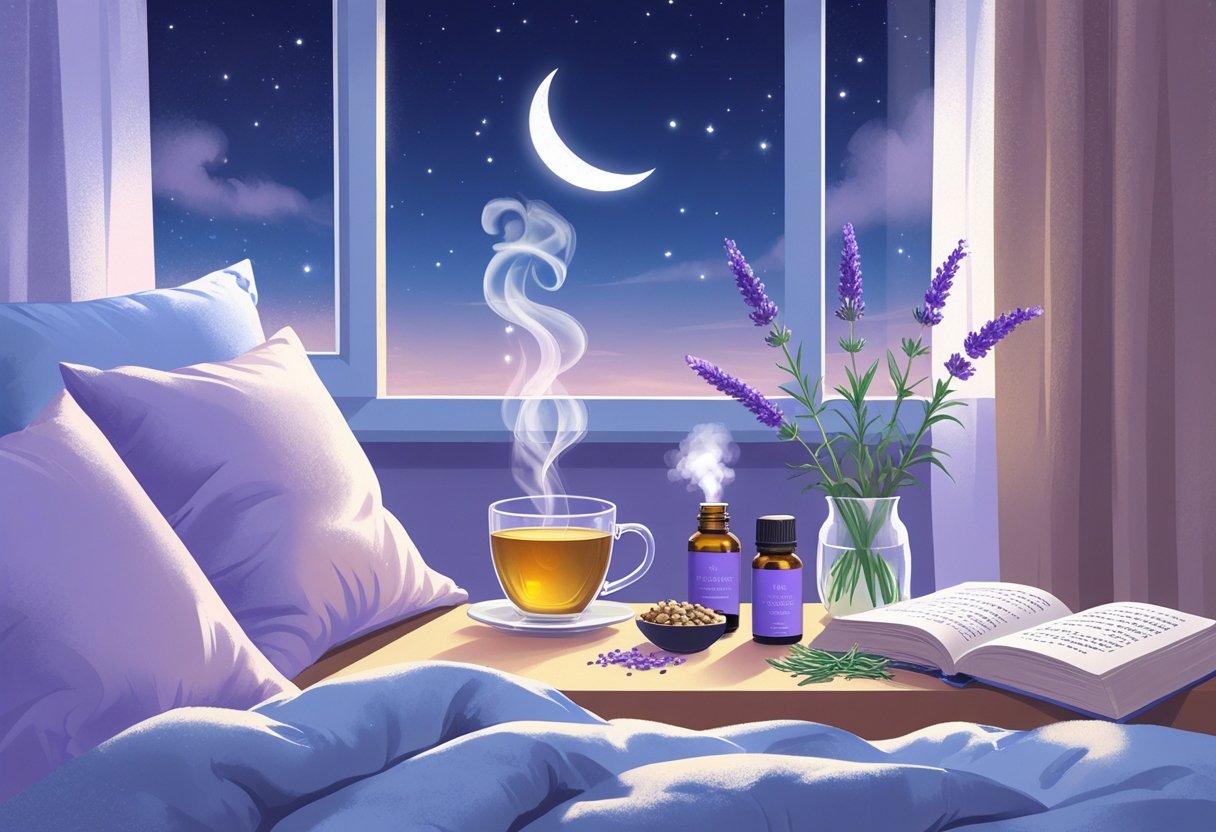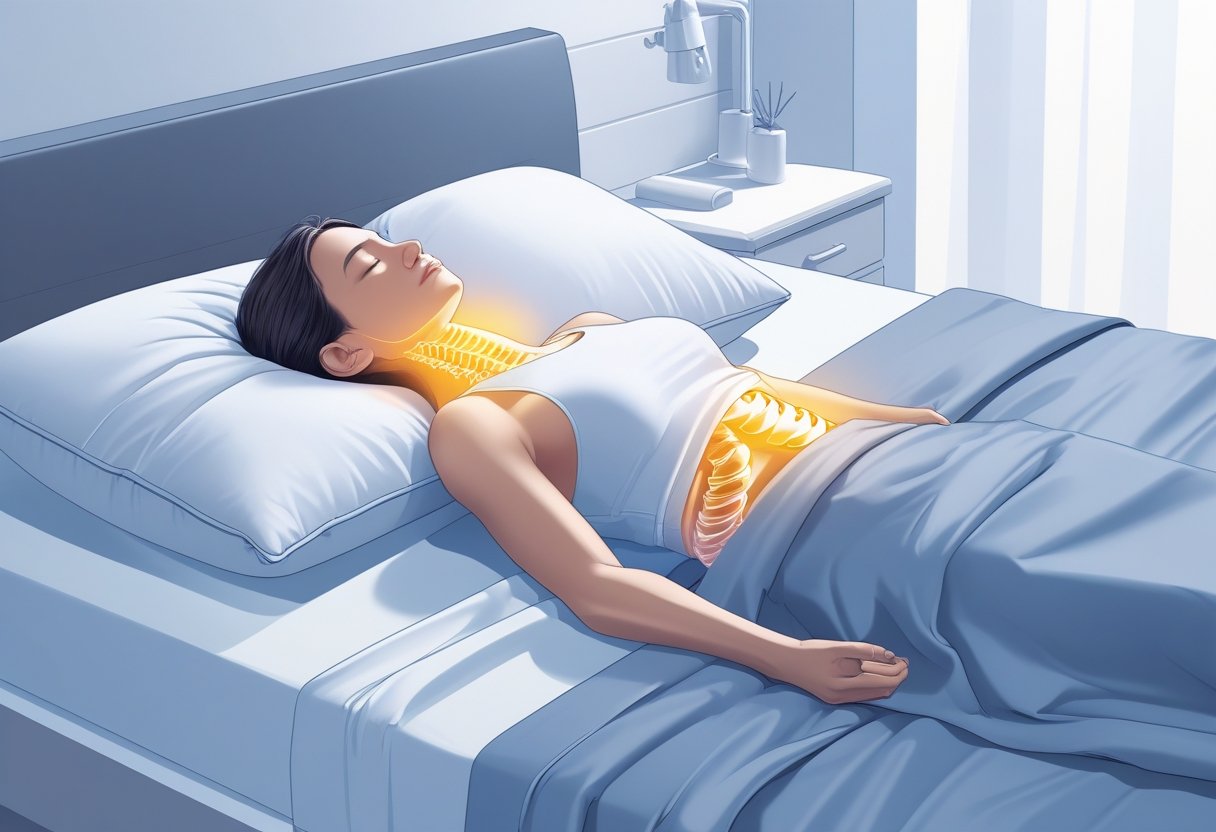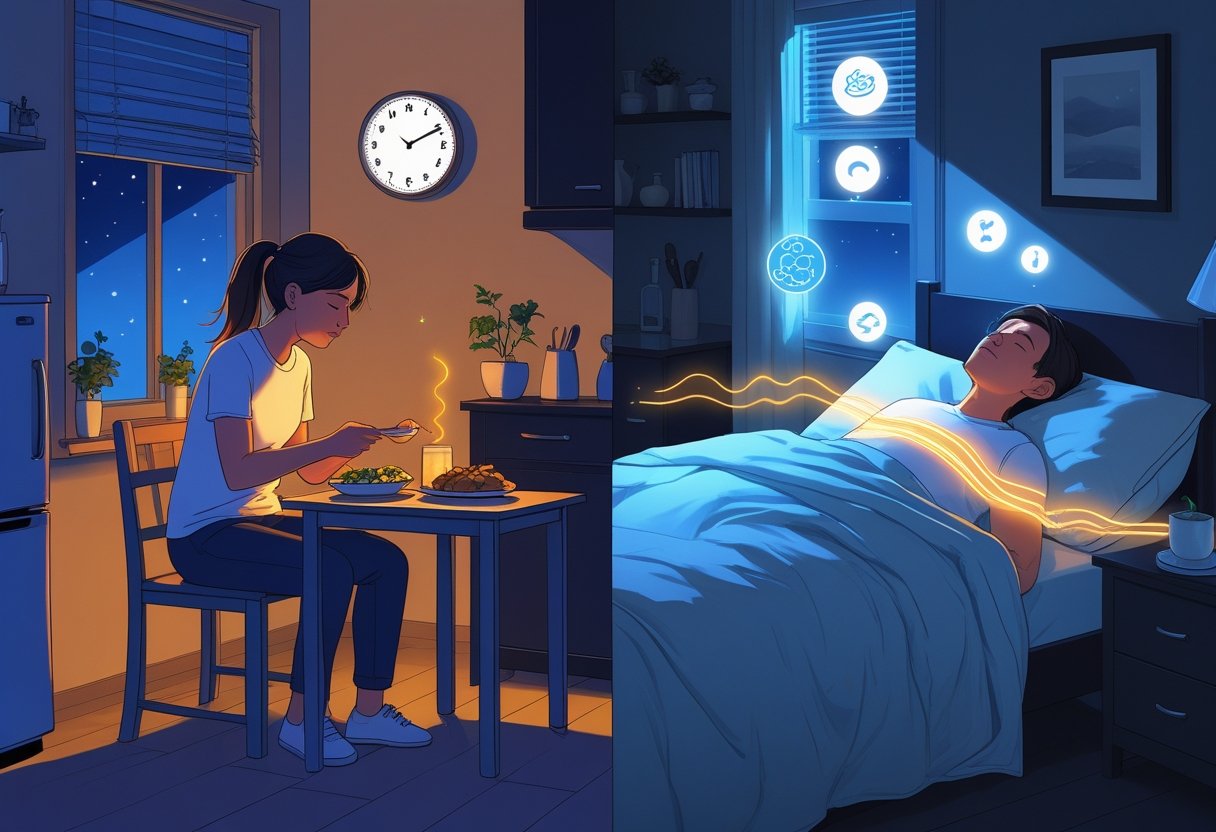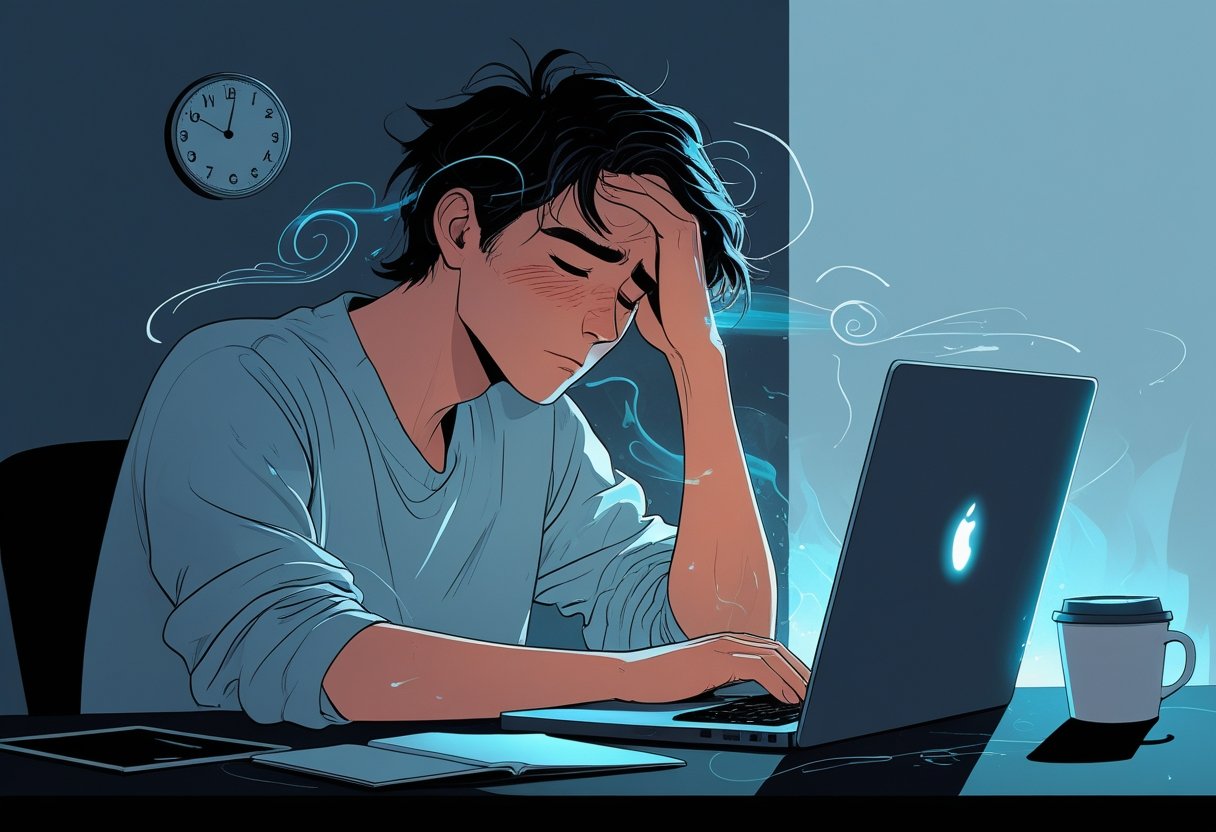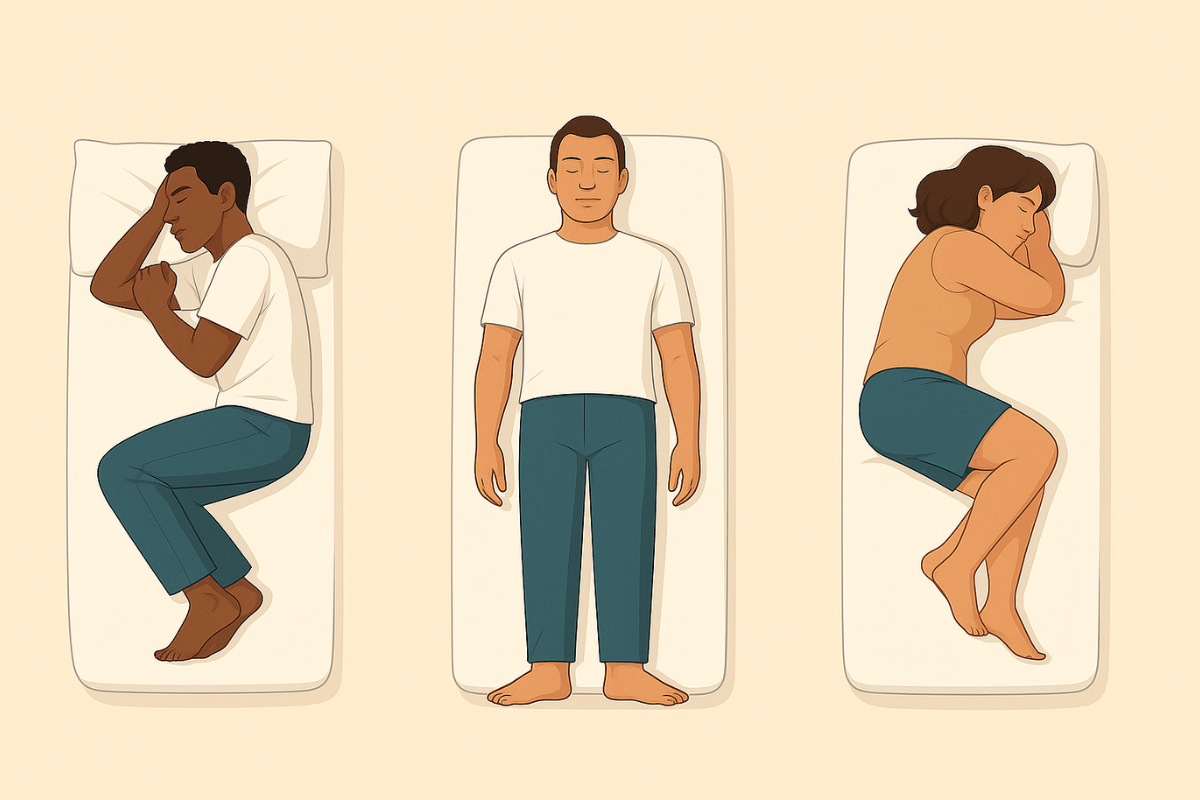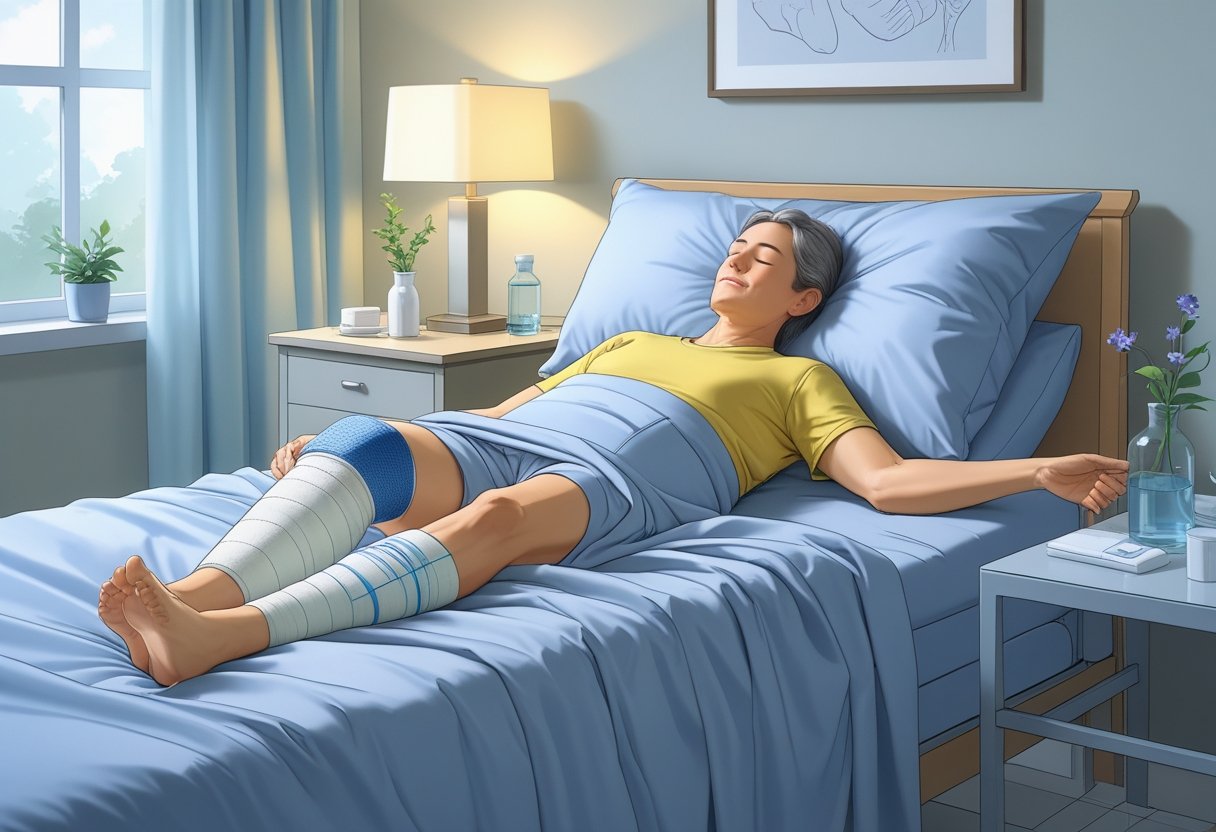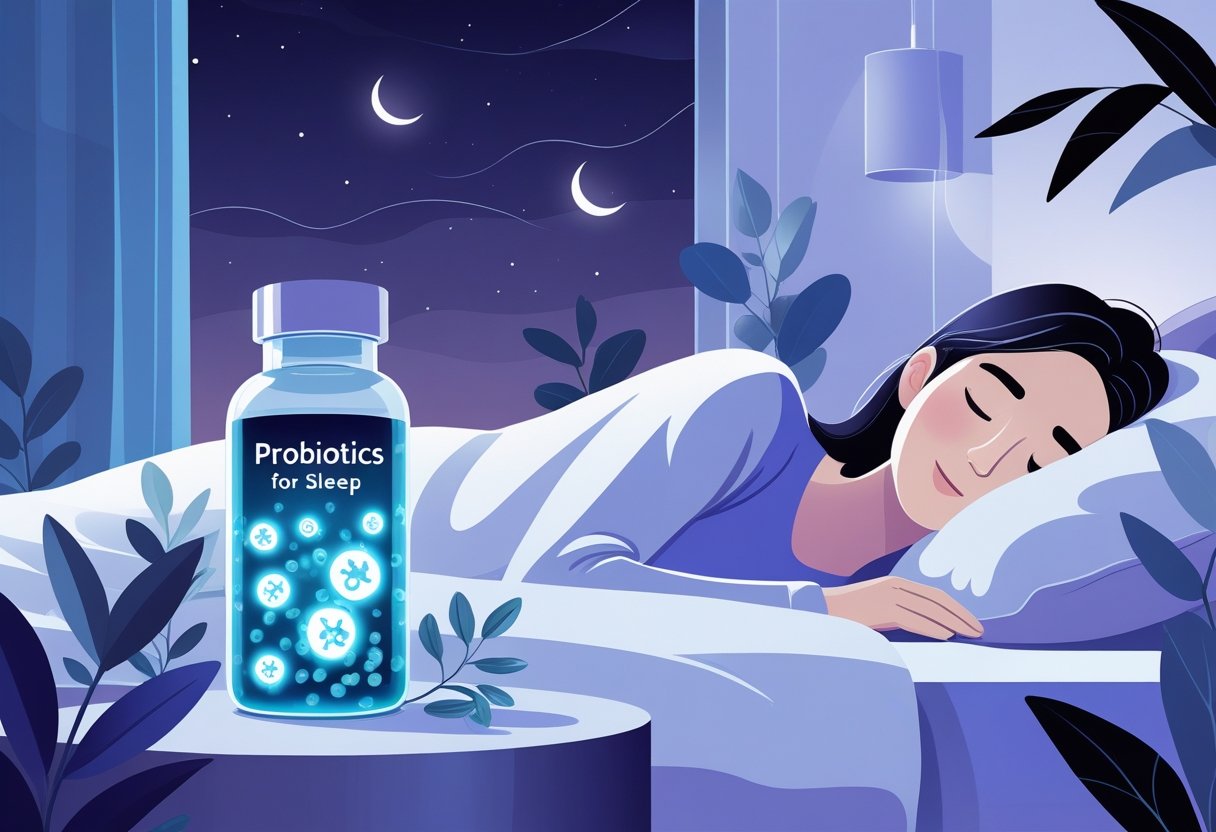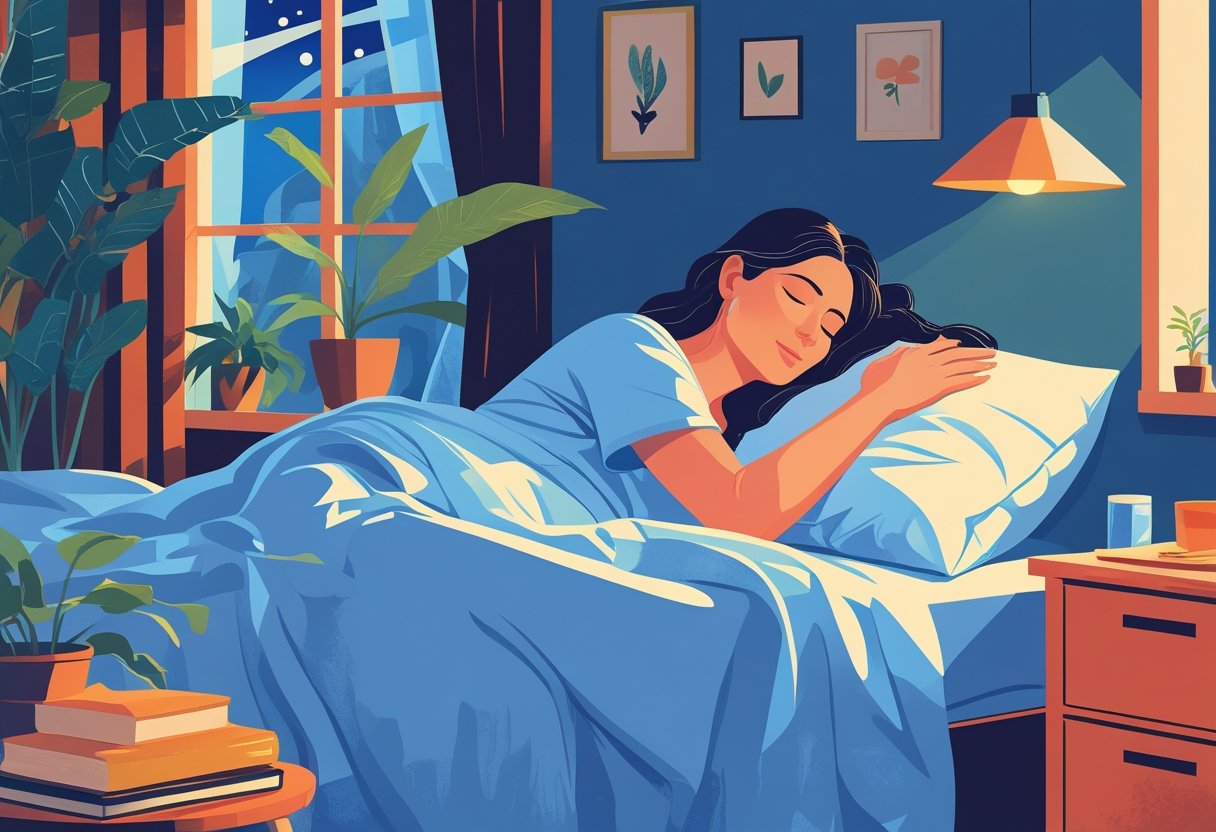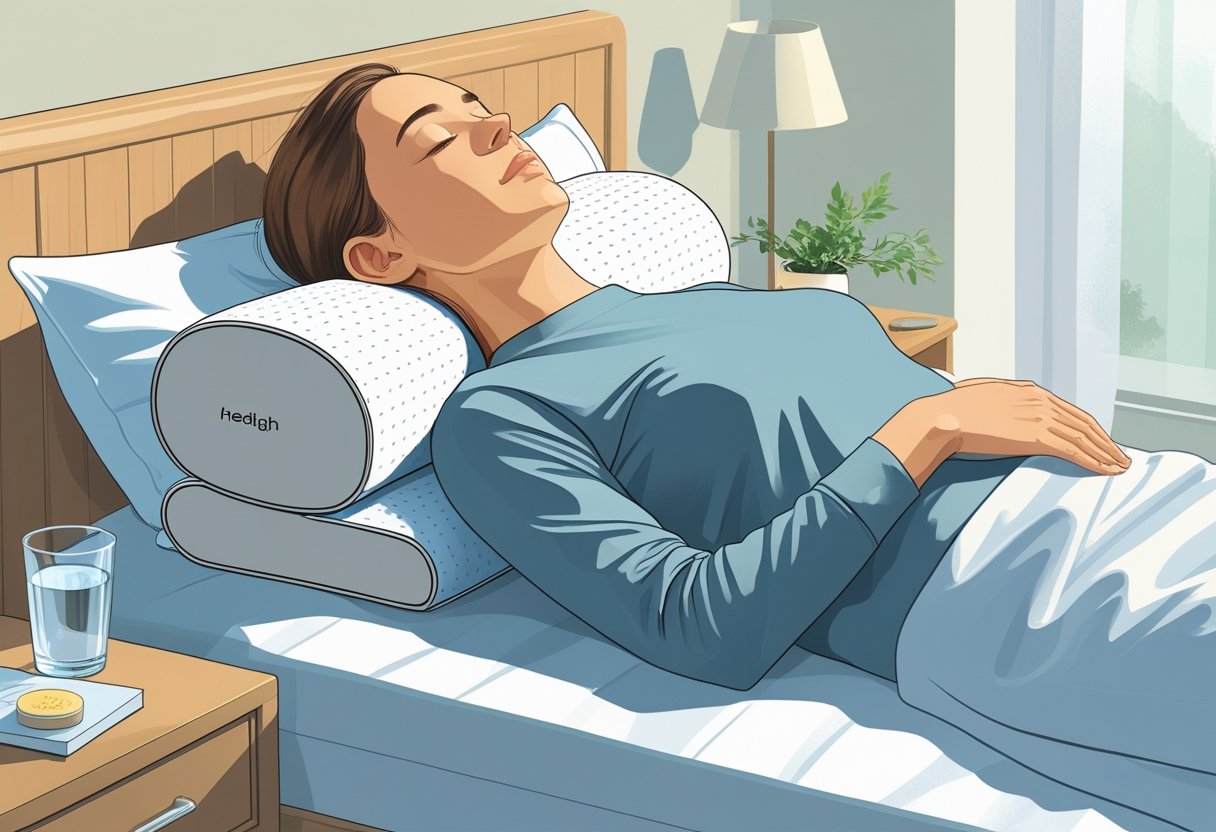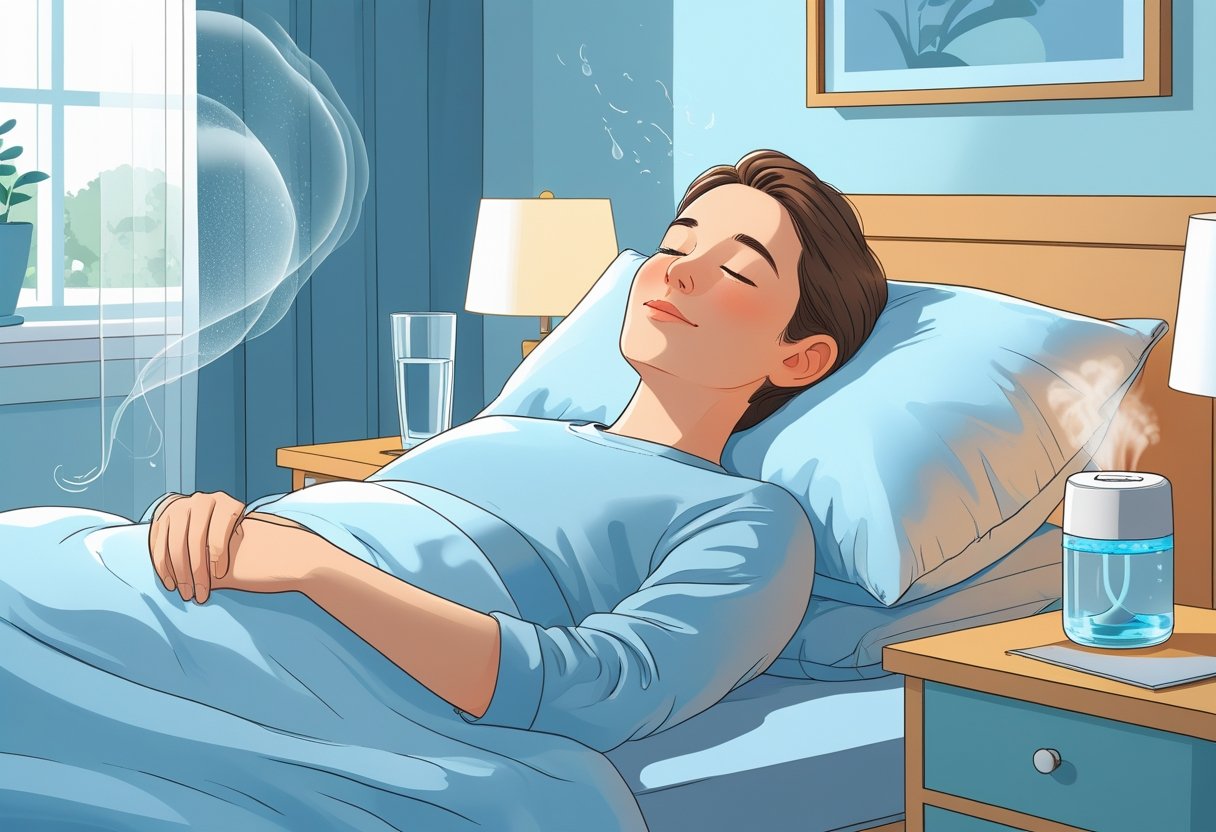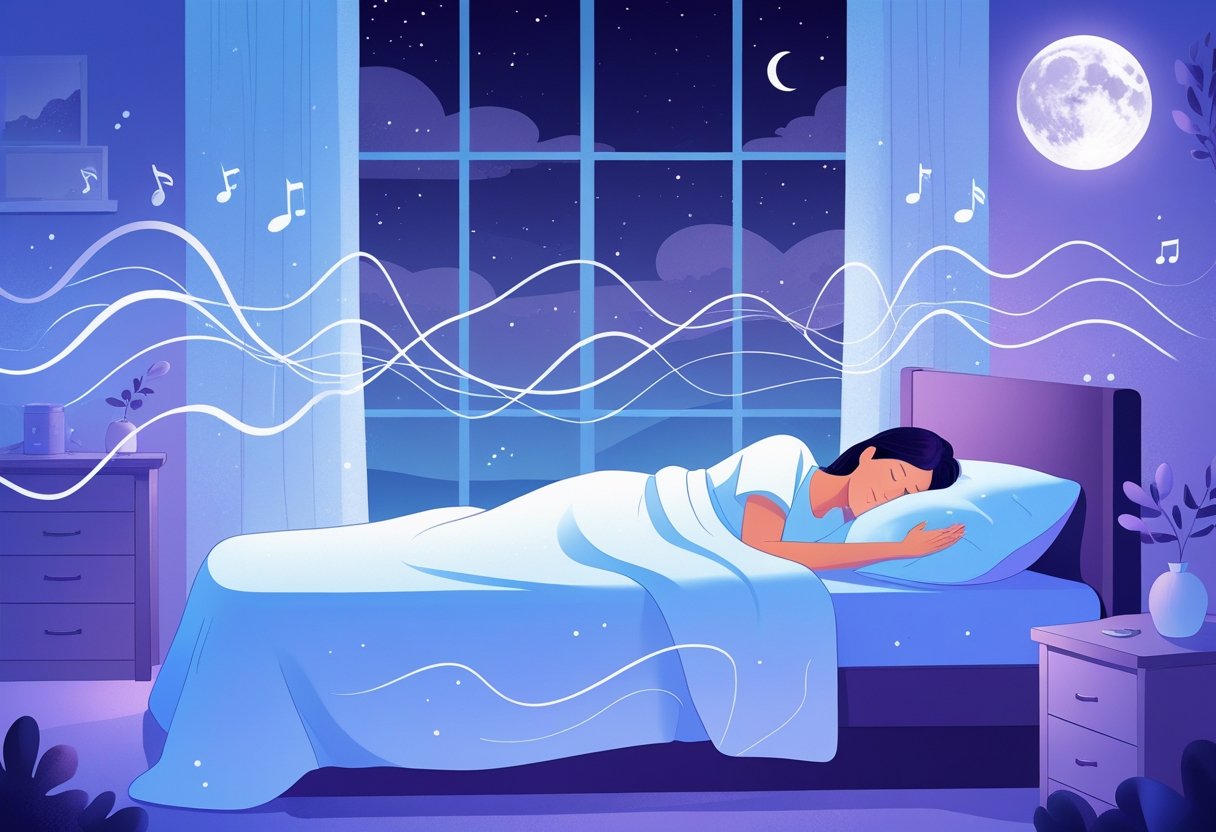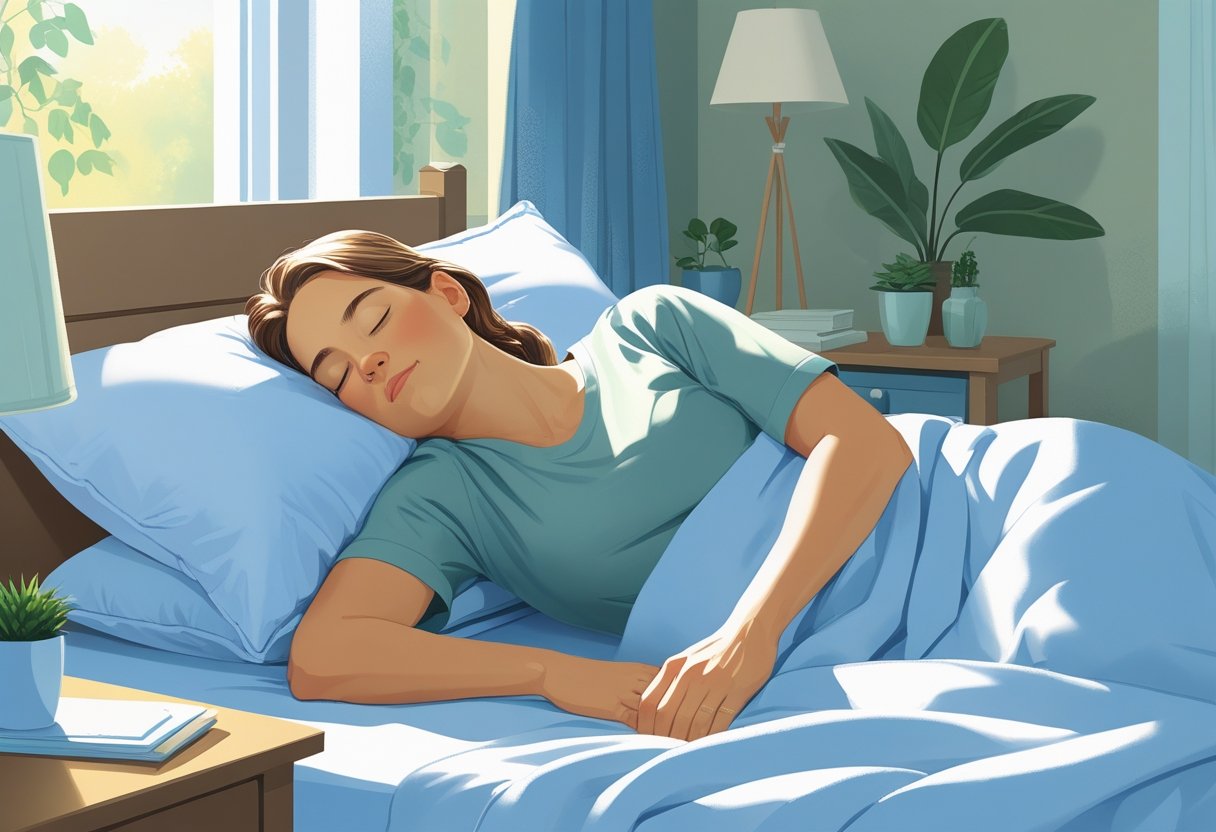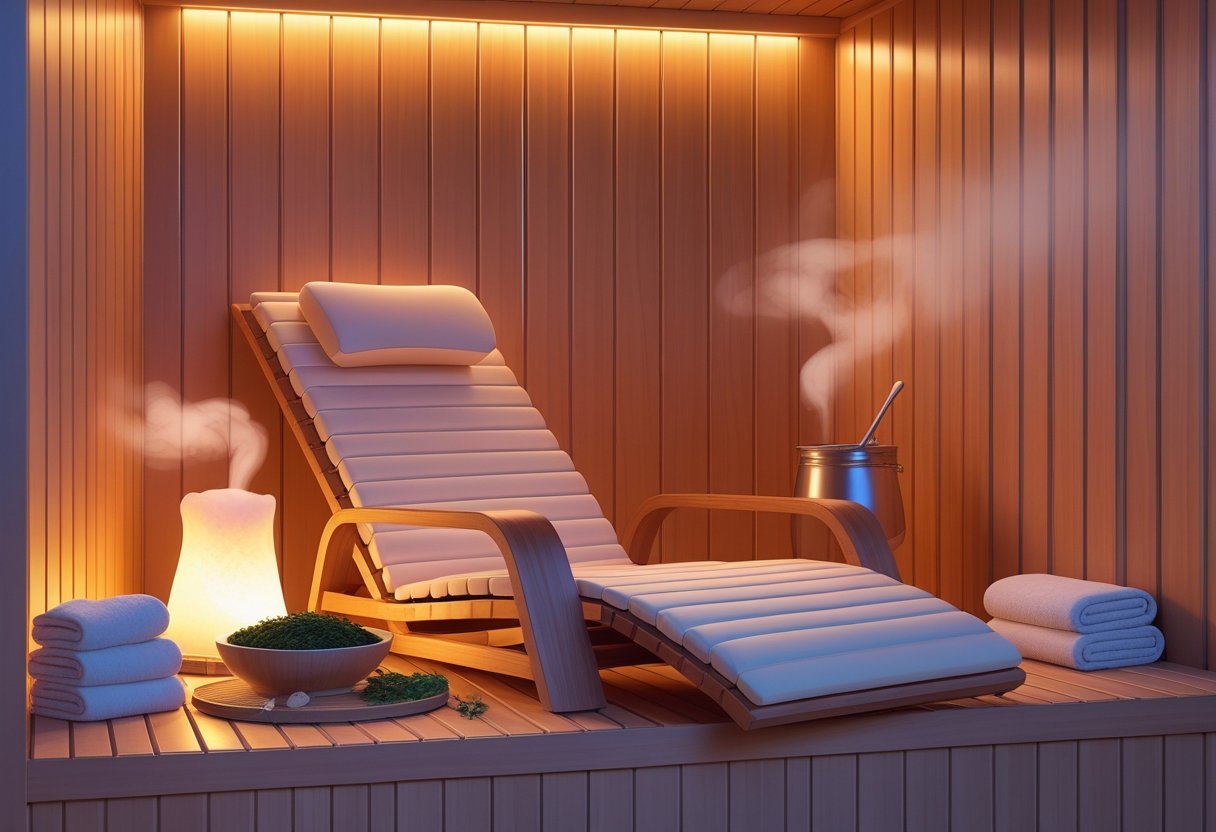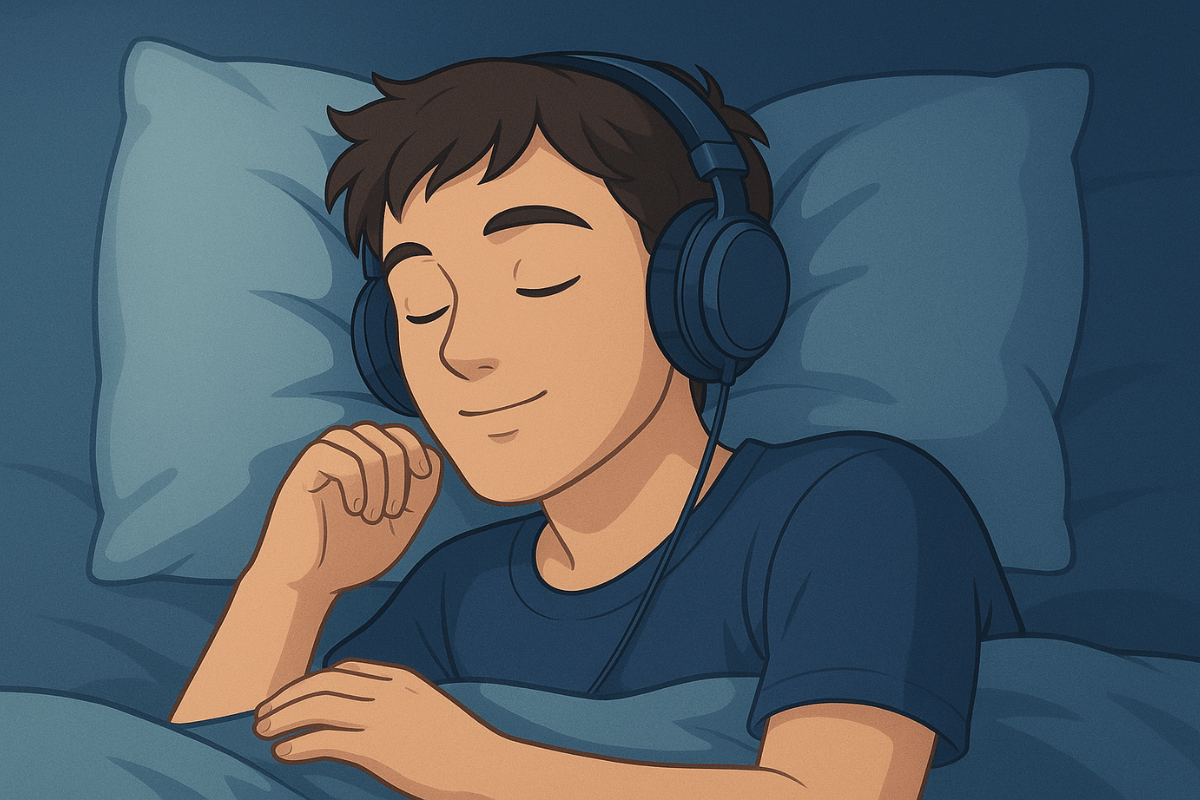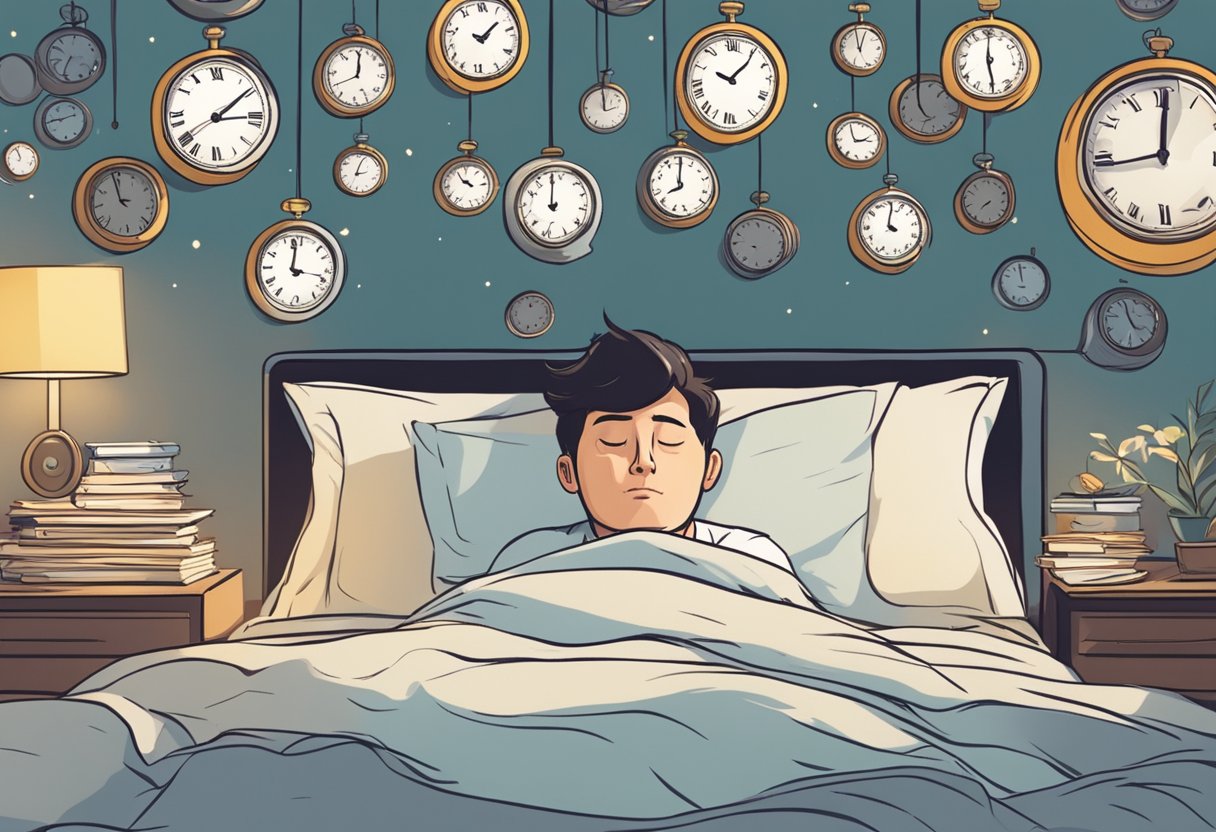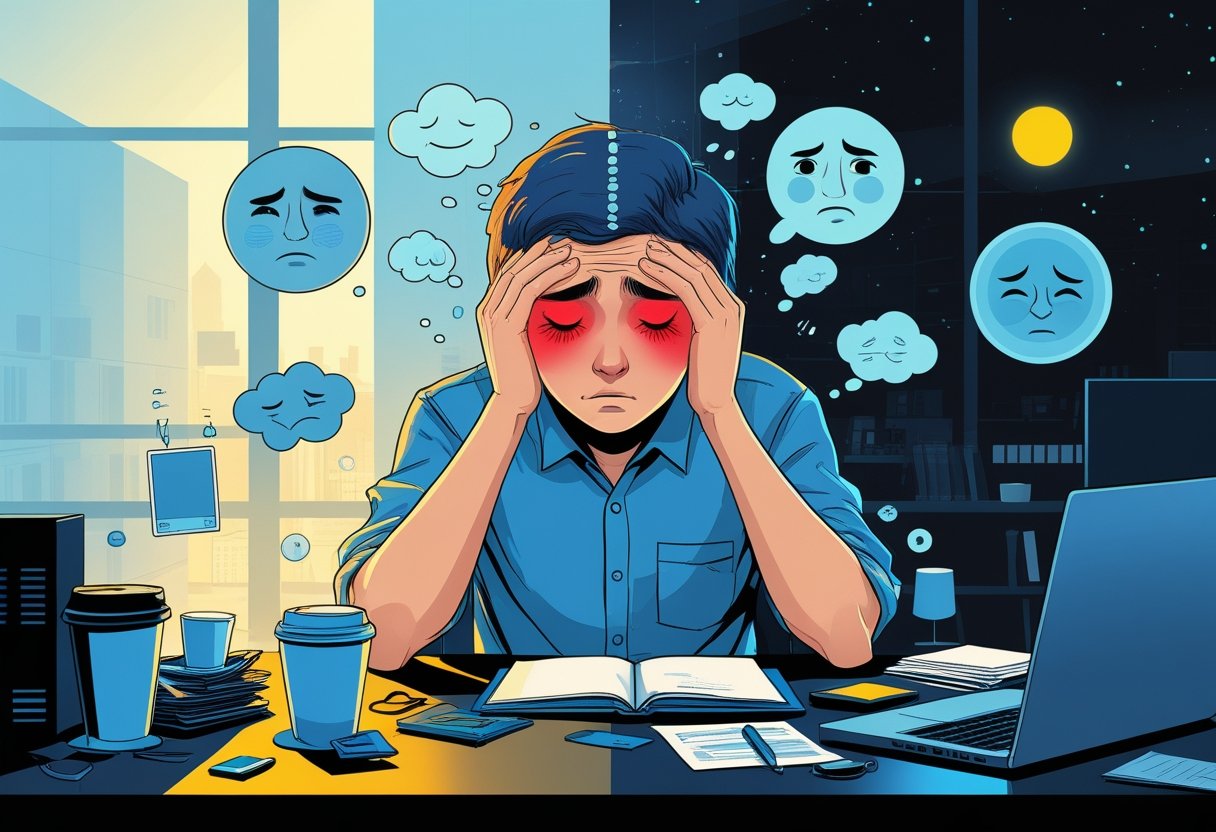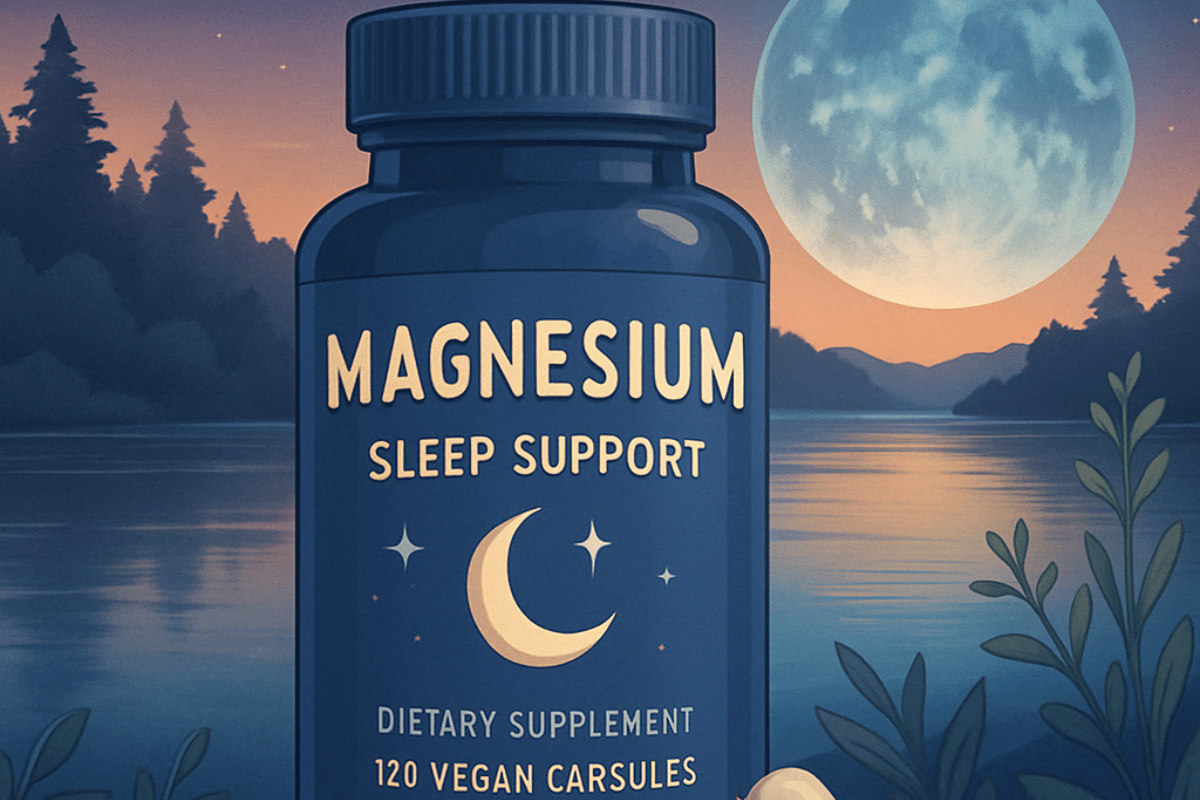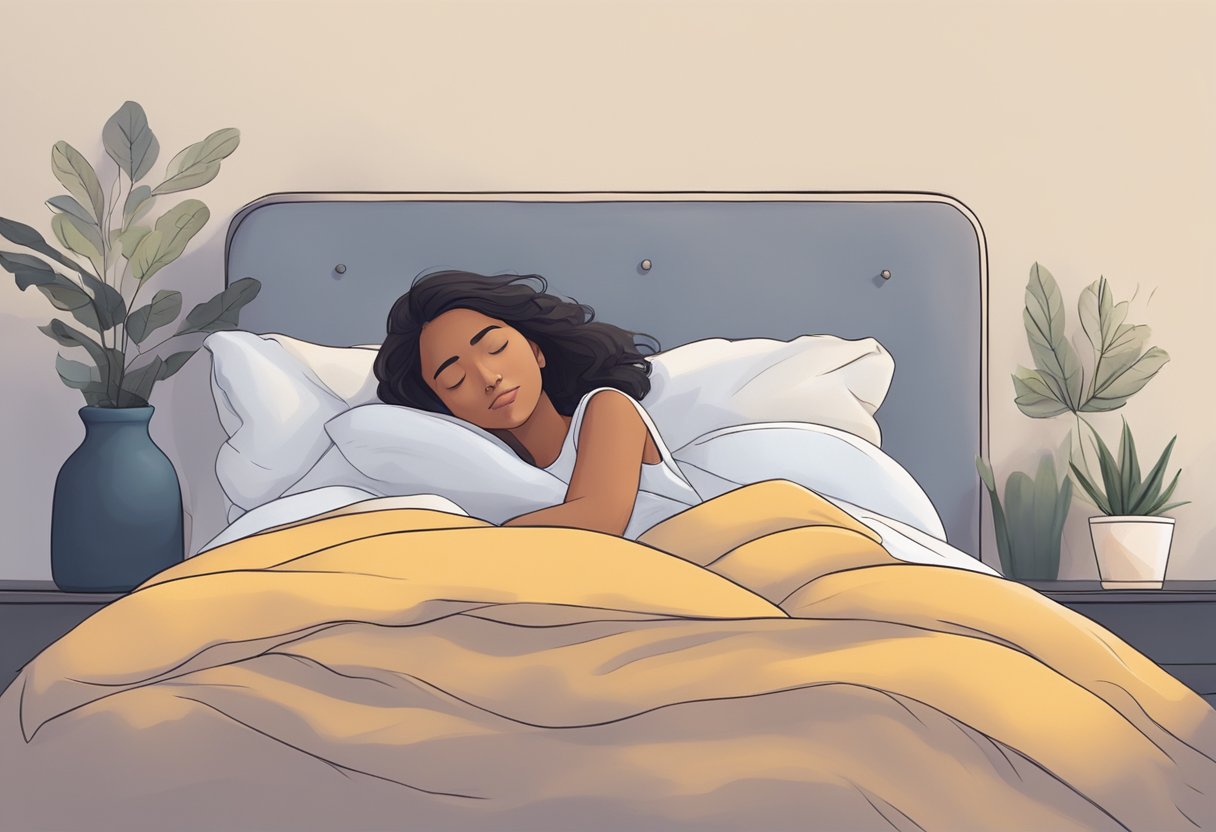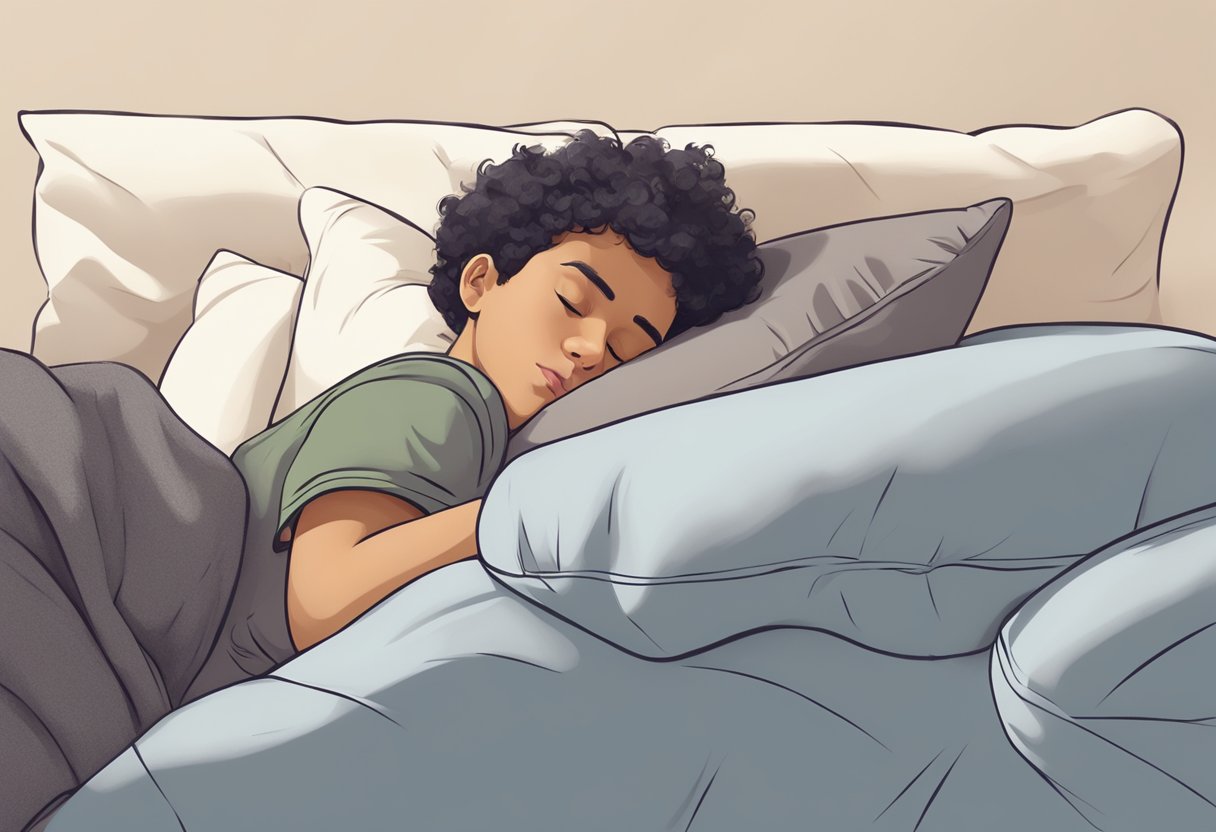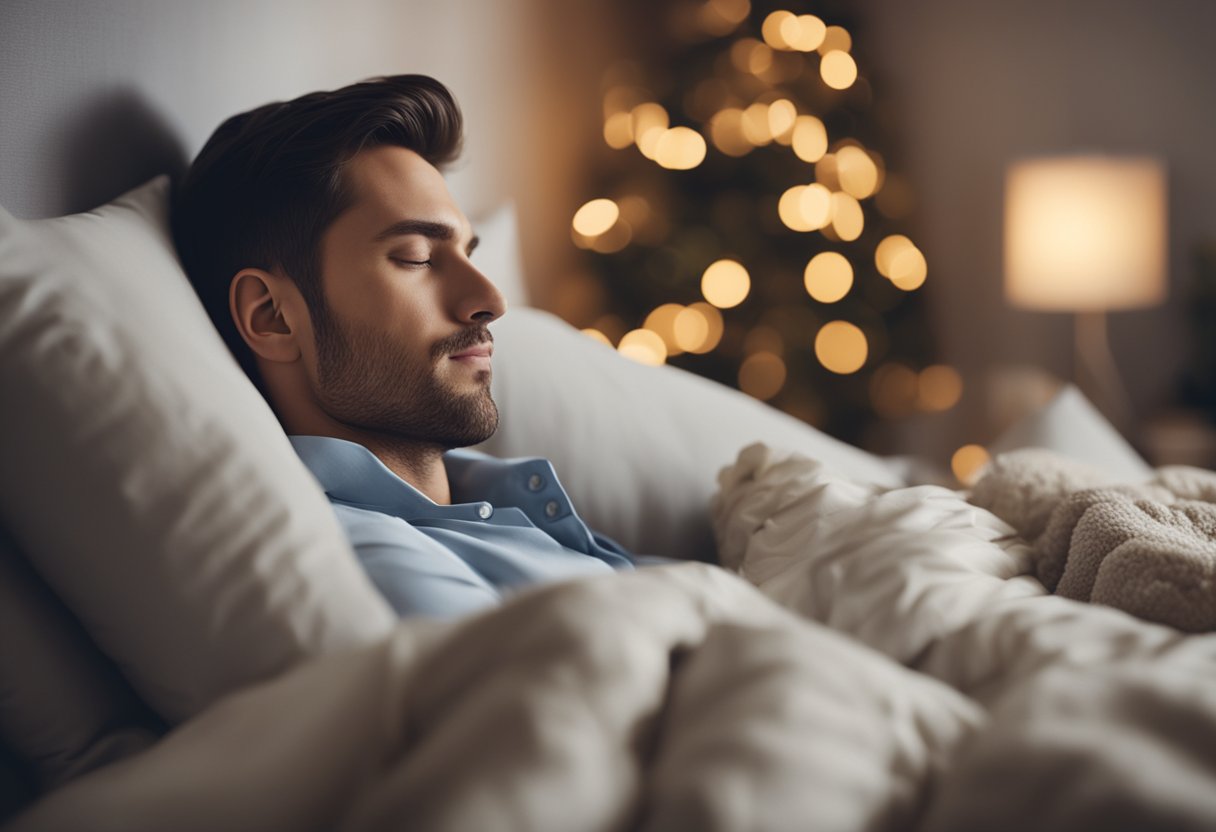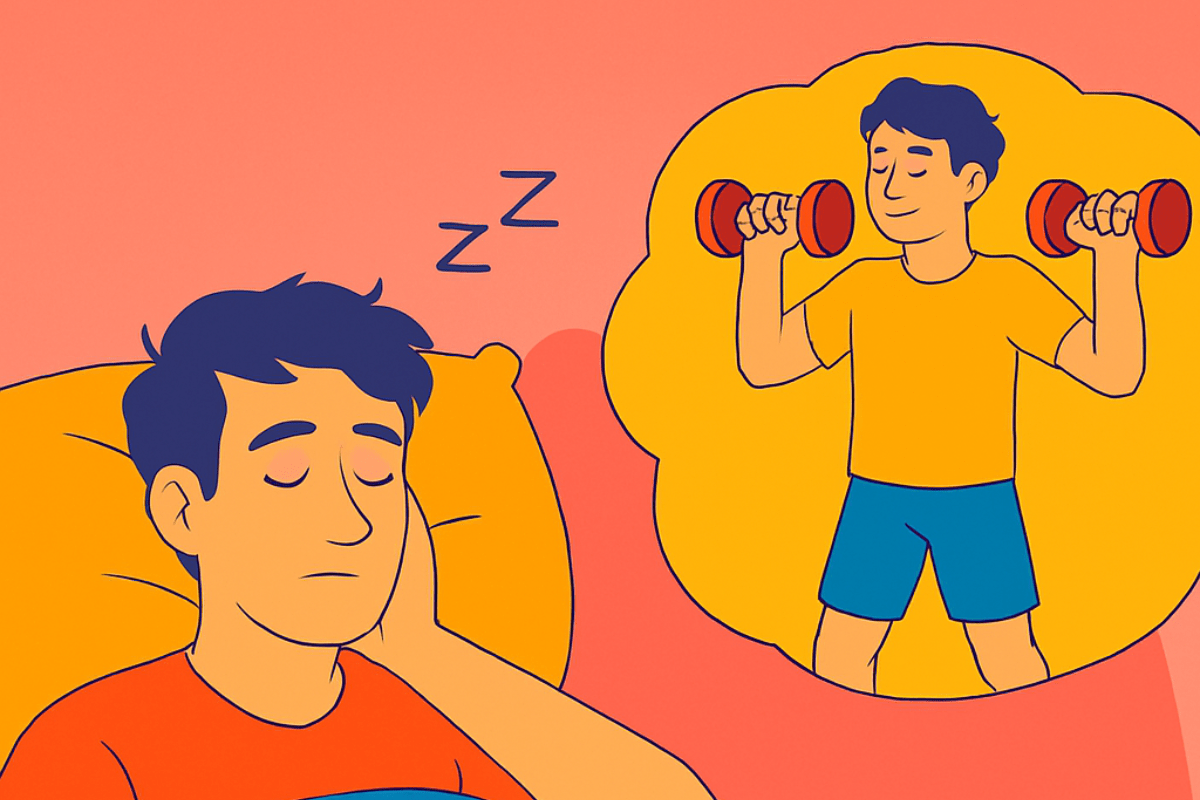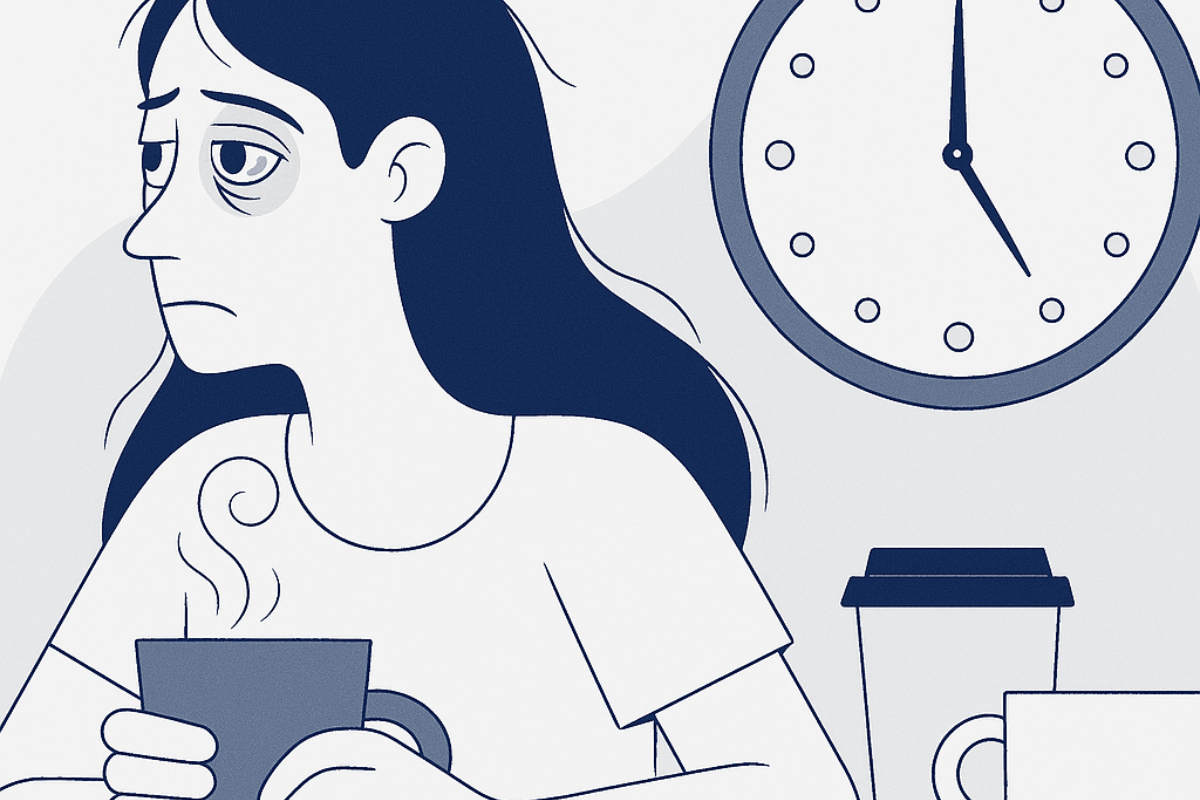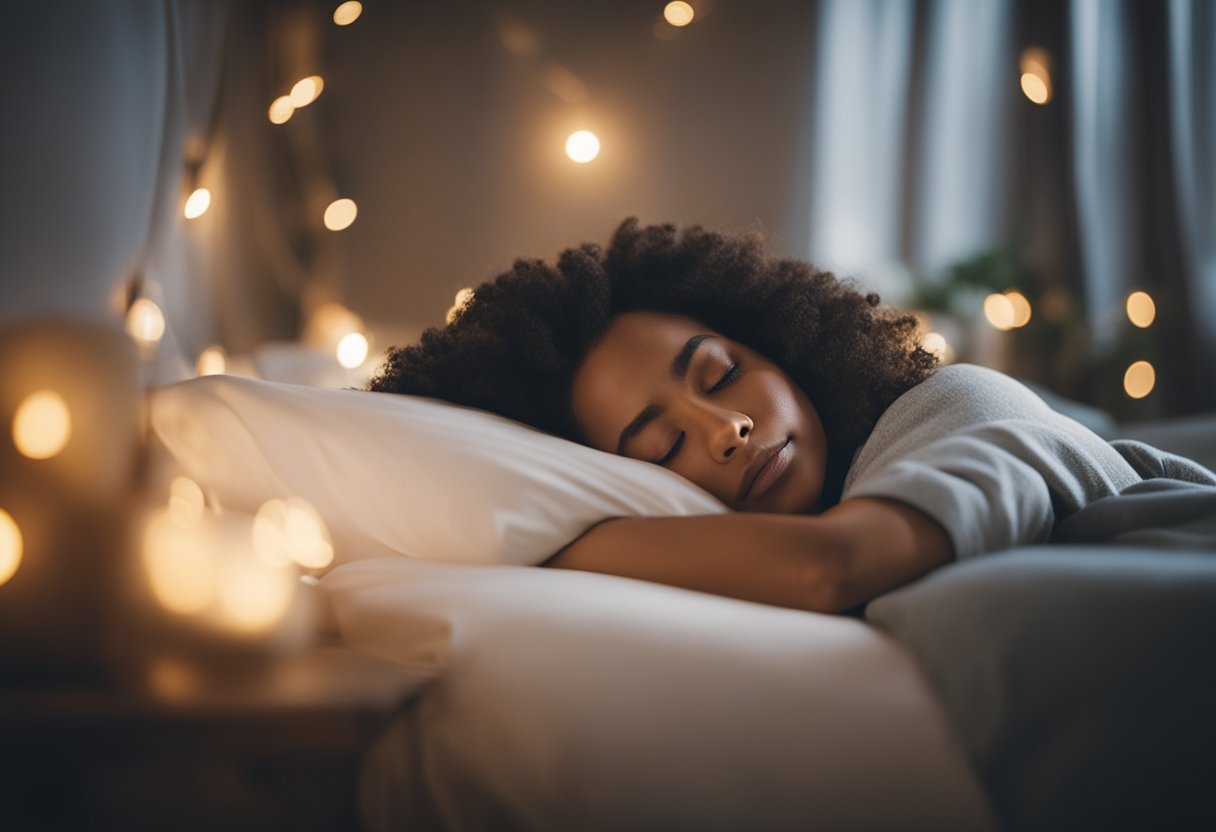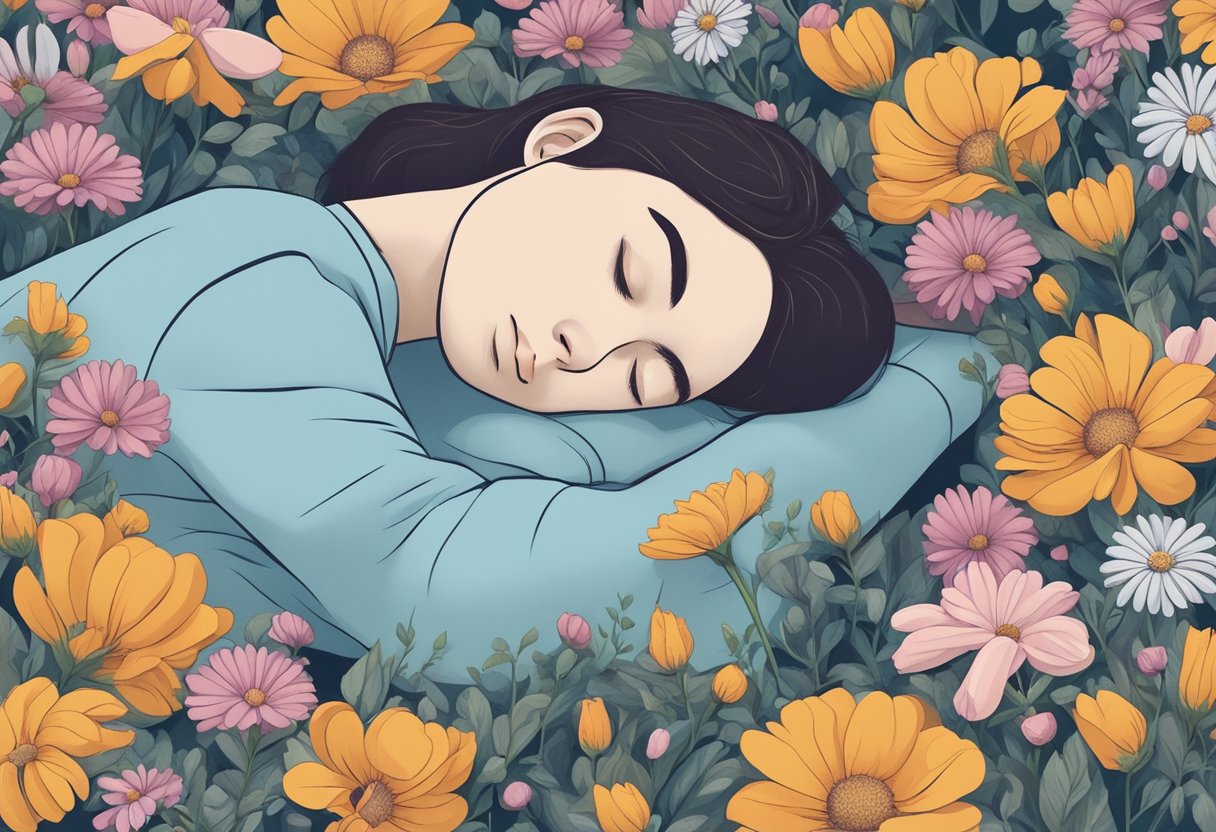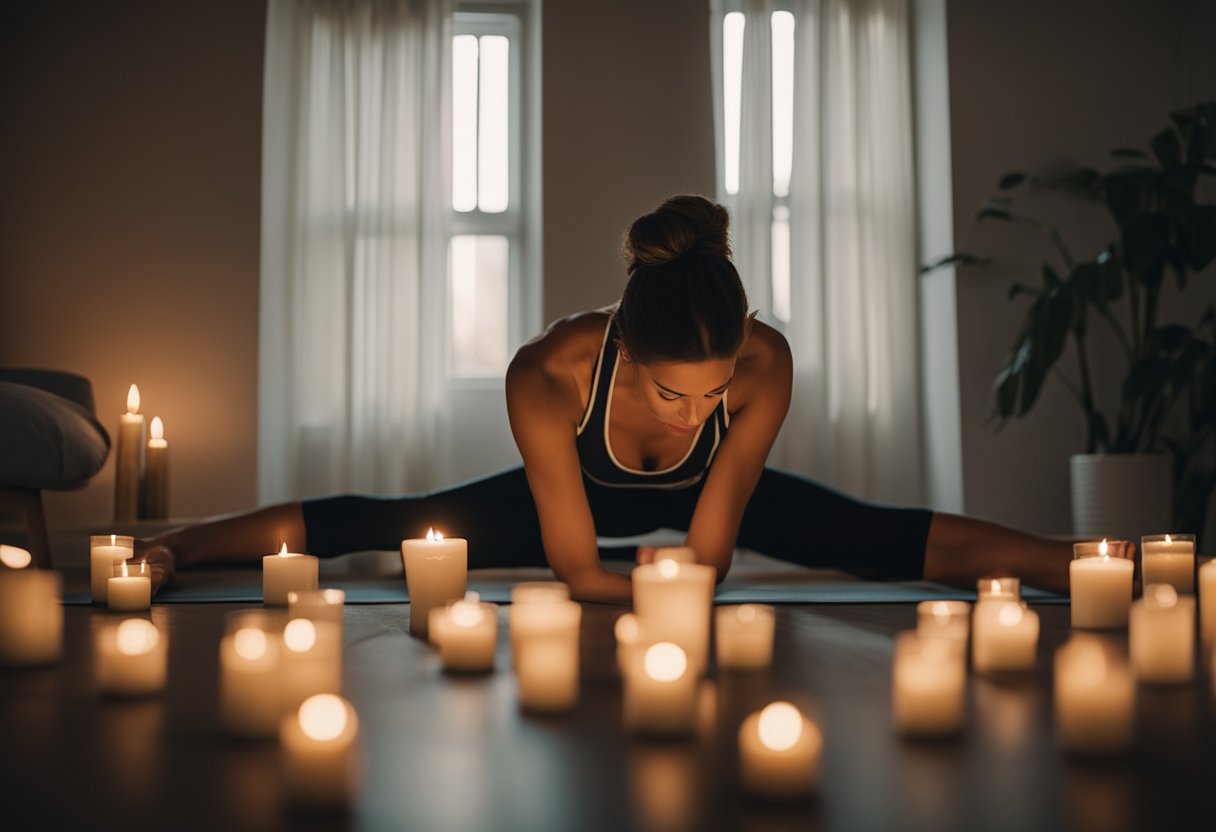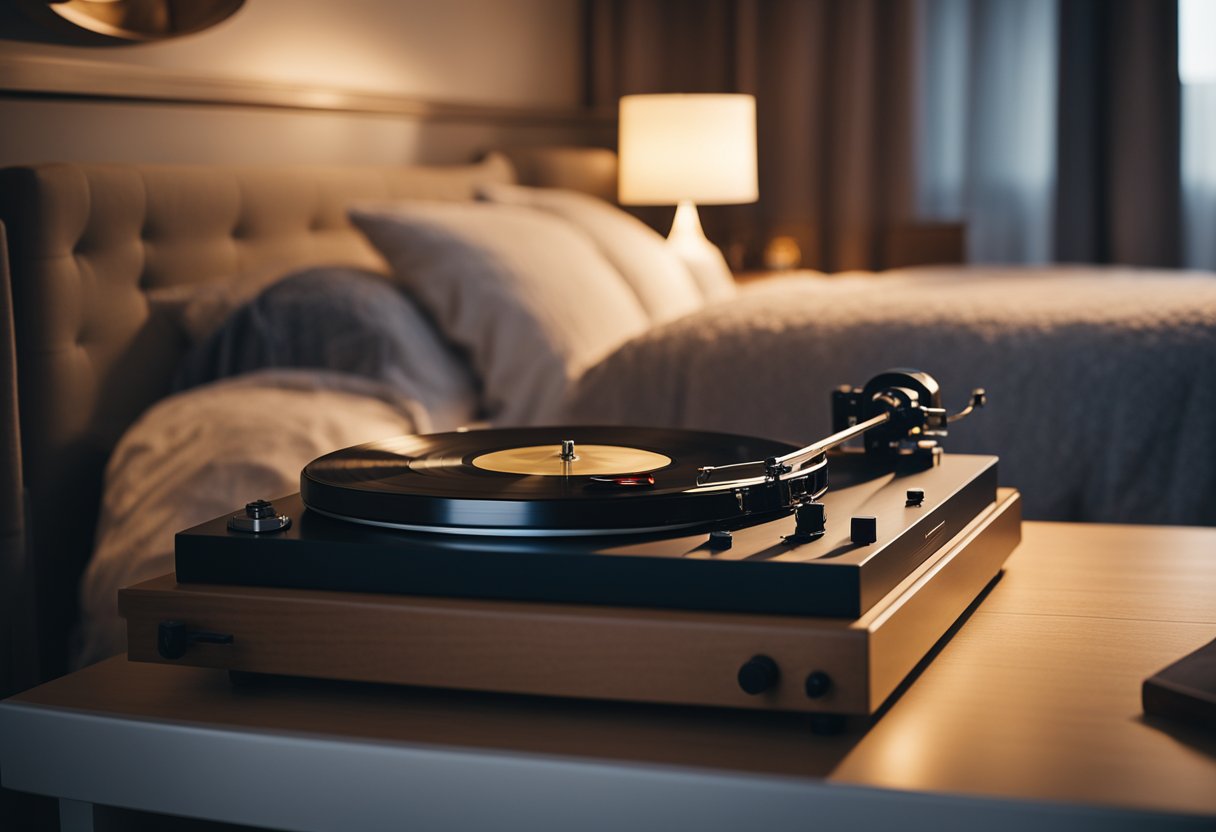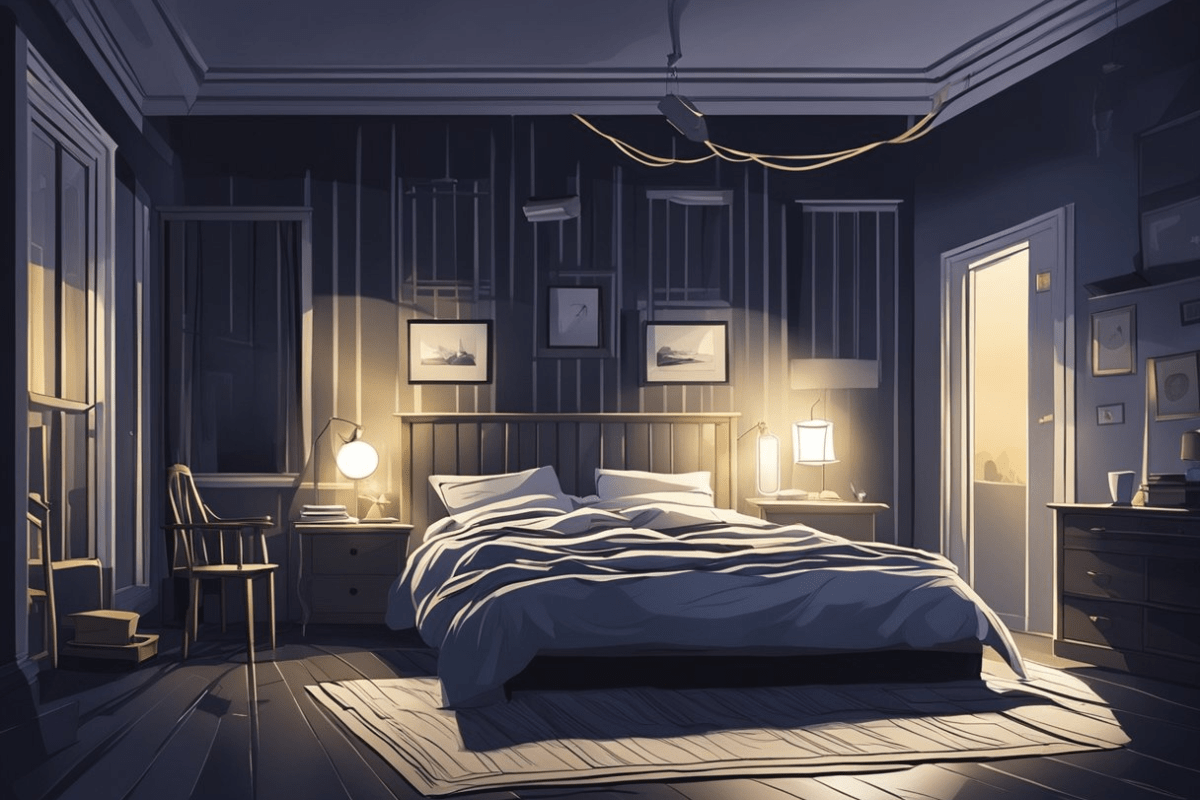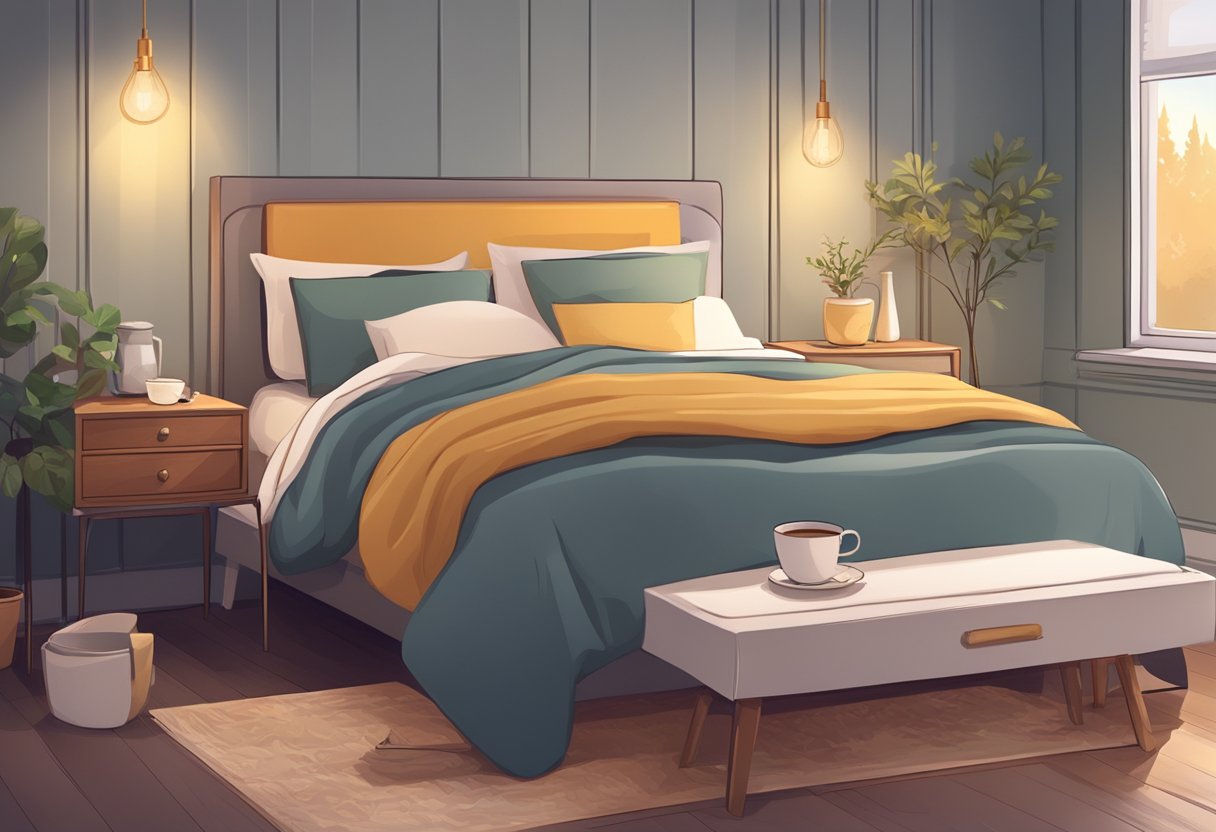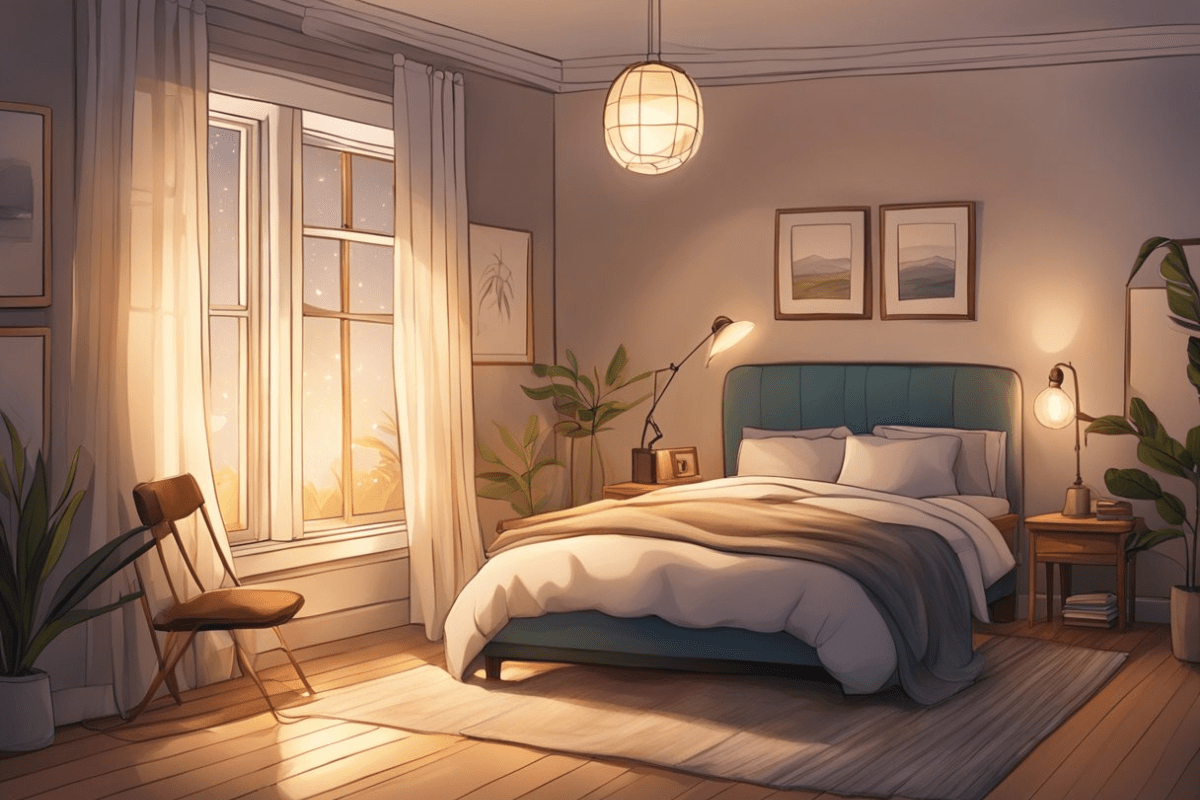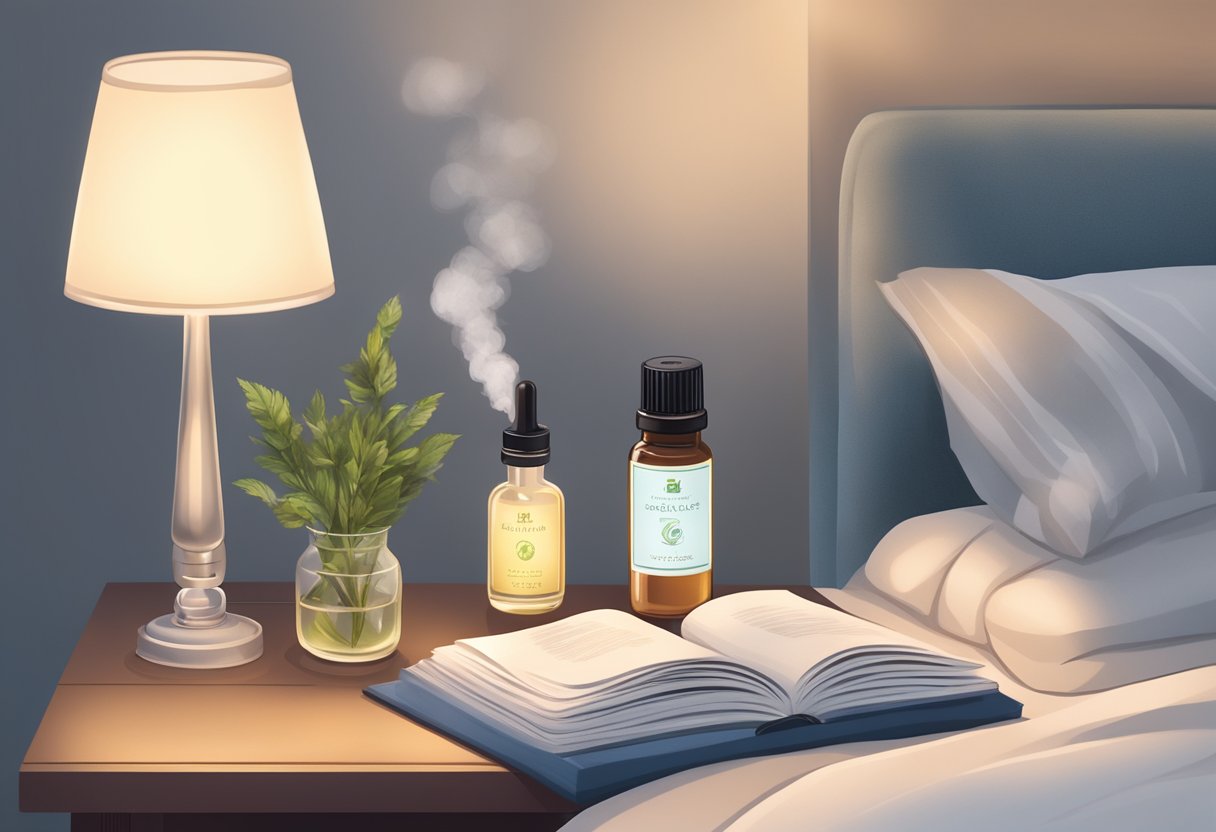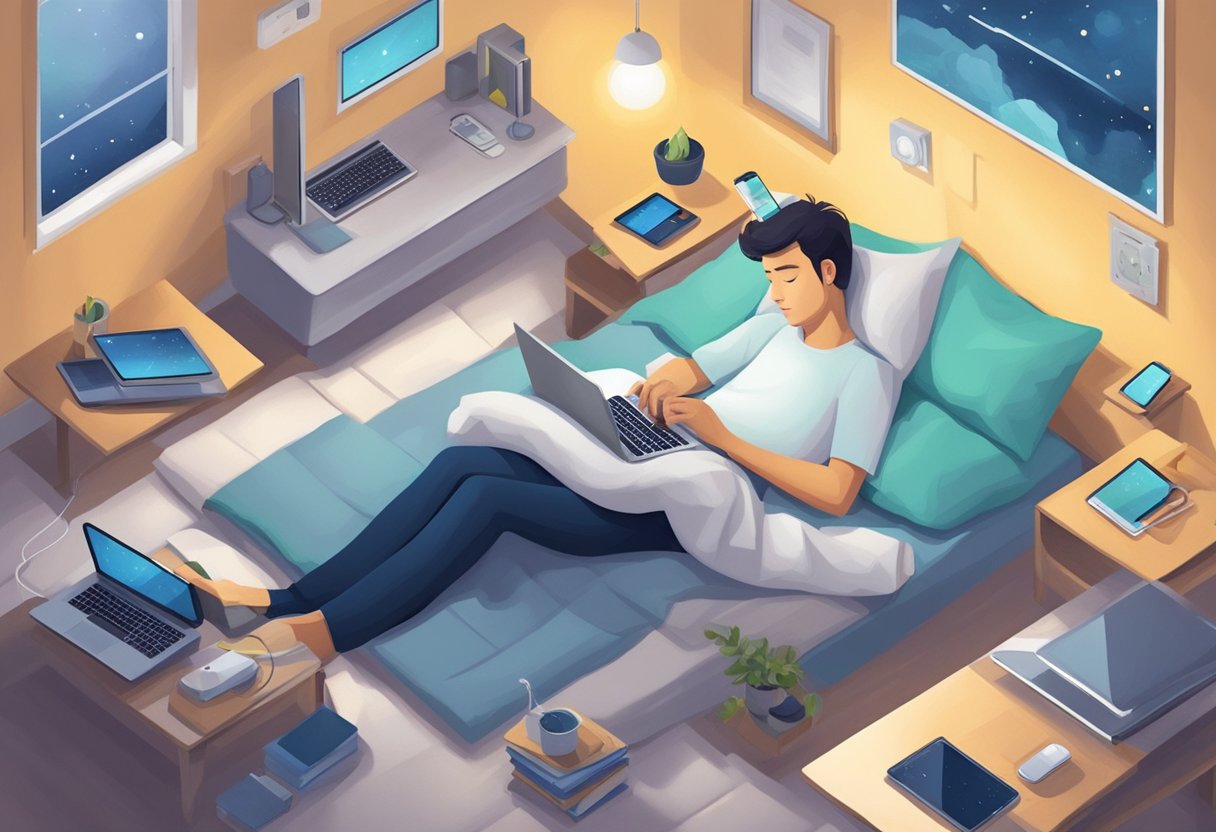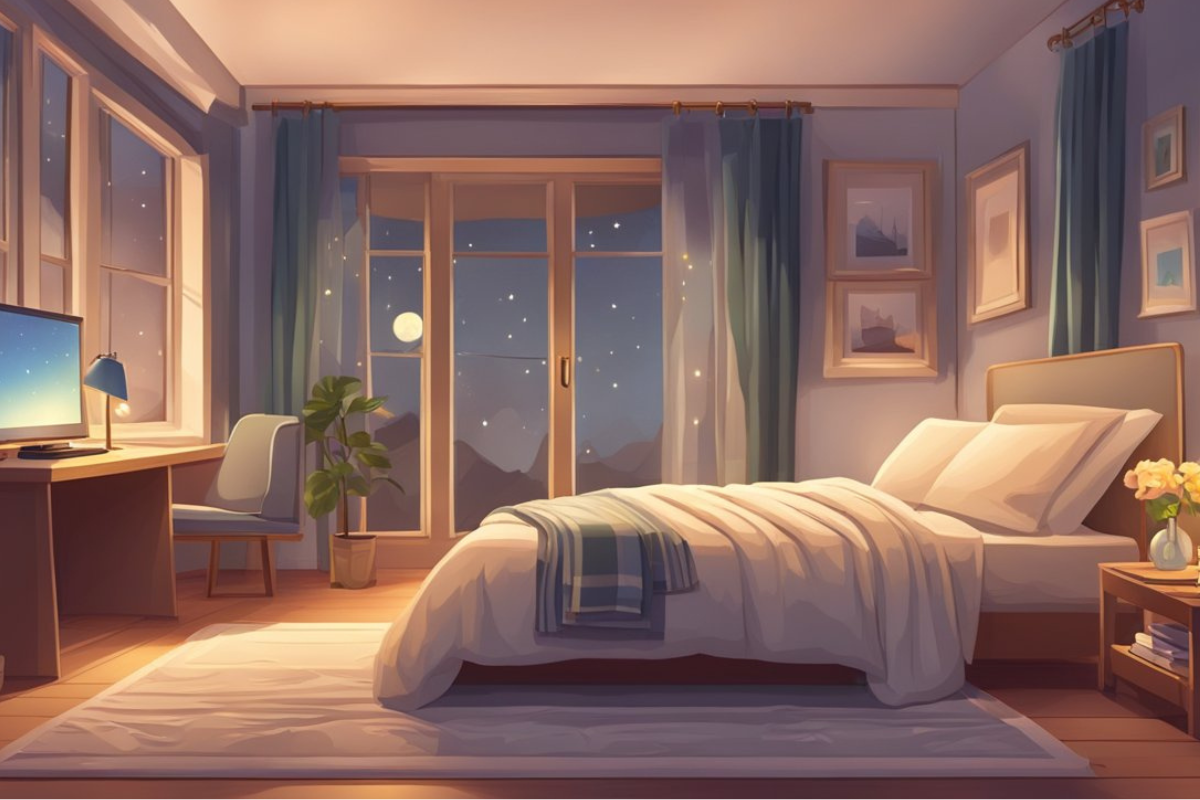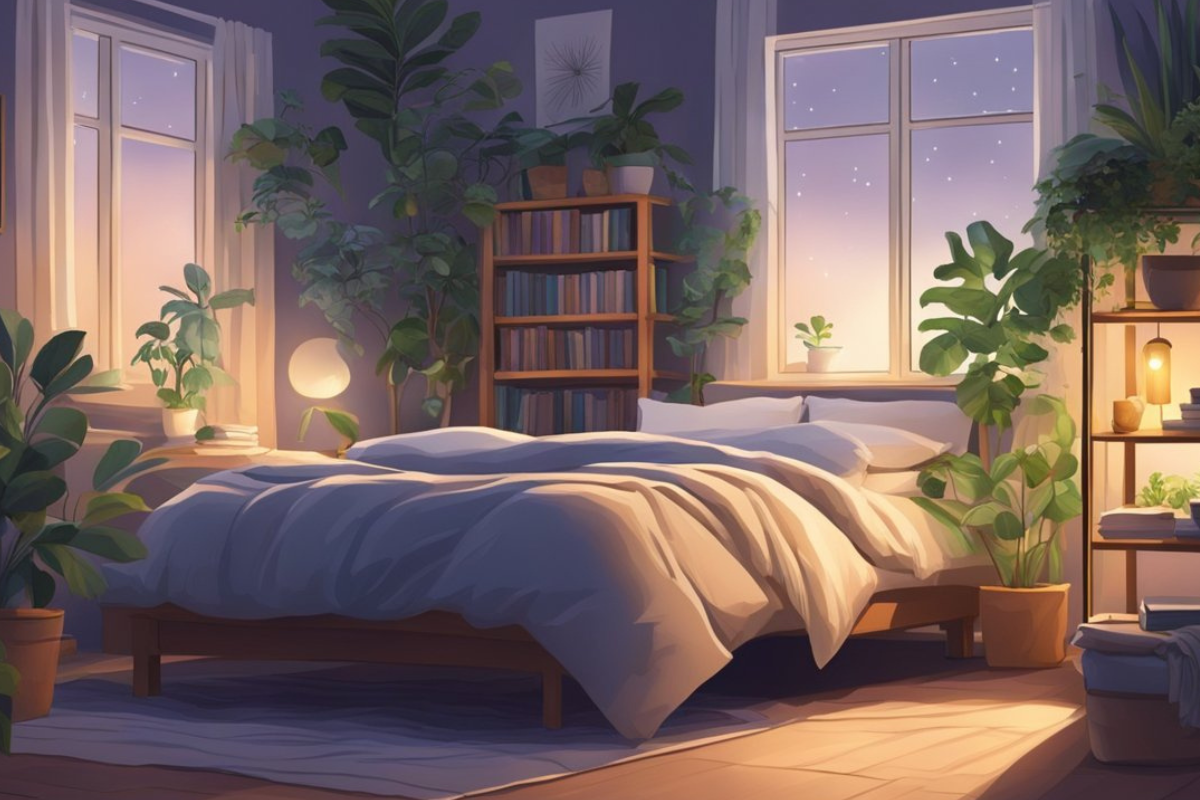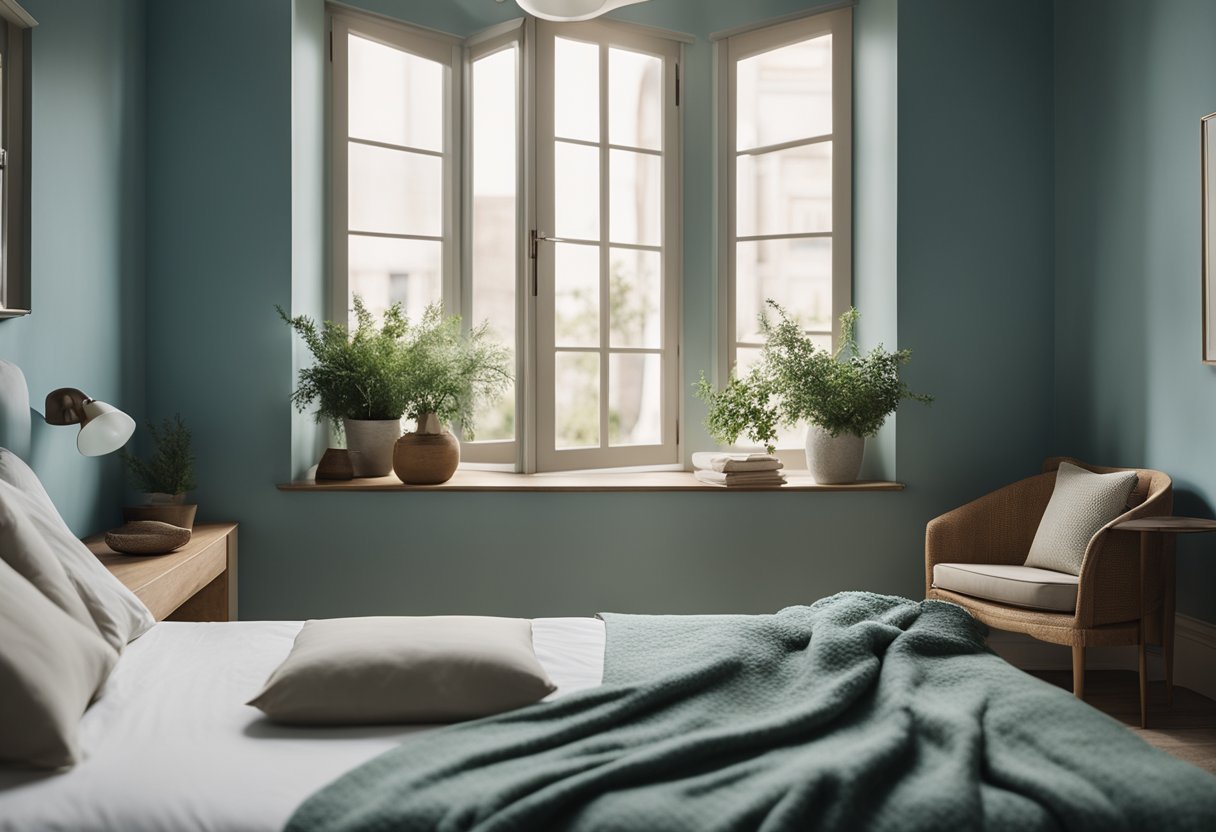How to Clear Your Mind to Sleep: Effective Tips for an Active Mind
Many people find it hard to fall asleep because their thoughts keep spinning the moment their head hits the pillow. Stress, daily problems, or even excitement can keep the brain active when it should be resting. Calming the mind at night can be as simple as building a relaxing routine, managing thoughts, and setting up a peaceful space. Understanding why the brain stays busy at night helps you figure out how to quiet it. Mindfulness, slow breathing, and light movement can help shift your attention away from stressful thoughts. Changing small habits, like limiting screen time or keeping
Sugar and Sleep: Does Sugar Affect Sleep?
Sugar affects sleep in different ways. Eating too much sugar, especially before bed, can make it harder to fall asleep. It can also reduce the quality of sleep. Blood sugar levels influence sleep, and poor sleep can change how the body handles sugar. Eating sugary foods late in the day can cause lighter sleep and more awakenings during the night. This can lead to stronger sugar cravings the next day, creating a cycle that affects health. Paying attention to when and how much sugar is eaten can help support better sleep and keep blood sugar stable. Knowing how
Top 10 Scents That Help You Sleep: Enhance Your Nightly Rest Naturally
Many people struggle to fall asleep or stay asleep because their minds are too active or stressed. Certain scents can help calm the mind and body, which makes it easier to rest. Fragrances like lavender, sandalwood, and jasmine can help the body relax and improve sleep. These scents affect the brain’s stress response and can ease tension in the body. Using them at night can signal that it’s time to rest. You can try pillow sprays, diffusers, or lightly applying diluted essential oils to the skin. Different scents work differently for each person, so it helps to test
Anemia and Sleep: Can Iron Deficiency Affect Your Sleep?
Many people with anemia find it hard to sleep well at night. The condition can cause issues like insomnia or restless sleep, making it difficult for the body to recharge. Low iron levels are usually the reason. When the blood doesn’t carry enough oxygen, the body struggles to rest properly, and normal sleep cycles can get disrupted. Sleep problems linked to anemia may show up in different ways. Some people can’t fall asleep easily, while others wake up many times during the night. Even after getting a full night’s rest, they might still feel tired and weak the
Hydration and Sleep: Can Dehydration Affect Your Sleep?
Many people don’t realize how much hydration affects sleep quality. Staying hydrated helps the body keep balance and supports key sleep stages like REM. Dehydration can cause dry mouth, cramps, and trouble falling or staying asleep. Sleep and hydration connect in ways beyond just drinking water before bed. The body loses water during sleep through breathing and sweating. Low fluid intake can lead to mild dehydration. Drinking enough at the right times can help you sleep without waking up for the bathroom. Knowing how hydration affects sleep helps people make smarter choices for rest. Watching how much you
Can Lack of Sleep Cause High Cholesterol? Understanding the Connection
Sleep has a direct connection to cholesterol and heart health. When someone doesn’t get enough rest or their sleep is low quality, it changes how the body works. Bad cholesterol (LDL) can go up while good cholesterol (HDL) goes down. This imbalance puts more stress on the heart and raises the risk of serious health issues. When sleep is disrupted, the body’s natural rhythms are thrown off. This affects how cholesterol is broken down and cleared. Over time, these changes can push cholesterol levels higher and may even harm the liver. Knowing how sleep links to cholesterol shows
Diet and Sleep: How Nutrition Impacts Your Sleep
Diet and sleep are connected, and what you eat can affect how you rest. Foods with fiber, lean protein, and complex carbs can help your body sleep better. Foods high in sugar, saturated fat, or heavily processed can make it harder to sleep. When you eat and what you eat both change how quickly you fall asleep and how deeply you sleep. Some foods can help the body relax and support sleep cycles. Fatty fish, dairy, kiwifruit, and cherries contain natural substances that promote sleep. Skipping meals, eating late at night, or consuming too much caffeine or sugar
Intermittent Fasting and Sleep: Enhancing Rest Through Timed Eating
Fasting has become popular because it supports weight control and may improve how the body uses energy. But what happens to sleep when you change the way you eat? Some people find that fasting helps them rest better by matching meal times with their natural body clock. For others, the effect is different, and the results depend on the person and the type of fasting they follow. Eating within a set time frame, like with time-restricted eating, can give the body a rhythm that encourages better sleep. Still, fasting can sometimes lead to hunger or added stress, and
Progesterone for Sleep: Benefits, Uses, and Side Effects
Progesterone is important in sleep, especially for women dealing with hormonal shifts such as menopause. This hormone has a calming effect on the brain, which can help people fall asleep faster and rest more deeply. As people age, progesterone levels naturally drop, and that decline can lead to problems with sleep. Because progesterone affects the parts of the brain that control sleep, changes in hormone levels can impact how well someone rests throughout different stages of life. Some studies show that progesterone supplements help postmenopausal women sleep better, but results are not the same for everyone. Health conditions,
How to Sleep with Spinal Stenosis: Best Positions & Tips
Spinal stenosis can cause pain that makes it hard to get comfortable at night. The way you sleep matters because certain positions put less stress on the spine. Lying on your stomach adds strain, so it’s better to sleep on your side with your knees slightly bent or on your back with a pillow under your knees. Both positions keep the spine in a natural or gently curved position. Getting the right support also helps ease the pain. Using pillows to keep the hips lined up or raising the legs can take pressure off the nerves. A medium-firm
Why Do We Dream When We Sleep? Exploring the Science Behind It
Sleep and dreams play a big role in keeping the brain and body healthy. While you sleep, the brain stays active, especially during REM sleep, when most vivid dreams happen. These dreams are more than random pictures in your head. They help organize memories, deal with emotions, and encourage creativity. Each stage of sleep has its own purpose. Some stages help strengthen skills, others store important memories, and some balance mood. The way you sleep and dream has a direct effect on both your mind and body. It shapes how well you learn, how steady your emotions are,
How to Sleep with Vertigo: Tips & Best Positions for Relief
Sleeping with vertigo can be tough because even small head movements or lying on a certain side can trigger dizziness. The easiest way to handle it is by keeping your head slightly raised and avoiding the side that causes symptoms. Moving slowly when lying down or getting up also helps reduce sudden dizzy spells at night. Creating a steady sleep setup is important. Many people find that sleeping on their back with extra pillows feels more comfortable. It also helps to keep the bedroom a place for rest only. Skipping things like reading or watching TV in bed
Hypnosis for Sleep: Does it Really Work?
Struggling to fall asleep is something many people deal with. Some lie awake with racing thoughts, while others wake up through the night and can’t get back to rest. Hypnotherapy is one option people try when sleep feels out of reach. The idea is simple: calm the mind, ease anxious thinking, and reshape habits that keep the body from settling into sleep. During a session, a hypnotherapist guides you into a state of deep relaxation. You’re not asleep, but you’re focused and open to suggestions that encourage better sleep patterns. These suggestions may help shift how you think
How Long Does Caffeine Affect Sleep? Tips to Improve Rest
Coffee can give a quick boost of energy and help people feel awake, but it can also affect sleep. Caffeine blocks certain chemicals in the brain that signal tiredness. This can make falling asleep harder or reduce sleep quality if coffee is consumed too late in the day. How much someone drinks and when matters for its effect on sleep. People respond to coffee in different ways. Age, genetics, and caffeine sensitivity play a role. Some can drink an afternoon cup and sleep fine. Others might feel restless at night. Understanding personal reactions helps enjoy coffee without hurting
Effective Sleep Positions to Lay In to Relieve Stomach Pain
Trying to sleep when your stomach is in knots is never easy. Diarrhea and cramps can wake you up, send you back and forth to the bathroom, and leave you restless. Lying on your left side often helps because it reduces pressure on your stomach and can make the pain a little easier to handle. There are also a few small steps that may calm your system before bed. A warm cup of chamomile tea can relax your stomach, and drinking water keeps you from getting dehydrated. Skipping greasy or spicy foods at night is another way to
How to Sleep with Tailbone Pain: Effective Positions & Tips
Tailbone pain can make sleeping uncomfortable and affect how well you rest. To reduce pressure, avoid lying directly on your tailbone. Sleeping on your side with a pillow between your knees or on your back with a pillow under your knees can keep your spine aligned and ease pressure. A firm mattress or a supportive cushion can also make a difference. People with tailbone pain should avoid sleeping on their stomach. This position adds stress to the spine and neck. Lifting your hips slightly with a pillow can help reduce discomfort. Small adjustments in your sleep position and
Best Position to Sleep to Prevent Leg Cramps: Top Sleeping Tips
Nighttime leg cramps can be painful and make it hard to sleep. The right sleeping position can lower the chance of these muscle spasms. Lying on your back with a pillow under your knees or on your side with a pillow between your legs helps keep muscles relaxed and improves circulation, which makes cramps less likely. Positions that push the feet downward or curl the legs tightly can make muscles stiff and trigger cramps. Adjusting your position and using pillows to keep your body aligned can keep your legs comfortable through the night. Besides sleep position, simple changes
How to Sleep with Broken Ribs: Effective Positions & Tips
Sleeping with broken ribs can be uncomfortable and finding a good position is often hard. It helps to keep the upper body elevated, either by reclining or sitting up. This position reduces pressure on the ribs and makes breathing easier. Sleeping upright also lowers the risk of rolling onto the injured side. Using pillows to support the body and limit movement can ease discomfort. Some people sleep best on their back with a slight incline or in a recliner chair rather than flat. Taking pain medicine before bed and moving carefully when getting in or out of bed
Best Sleeping Position for Peripheral Artery Disease: How to Improve Circulation?
Good blood circulation during sleep helps the body move oxygen and nutrients to tissues and remove waste. The side-sleeping position, sometimes with legs slightly raised, can improve circulation. This position reduces pressure on veins and allows blood to flow more easily back to the heart. Sleeping on your back or stomach can put pressure on certain areas. This pressure can slow blood flow and cause discomfort like numbness or tingling. Raising the legs or using pillows to support the body can ease circulation problems, especially for people with specific health issues. Understanding how sleep positions affect blood flow
How to Sleep After Gallbladder Surgery: Expert Tips for Restful Recovery
Recovery from gallbladder surgery can make sleeping uncomfortable. Pain, bloating, and soreness around the wound are common. Sleeping on the back or left side helps reduce pressure on the right side where the surgery was done. Using pillows can make rest easier. Placing one under the knees or between the legs while on the left side keeps the body aligned and eases pressure on the abdomen. Pain medication and a quiet, dark room also support better sleep. Good sleep habits help the body heal faster. They can reduce complications and make recovery smoother. Following these routines allows a
Sleep Affirmations: How to Achieve Restful Sleep with Positive Affirmations?
Many people have trouble falling asleep or wake up throughout the night because their minds are full of stress and worry. Positive affirmations for sleep are simple statements that help calm the mind and create a peaceful mental space before bed. Repeating these statements can ease anxiety, change negative thoughts, and get the body and mind ready to rest. Using positive affirmations regularly can support a better bedtime routine and improve sleep over time. They work by focusing your thoughts on calm and supportive ideas, cutting down mental clutter that keeps you awake. This practice can help you
Best Sleeping Position for Asthma: How Can You Sleep Better?
Sleeping with asthma can be tough because symptoms often get worse at night. That’s why the way you sleep matters. The best positions are either lying on your back with your head and shoulders slightly raised or resting on your left side with proper support. These positions help keep your airways open and make breathing easier. On the other hand, lying on your stomach or right side may cause your airways to tighten, leading to coughing and discomfort. Your sleep setup also plays a role. Keeping the bedroom free of dust, allergens, and extreme temperatures can reduce triggers
Couple Sleeping Positions: 15 Common Sleep Postures and Their Meanings
Sharing a bed every night says more about a couple than they might realize. The way two people sleep can reflect how close they feel, how much space they need, or how they balance comfort with connection. Some pairs like spooning, which shows warmth and a sense of safety. Others sleep back-to-back, which can signal trust, independence, or just a need for personal space after a long day. What matters most is finding a position that gives both partners rest without losing that emotional tie. Sleep is not only about the body but also about the bond. When
How to Fall Asleep Fast: Expert Tips and Techniques for Better Sleep
Many adults find it hard to fall asleep at night. Stress, busy thoughts, and certain habits make it worse. Creating a calm space and using simple methods that relax both the mind and body can make it easier. Even small changes can shorten the time it takes to sleep and improve rest overall. One of the most helpful steps is keeping a routine. Going to bed and waking up at the same time each day helps your body learn when it should rest. Avoiding screens like phones and TVs before bed also makes a big difference. Simple breathing
Waking Up Too Early: Causes, Effects, and Solutions for Better Sleep
Many people find themselves going to bed late but still waking up early, feeling tired and confused about their sleep habits. This happens when the body's internal clock, or circadian rhythm, does not match the sleep schedule. Stress, screen use before bed, and daily routines can all contribute to this problem. Disrupted sleep cycles or health issues may lead to waking up early even after late nights. Light, noise, and habits like drinking caffeine or alcohol can also interfere with sleep. Changing daily routines and improving the sleep environment can help bring the sleep-wake cycle back on track.
How to Sleep with UTI Discomfort: Effective Nighttime Relief Tips
Sleeping with a urinary tract infection is never easy. The pain, burning, and constant urge to go to the bathroom can make it almost impossible to rest. Even when you’re exhausted, the discomfort has a way of keeping you awake. There are a few simple habits that can help you feel a little better at night. Make sure to empty your bladder completely before bed so you’re not waking up right away with the urge to pee. Skip drinks that can irritate the bladder, like coffee, soda, or alcohol, and try to stick with water in the evening.
Rest and Sleep: Understanding Their Differences and Health Benefits
Rest and sleep aren’t the same, even though people often treat them like they are. Sleep is when your body repairs itself and your brain organizes memories. Rest is any moment you pause or relax, like sitting quietly, stretching, or closing your eyes without drifting off. Both are good for you, but rest alone can’t replace sleep. A lot of people think a quick break is enough to recharge. But without enough sleep, your body and brain never fully reset. That’s why you might still feel drained even after resting. Knowing the difference helps you figure out what
Best Sleeping Position for Nocturia: Improve Nighttime Comfort
For men dealing with an enlarged prostate, the way you sleep can affect how many times you wake up at night to use the bathroom. Sleeping on your side, especially the left side, reduces pressure on the bladder and prostate. This position can ease symptoms and help you sleep for longer stretches. Sleeping on your back with your upper body slightly raised also helps. Gravity keeps fluids from building up in the lower body and lowers nighttime trips to the bathroom. Sleeping flat on your back or on your stomach can increase pressure and discomfort. Simple changes, like
How Long Should a Nap Be? Optimal Nap Durations Explained
When you’re sleep deprived, the right nap can help. A nap of 90 to 120 minutes usually works best because it lets your body go through a full sleep cycle. This includes deep and REM sleep, which helps your body and mind recover more fully. Short naps of 10 to 20 minutes can give a quick energy boost, but they don’t replace lost sleep. Naps that are too long or taken at the wrong time can make it harder to sleep at night. Knowing the right length helps you recover without messing up your nighttime rest.
How to Sleep with Herniated Disc: Best Positions and Tips
Sleeping with a herniated disc is difficult because of pain and discomfort that interrupt rest. The most effective way to sleep is on your back or side while keeping the spine properly supported. This helps maintain its natural curve and reduces pressure on the affected disc. Positioning pillows in the right spots can ease tension and keep the spine aligned through the night. It’s best to avoid sleeping on your stomach since it tends to twist the spine and make the pain worse. Instead, place a pillow between the knees when lying on your side, or under the
Thyroid and Sleep: How Your Thyroid Impacts Rest and Recovery
When the thyroid gland slows down and doesn’t make enough hormones, the whole body feels it. This condition, called hypothyroidism, can affect everything from energy to body temperature. Sleep is one of the areas where people notice changes the most. Many struggle to fall asleep, wake up in the middle of the night, or never feel fully rested. The thyroid itself isn’t causing insomnia, but the problems it creates often spill over into sleep. Low hormone levels can leave someone feeling tired during the day yet restless at night. On top of that, muscle aches, stiffness, or being
Beauty Sleep: How Rest Can Transform Your Skin and Well-Being
Sleep has a big role in how someone looks and feels. Good rest gives the body time to repair the skin, smooth out fine lines, and keep a natural glow. Without enough sleep, the signs show up quickly—dark circles, dull skin, and tired-looking eyes are common. While resting, the body produces growth hormones that repair damaged cells and keep the skin firm. Sleep also helps balance stress hormones, which affect both skin and hair. Poor sleep can throw this off, leading to breakouts, oily skin, or even early wrinkles. Choosing better sleep habits can improve overall appearance and
How to Sleep with Shoulder Pain: Best Positions & Tips for Relief
Sleeping with shoulder pain can make nights feel long and restless. The best way to handle it is to keep your body in line and take pressure off the sore side. Lying on your back with a pillow tucked under the hurting shoulder usually helps ease the pressure and makes rest more comfortable. You can also try lying on the opposite side if that feels easier. Adding a pillow between or under your arms helps keep your shoulders steady while you sleep. For stronger pain, resting in a slightly raised position can take pressure off irritated areas. Even
Stretching Before Bed: Benefits and Simple Routines to Improve Sleep
Stretching at night is a simple way to release tension from the day. It helps the body loosen up, which makes it easier to fall asleep and stay asleep. Most stretches focus on the neck, shoulders, back, and legs. These are the areas that often carry stress after long hours of sitting, standing, or moving around. Taking a few minutes before bed to stretch can calm both the body and the mind. When you do it regularly, stretching becomes part of your nightly routine. It signals to your body that it’s time to rest. Over time, this can
Sleep and Alzheimer’s Disease: Understanding the Connection
Alzheimer’s disease disrupts normal sleep patterns, which makes rest difficult for both those affected and their caregivers. Many people find it tough to fall asleep, wake up several times throughout the night, or nap too much during the day. These patterns can leave both the person and their caregiver feeling exhausted. Over time, the lack of steady rest can make symptoms worse and take away from daily quality of life. The brain changes caused by Alzheimer’s are a big reason for these sleep problems. Some people wake up confused at night, while others end up sleeping during the day
What is the Best Humidity Level for Sleeping?
Sleep isn’t only about a good mattress or pillow. The air in your room matters too, and humidity is often ignored. If the air is too dry or too damp, it can disturb your rest. Most people sleep best when humidity is around 40% to 50%. At this level, your body feels comfortable and breathing is easier. Too much humidity makes the room feel heavy and sticky, which can cause sweating. Too little moisture can dry out your skin, throat, or nose. Keeping a balance helps your body relax and lowers the chance of waking up from congestion,
Testosterone and Sleep: Understanding the Connection for Better Health
There is a strong connection between sleep and testosterone. When you get enough sleep, your body can keep testosterone levels in a healthy range. Most of the testosterone your body makes happens during sleep, especially in the first few hours. If you don’t get enough rest, your body may produce less, which can affect your mood, energy, and overall health. Poor or broken sleep can lower testosterone. And low testosterone can also make sleep worse, creating a cycle that’s hard to break. Sleep problems like shift work or sleep apnea can also affect hormone levels without you realizing
How to Sleep with Ear Infection: Simple and Effective Solutions
Sleeping with an ear infection can be difficult. The pressure and pain make it hard to get comfortable, and lying flat often makes it worse. Keeping your head slightly raised or resting on the side without pain can help fluid drain and ease the pressure. A warm cloth, some over-the-counter pain medicine, and staying hydrated may also bring relief. These small changes can make it easier to rest while your body heals. And if the pain doesn’t ease up or you notice fever, fluid, or hearing loss, it’s best to see a doctor for proper treatment.
Best Position for Period Cramps: Top Relief Postures
Sleeping well during a period feels challenging because of cramps, hormone shifts, and discomfort. The best way to sleep on your period involves lying in the fetal position, which eases cramps and reduces pressure on your abdomen. Choosing the right position makes a significant difference in comfort and helps prevent leaks. Pain relief and proper protection also improve sleep quality. Managing discomfort with over-the-counter pain medication and choosing reliable menstrual products allow for more restful, uninterrupted sleep. Small adjustments like these lead to a more comfortable experience throughout the night. A calming bedtime routine and a cool sleep
PTSD and Sleep: Understanding the Impact and Solutions
People with PTSD usually struggle to sleep because their minds remain on high alert, even during times meant for rest. This can cause problems such as insomnia, nightmares, or excessive sleeping. Sleep issues form a central part of PTSD, and addressing them is important in recovery and overall mental health. The link between PTSD and sleep problems runs deep, and it stems from the brain’s response to trauma. Many people avoid sleep since they feel vulnerable, which makes it hard to break the cycle. Gaining a better understanding of these obstacles can help shape effective strategies for improving
Sleep and the Brain: Understanding the Connection
The brain depends on sleep to function well. Although individual needs differ, scientific studies reveal that most adults require at least seven hours of sleep each night for optimal brain performance. Getting fewer than seven hours often causes issues with memory, concentration, and overall cognitive ability. Both insufficient and excessive sleep have been connected to reduced brain efficiency. Sleep clears toxins from the brain, strengthens memories, and maintains emotional stability. When someone lacks adequate rest on a regular basis, their mental sharpness and decision-making abilities decline. Knowing how much sleep the brain needs allows people to make wiser
How Important Is Sleep for Muscle Growth: Unlocking the Power of Rest
Sleep is one of the biggest factors in building muscle. If you don’t get enough of it, your body can’t repair or grow muscle properly. That slows down progress and makes your workouts less effective. Most of the recovery work, including hormone balance, happens while you’re asleep, and that directly affects your strength and muscle size. A lot of people put all their effort into training and eating right but forget that rest is just as important. Good sleep helps muscles heal, keeps hormones like testosterone in check, and improves overall workout performance. Knowing this makes it easier
How to Sleep with Hemorrhoids: Expert Tips for Nighttime Relief
Sleeping with hemorrhoids is painful and also disrupts sleep. Sleeping with a hemorrhoid should be done without pressure on the affected area by sleeping on your stomach or side and placing pillows against your hips for support. Both positions minimize pain and swelling and allow the body to relax. In addition to changing position, taking a warm sitz bath at bedtime, wearing loose clothing, and the use of over-the-counter creams can help to reduce symptoms. Pain and discomfort relief at night enhances the quality of sleeping and facilitates healing. An understanding of what is most beneficial for personal
Sleep and Memory: Understanding the Connection for Better Memory
Sleep affects how the brain stores and processes memories. Without enough rest, the brain faces challenges in organizing information and retaining new experiences. Sleep strengthens memories by letting the brain consolidate what it learned throughout the day. Various sleep stages work together to support different types of memory, such as facts, skills, and emotions. When sleep is cut short or disturbed, these memory processes get weaker and make it harder to recall information or learn new things. Improving sleep quality can directly enhance memory and cognitive abilities. Changes to habits and the environment usually make a difference in
How to Sleep After Wisdom Teeth Removal: Expert Tips for a Great Recovery
The recovery from wisdom tooth removal can be painful, particularly when attempting to get a good night's sleep. The best way to sleep after wisdom tooth removal is to keep the head elevated and avoid lying flat, which helps reduce swelling and supports proper healing. Such a simple adjustment can make sleeping more comfortable and can reduce the risk of complications. Selecting the proper sleeping position is essential. Resting on your side with your head supported by additional pillows also helps get a restful way of sleeping. Avoiding pressure at the surgical site and adhering to pain control
Is Sleeping on the Floor Good for You? Benefits, Risks, and Tips
Some people feel better sleeping on the floor, but it doesn’t work for everyone. A hard surface can help with posture and keep the spine in line, which may ease certain types of back pain. But it really depends on the person, how they sleep, and if they have other health issues. For some, the change brings relief. For others, it makes things worse because there’s no cushion. It’s important to think about your own body first. If you have joint problems or trouble moving, the floor might not be a good choice. Weighing the pros and cons
Mouth Tape for Sleep: Benefits, Risks, and Best Practices
Taping the mouth for sleep is one way to encourage breathing through the nose rather than the mouth. To do this safely, choose a gentle, breathable adhesive tape made for skin, then place a strip horizontally across the lips without covering the nostrils. This can help reduce dry mouth and snoring, and it may improve sleep quality for some people. Many who try mouth taping notice better results when they combine it with healthy sleep habits and a comfortable mattress. It is important to watch how the body responds, especially if there are any breathing issues or sleep
How to Fix Your Sleep Schedule: Effective Strategies for Better Rest
Knowing the best sleep schedule depends largely on getting enough rest and sticking to consistent bed and wake times each day. A regular schedule that allows 7 to 9 hours of quality sleep is essential for feeling refreshed and staying healthy, since it helps the body recover and function well during the day. Many people face irregular sleep patterns caused by work demands, stress, or lifestyle choices. Yet building routine sleep habits boosts mood, sharpens focus, and supports overall wellbeing. The ideal sleep timing differs for everyone, though keeping a steady routine matters most for maintaining good sleep
Can You Sleep with a Concussion? Is It Safe?
Recovering from a concussion has a lot to do with rest. Many people still believe it’s unsafe to sleep after a head injury, but that’s not always true. If there are no serious symptoms, sleep can actually help the brain heal. Good rest gives the body a chance to recover and lowers the risk of more problems. Still, it’s important to watch for warning signs, especially right after the injury. If someone seems confused, vomits, or acts strangely, they need medical care right away before being allowed to sleep. A doctor should make the call on whether it’s
How to Relieve Hip Pain While Sleeping: Effective Tips and Positions
Hip pain at night can make it tough to fall asleep or stay asleep. The way you position your body plays a big role in how much pressure your hips feel. Lying on your back with a pillow under your knees helps keep the hips and spine in line, according to the Cleveland Clinic. If you prefer sleeping on your side, putting a pillow between your legs stops the knees from pressing together and keeps the hips level. Stomach sleeping usually makes hip and back pain worse, so it’s best to avoid it. Support also matters. A mattress
Diabetes and Sleep: Do They Really Affect Each Other?
Many people with diabetes have trouble sleeping, and poor sleep can make managing the condition harder. When you don’t get enough rest, blood sugar levels can rise, and your body becomes less sensitive to insulin. Over time, this can increase the risk of serious complications. Sleep problems like sleep apnea, restless legs, and insomnia are common in people with diabetes. High blood sugar may cause frequent bathroom trips, while low blood sugar can cause night sweats or headaches. Both make it tough to stay asleep and feel rested. Getting better sleep can make blood sugar easier to control
Does Sleeping Make You Taller? The Connection Between Sleep and Growth
Sleeping well is important in supporting height, especially during the growing years. While adults cannot increase their height by changing sleep habits, proper rest helps maintain good posture and can make a person appear taller. For those still growing, the best way to sleep for height is to lie in positions that support the spine and promote deep, uninterrupted rest. Getting enough quality sleep each night remains vital because growth hormone, responsible for height increase, releases primarily during deep sleep. Going to bed early and aiming for 8 to 9 hours sets the ideal conditions for growth. Certain
Top 7 Pressure Points for Sleep: Improve Sleep Naturally
Many people have difficulty falling asleep or staying asleep, and some choose acupuncture as a natural way to improve their rest. Acupuncture helps enhance sleep quality by stimulating specific points on the body that promote relaxation and calmness. This technique influences the body’s chemistry, which may reduce stress and relieve pain that disrupts sleep. Acupuncture is a safe and drug-free alternative for anyone seeking options beyond medication. It may also improve sleep by addressing issues like anxiety or chronic pain that contribute to insomnia. Knowing which points to target and understanding how acupuncture affects the body can provide
Understanding Sleep Debt: Effects and Recovery Strategies
Losing sleep during the week happens to many, and people wonder if they can make up for that lost rest. Although sleeping more on days off can recover some lost sleep, it won’t completely fix the problem or erase the effects of ongoing sleep loss. Catching up may reduce some tiredness but cannot fully reverse the damage caused by chronic sleep deprivation. The concept of "sleep debt" explains why lost sleep accumulates over time and why a few extra hours on the weekend fail to restore full energy or health. Maintaining regular and healthy sleep habits is essential
Oversleeping: Understanding Its Causes and Health Implications
Sleeping for 12 hours regularly may signal that the body needs to recover from more than just fatigue. This amount of sleep links to underlying health conditions, sleep disorders, or lifestyle choices that interrupt normal sleep patterns. The body could be sending a message that something isn’t right. People who sleep 12 hours or more wake up feeling tired or groggy. Poor sleep quality, medication side effects, or mental health issues like depression may explain why. Recognizing these signs helps determine whether the extra sleep is a temporary phase or a red flag that calls for medical attention.
Depression and Sleep: How They Affect Each Other and What to Do?
Depression and sleep problems often go hand in hand. It’s not usually random. The two are connected, and each one can make the other worse. When sleep is poor, depression tends to feel heavier. And when someone is depressed, falling or staying asleep can be harder. Some people with depression struggle with insomnia, lying awake even when they feel exhausted. Others sleep much longer than usual but still wake up drained. Both patterns affect mood, energy, and the ability to get through daily routines. Noticing how sleep and depression affect each other is an important step. When sleep
What Side to Lay On for Nausea: Best Sleep Position for Relief
Choosing the best side to sleep on can make a bigger difference to your health and comfort than most people realize. Sleeping on your left side is often a good choice because it eases pressure on your internal organs and helps blood flow more smoothly, which can aid digestion and cut down on heartburn. Just this small shift in how you sleep can lead to more restful nights and fewer nagging discomforts. In general, side sleeping can help keep your airways open, making it easier to breathe and lowering the chances of snoring. It can also ease neck
Cortisol and Sleep: Understanding the Stress Hormone’s Impact on Sleep
Cortisol is a hormone that helps regulate the body’s response to stress and plays a key role in the sleep-wake cycle. High cortisol levels in the evening can interfere with sleep, which makes it harder to fall or stay asleep. This connection between cortisol and sleep explains how stress and other factors affect rest. Cortisol levels naturally rise and fall throughout the day, guided by the body’s internal clock, or circadian rhythm. Disruptions to this rhythm, whether from stress, poor lifestyle habits, or certain health conditions, can lead to sleep issues like insomnia. Keeping cortisol in balance supports
How to Sleep with a Cough: Effective Nighttime Remedies
Sleeping with a cough can be tough. The irritation makes it hard to relax, and coughing fits can keep you awake. But a few simple changes can make it easier to rest. Keeping your head raised is one of the easiest ways to help. When you sleep propped up, mucus drains more easily and is less likely to trigger a cough. Sipping warm tea or taking a spoonful of honey before bed can also soothe your throat. It also helps to keep your bedroom air moist. A humidifier can prevent your throat from drying out during the night.
Best Sleeping Positions for CPAP Users: How to Choose the Right One?
Determining the best sleeping position with a CPAP machine is important for both comfort and effective treatment. Side sleeping is often the best choice because it keeps airways open and reduces issues like mask leaks and irritation. It also lowers the risk of worsening symptoms due to gravity, especially compared to sleeping on the back. For some, sleeping on the back while using a CPAP machine might work, but changes like elevating the head or using special belts are often needed to avoid lower back strain and to help with conditions like acid reflux. Others may find it
Deep Sleep vs REM: Understanding Sleep Stages and Their Benefits
Sleep consists of different stages, with REM and deep sleep being two of the most important. REM sleep includes dreaming and helps the brain process information, whereas deep sleep focuses on physical restoration and healing. Both stages are important for a healthy body and mind, though they serve very different purposes. During REM sleep, the brain becomes active, and the eyes move rapidly. Deep sleep represents a much slower and quieter phase, during which the body undergoes repair. Understanding the difference between REM and deep sleep enables people to improve the quality of their rest and overall health.
How to Sleep with a Stuffy Nose: 10 Treatment Tips for Better Rest
When your nose is stuffy, it’s hard to fall asleep and stay asleep. One thing that can help is changing how you sleep. Lying on your back with your head slightly raised is usually the best. You can use a few pillows or a wedge to prop yourself up. This helps mucus drain better and keeps your airways open, so it’s easier to breathe. Lying flat or sleeping on your stomach can make things worse. It can block drainage and make your sinuses feel more full. Raising your upper body helps reduce that pressure and lets air move
Best Position to Sleep for Back Pain: Improve Your Back Support
Finding the best sleeping position for back pain can greatly improve comfort and aid recovery. Sleeping on your side with your knees slightly bent and a pillow between your legs is the most effective way to reduce strain on your lower back. This position keeps your spine aligned and eases pressure, making it easier to fall asleep and stay comfortable throughout the night. Many people suffer from back pain. Some find relief by sleeping on their back with support under their knees. Others may need to adjust their mattress or pillows to feel better. Understanding these options helps
What Does Sleep Do for the Body? Discover Its Vital Health Benefits
Getting enough rest is important in the body by allowing repair and restoration to occur. During this time, the body supports healthy brain function and maintains physical health. It strengthens the immune system, reduces inflammation, and lowers the risk of many chronic diseases. Beyond physical recovery, rest boosts mood and energy by renewing the brain and body. Without enough rest, the chances of developing high blood pressure, depression, and poor concentration rise. Knowing what happens during rest helps people understand why it remains essential for overall well-being. Key Takeaways Rest supports the
Can Lack of Sleep Cause Headaches? Understanding the Connection
Lack of sleep can cause headaches and dizziness. When a person does not get enough rest, the body and brain fail to function properly. This leads to various types of headaches, such as tension headaches or migraines, and may also result in dizziness. Sleep deprivation weakens the brain’s ability to regulate pain and maintain balance, which explains why headaches and dizziness often occur together after a night of poor sleep. People who frequently lack sleep may notice these symptoms become more intense or happen more often. Several factors can cause sleep disruptions, and each one may raise the
How to Stop Snoring: Effective Remedies and Solutions
Snoring can be a real nightmare for both the person who snores and their partner. Fortunately, there is a simple solution to the issue, which is changing the sleeping position. The most advantageous position to minimize snoring is sleeping on the side, as it keeps the airways open and positions your throat tissues away from your airway. When sleeping on your back, your soft palate and tongue will fall back, and you will close your airway, and snore. Even though sleeping on your stomach will reduce snoring, it can lead to neck and back pain. Sleeping on your
How to Sleep with Scoliosis: Best Sleep Positions and Tips
Sleeping with scoliosis can be challenging due to the discomfort caused by the spine's unusual curvature. To get the best rest, people with scoliosis should try sleeping on their back or side on a mattress that's not too soft or too firm. This helps support the spine properly. Avoid sleeping on your stomach, as it can worsen the condition. Using pillows strategically can help keep the spine in a neutral position and reduce pressure on sensitive areas. The location and severity of the spinal curve may require individuals to adjust their sleeping position. For example, those who prefer
How Many Hours of Sleep Do Women Need? Expert Insights & Recommendations
Women generally need more sleep than men because of biological and hormonal differences. On average, they should get seven to nine hours of sleep each night to support both physical and mental health. Adequate rest allows women to manage stress more effectively, strengthens the immune system, and enhances mood and cognitive function. Several factors influence sleep quality in women, such as menstrual cycles, pregnancy, and menopause. These stages disrupt sleep patterns and make it difficult to feel rested. Recognizing these unique challenges helps in finding practical solutions for better sleep. Sleep needs shift with age and lifestyle, so
How Much Sleep Do Teenagers Need? Expert Recommendations & Tips
Most teenagers need about 8 to 10 hours of sleep each night. Six hours isn’t enough. It can make them feel tired, distracted, or irritable. If they keep missing sleep, it can affect how they grow, do in school, and feel overall. Many teens don’t get enough sleep because school starts early, their schedules are packed, and they spend a lot of time on their phones or laptops. Knowing how much sleep they really need can help both teens and parents make better choices. A teenager’s sleep also depends on things like how quiet or dark their room
Stress and Insomnia: Understanding the Connection and Effective Remedies
Stress directly disrupts sleep by making it difficult to fall asleep and by causing restless nights. High stress levels bring racing thoughts that prevent rest, which reduces the quality and duration of sleep. Recognizing this link helps improve both mental health and sleep habits. Stress interferes with the body’s ability to relax and reach deep sleep stages, resulting in fragmented rest. Poor sleep then increases stress and creates a loop that is hard to break. Small changes in daily habits and practical stress management can improve sleep quality over time. People who understand how stress undermines sleep can
Menopause and Sleep: Tips for Restful Nights During Menopause
Many women notice changes in their sleep during menopause. They may struggle to fall asleep, wake up frequently at night, or feel exhausted during the day. These disruptions come from hormonal shifts, particularly lower levels of estrogen and progesterone, that interfere with normal sleep patterns. Hot flashes and night sweats are common symptoms that can make it hard to stay asleep. On top of hormonal changes, stress, mood swings, and physical discomfort can also disrupt rest. Recognizing these factors makes it easier to find solutions that support better sleep during menopause. There are simple steps and treatment options
How Does Social Media Affect Sleep? Impacts and Solutions
Social media has become a big part of many people’s daily lives, especially before bedtime. However, using it close to sleep often disrupts rest and lowers sleep quality. The blue light from screens, along with the mental stimulation from social platforms, makes it harder for the brain to settle, which causes trouble falling or staying asleep. Many users, especially younger ones, stay up later than intended because they lose track of time while scrolling. This habit leads to sleep loss and affects mood, concentration, and overall health. Recognizing how social media use interferes with sleep helps people make
How Much Sleep Do I Need? Expert-Recommended Hours by Age
Overall, adults need 7-9 hours of sleep each night to be healthy and function properly. While adults need around 7 hours of sleep and that generally stays true for most of us in maintaining physical and mental health, sleep needs vary based on different factors including age, lifestyle habits, and health status. Not getting enough sleep consistently can lead to problems including fewer hours of alertness, increased fatigue, and decreased ability to focus. Knowing how much sleep you need can enhance your daily life. Some adults might feel rested after 7 hours of sleep, while others might need
What Time Should I Go to Bed? Find Your Optimal Sleep Schedule
Finding the best time to sleep matters for feeling rested and maintaining good health. Although ideal sleep times vary for each person, most adults benefit from going to bed between 8 p.m. and midnight. Sleeping 7 to 9 hours within this timeframe supports both physical and mental well-being. Sleep experts emphasize that maintaining a consistent bedtime matters more than choosing an exact hour. This consistency helps the body’s natural clock, or circadian rhythm, function properly. Adapting your schedule to suit daily routines and age often improves sleep quality significantly. Several factors influence the optimal sleep time, including age,
Sleeping on Your Stomach: Does it Have Any Negative Effects?
Stomach sleeping is the preferred sleeping position for most, but it can be painful if not done the right way. Sleeping on your stomach with the help of a flat pillow to align the neck and placing another pillow under the hips to ease the pressure on the spine will be the best way to do so. This will keep the posture neutral and decrease the chances of back and neck pain. Keeping the legs flat, not twisted or bent, will also help to keep the spine from straining. A firm mattress, too, is supportive of the body
Relaxation Techniques for Sleep: Do They Actually Improve Your Rest?
Breathing techniques can be a simple yet powerful way to calm your mind and body, making it easier to drift off to sleep and enjoy better rest overall. By slowing your breath and triggering your body’s natural relaxation response, these exercises help to reduce stress and quiet those racing thoughts that often keep us awake at night. Practicing specific breathing methods, like the 4-7-8 technique or diaphragmatic breathing, can quickly bring a sense of calm and set the stage for restful sleep. The best part? These techniques are easy to learn and can be done anywhere, which makes
How to Sleep with Acid Reflux: Best Sleeping Position Tips
For those who experience heartburn at night, the right sleep position can help. Sleeping on the left side is most effective in reducing heartburn, as it helps prevent stomach acid from flowing back into the esophagus. This small adjustment eases discomfort and improves sleep quality. Many struggle with nighttime heartburn without realizing that the side they lie on affects acid reflux. Sleeping on the right side or back often worsens symptoms; however, lying on the left side uses gravity to keep acid down and reduce pain. The side you choose matters, but how your body is positioned also
Natural Sleep Aids: Which Sleep Remedies Actually Help?
Many people struggle to get a good night's sleep and seek ways to improve it without relying on strong medications. Natural remedies for sleep offer gentle yet effective support through herbs, supplements, and simple lifestyle changes. These methods calm both the mind and body, which helps make falling asleep easier. Some well-known natural sleep aids include chamomile, valerian, and lavender. These herbs have a long history of use and may reduce the time it takes to fall asleep while also improving overall sleep quality. In addition to herbal remedies, practices such as relaxation exercises and regular physical activity
How to Sleep with Upper Back Pain: Best Sleep Positions & Tips
Many people with upper back pain struggle to get a full night of restful sleep. The right position and proper support often helps by easing discomfort and allowing the body to recover. Sleeping on the back with the right pillow support usually offers the best spinal alignment and helps reduce upper back tension overnight. A medium-firm mattress and a supportive pillow are both important in managing pain. Even small shifts in nightly routines or improvements to the sleep environment can increase comfort and help keep upper back issues from escalating. This article walks through effective ways to sleep
Is It Bad to Eat Before Bed? Understanding the Effects on Health and Sleep
Eating late at night and then going straight to sleep can affect the body in several ways. When you eat close to bedtime, your digestive system is still active, even though your body is trying to rest. This can mess with your natural rhythms and might cause issues like acid reflux or make it harder to fall asleep. The impact of late-night eating depends on what you eat and your overall health. Some people might feel discomfort or notice poor sleep quality, while others might not be affected at all. Sometimes, eating before bed can actually help stabilize
Is 5 Hours of Sleep Enough? Understanding the Health Implications
Getting only three hours of sleep in a night causes immediate problems such as tiredness, poor focus, and mood changes. While three hours is better than no sleep, it is still lacking from what the body and brain need to function properly. This level of rest disrupts thinking and reaction time, which makes daily tasks more difficult and raises the risk of accidents. When someone gets very little sleep, their body loses the ability to recover and function well. Short-term effects often include drowsiness, slower thinking, and poor memory. These symptoms worsen with continued sleep loss, so getting
Best Sleeping Position: Does It Make a Difference in Sleep Quality?
Finding the best position to sleep in can really boost your rest and overall well-being. Sleeping on your side is often seen as the top choice—it helps keep your airways open, cuts down on snoring, and may even ease heartburn and back pain. Still, the best sleep position can vary depending on your personal health needs and what feels most comfortable to you. Sleeping on your back might be helpful if you deal with neck or back pain, but it can also make snoring or sleep apnea worse for some people. Stomach sleeping isn’t as common and might
How to Sleep After Knee Replacement: Best Positions & Tips
Sleeping well after knee replacement is important for healing and pain relief, though discomfort and swelling usually make it difficult. The best way to sleep is to lie on your back with your leg slightly elevated, supported by pillows to keep it straight and relieve pressure on the knee. This position protects the surgical site and helps control swelling, which allows you to rest more easily during recovery. As recovery advances, side sleeping may work, but you must support the replaced knee and avoid putting pressure on it. Many people use a wedge pillow or extra cushions to
Probiotics and Sleep: Does It Really Help With Sleep?
Many people struggle with sleep problems and seek natural ways to improve rest. Recent studies show that probiotics, good bacteria found in certain foods and supplements, can improve sleep quality. They may shorten the time it takes to fall asleep and minimize disturbances at night, which results in better overall rest. The connection between gut health and sleep has become increasingly clear. Probiotics affect the gut microbiome, which influences mood and sleep patterns. When the balance of gut bacteria stays healthy, probiotics can improve how well adults sleep, especially those dealing with mild sleep issues or disorders. Choosing
Best Sleeping Position for Sciatica: How to Alleviate Nerve Pain?
Sleeping well with sciatica is a challenge since the pain often intensifies when lying down. The best way to sleep with sciatica is to choose a position that maintains spinal alignment and relieves pressure on the nerve, such as lying on the back with the knees elevated or lying on the side with a pillow between the legs. These positions reduce discomfort and allow for better rest. Apart from sleeping positions, a supportive mattress and light stretching before bed may ease discomfort. Even small adjustments to how the body rests and recovers overnight can lead to better sleep
How to Sleep with Neck Pain: Effective Tips for a Restful Night
Neck pain can make it really hard to fall asleep and stay comfortable through the night. One of the best ways to sleep when your neck is hurting is to lie on your back or side with a supportive pillow that keeps your neck in line with your spine. Try to avoid sleeping on your stomach, since that position can put extra strain on your neck and make the pain worse. Having the right pillow can make a big difference. It fills the space between your neck and the mattress, giving your neck the support it needs and
What Happens If You Stay Up All Night? Effects on Body and Mind
Staying up all night and sleeping during the day can quickly alter the levels of various proteins in the blood, which impacts how the body functions. This disruption can disrupt the body’s natural clock, which can lead to issues with mood, focus, and overall health. Even a few days of this schedule can affect the body’s normal rhythms and lead to negative changes. Daytime sleep differs from nighttime sleep in terms of quality. It tends to be less restorative, meaning the brain and body may not get the full rest they require. Over time, this pattern can increase
How to Sleep with Post Nasal Drip: Effective Tips for Restful Nights
Post nasal drip makes sleeping difficult because mucus builds up and irritates the throat. The best way to sleep with post nasal drip involves elevating the head to prevent mucus from pooling and causing discomfort. This simple position helps reduce coughing and improves breathing throughout the night. Sleeping on the back with the head propped up on pillows is the most effective method. If one side feels more congested, sleeping on that side may provide relief. Staying hydrated and using a humidifier also thin mucus and ease symptoms at night, resulting in better overall comfort. Many people wake
Best Frequency for Sleep: Can Specific Frequencies Help You Fall Asleep?
Many people struggle to fall asleep or stay asleep through the night. One effective method to improve sleep quality involves listening to specific sound frequencies. The best frequencies for sleep tend to be low to mid-range tones like 432 Hz and 528 Hz, which promote relaxation and reduce stress. These frequencies calm the mind and body, which makes it easier to drift off naturally. Sounds such as binaural beats or Solfeggio tones at these frequencies encourage emotional balance and physical healing, which supports deeper and more restful sleep. Using these frequencies regularly before or during bedtime improves overall
What Side to Lay On for Digestion: Improve Gut Health While You Sleep
Choosing the right side to sleep on can make a big difference in your overall health and comfort during the night. Many experts suggest sleeping on the left side, as it helps reduce pressure on your internal organs and promotes better blood flow. This position can also aid digestion and may help alleviate issues like acid reflux. On the other hand, sleeping on the right side can be beneficial for those who struggle with heartburn, as it keeps the stomach elevated. Side sleeping, in general, helps keep your airway open, which can reduce snoring and even mild sleep
Sauna Before Bed: Benefits for Your Sleep and Health
Saunas can be a great way to improve sleep by helping the body relax and get ready for rest. When you use a sauna before bed, your body temperature rises, and as it cools down afterward, it signals the body to start producing melatonin — the hormone that helps you fall asleep. This natural process can lead to deeper, more restful sleep. A lot of people find that spending time in a sauna during the evening makes it easier to fall asleep faster and enjoy better sleep quality throughout the night. Studies show that regular sauna users often
Best Sleep Music: Top Genres and Playlists to Help You Fall Asleep
Many people have trouble falling asleep or staying asleep through the night. One simple way to improve sleep quality is by listening to music that’s meant to calm both the mind and body. Music can help quiet the brain, ease stress, and create a peaceful atmosphere, making it easier to drift off faster and enjoy deeper, more restful sleep. Certain types of music tend to work better for sleep, often featuring slow tempos, soft melodies, and gentle sounds. Things like rain sounds or soft piano can help block out distracting noises and guide the brain into a relaxed
Sleep Deprivation: Causes, Effects, and Solutions for Better Sleep
Lack of sleep can cause chills and aches. When someone doesn’t get enough rest, their body temperature regulation may be affected, which can lead to feelings of cold or shivering. Sleep deprivation also increases inflammation in the body, which often results in muscle and joint pain. Sleep deprivation directly affects the nervous system, increasing pain sensitivity and causing physical symptoms like chills and body aches. These symptoms do not come from fever but result from the body’s reduced ability to maintain normal functions when rest is insufficient. Understanding how lack of sleep triggers these symptoms allows individuals to
Shower Before Bed: Can It Improve Your Sleep?
Taking a cold shower before bed affects sleep differently depending on the person. Cold showers reduce muscle soreness and inflammation, however, they do not always make falling asleep easier. Some people say a cold shower relaxes them and cools the body, which improves sleep quality. Cold showers help improve sleep by lowering core body temperature and relieving muscle pain, however, they can also increase alertness, which might make it harder to fall asleep. Unlike hot showers, cold ones create distinct effects on the body’s temperature and mental state, so choosing the right type depends on individual needs. Knowing
Sex and Sleep: Connection, Effects and Benefits
Sex and sleep are more connected than most people realize. Having sex, especially before going to bed, can actually help you sleep better. It’s not just about feeling tired afterward — sex helps lower stress, balances hormones, and relaxes the body, all of which are important for good sleep. Whether it’s with a partner or solo, sexual activity can make it easier to fall asleep and stay asleep through the night. Many people notice they feel calmer and more ready to drift off after sex, which naturally leads to better rest. Knowing about this connection can be a
Can’t Sleep? Tips and Remedies to Get Some Sleep
Waking up early after a night of little or no sleep can feel overwhelming. If you can’t sleep within 20 minutes, it’s best to get out of bed and do something calming to relax the mind, then try again later. This prevents frustration and makes it easier to fall asleep upon returning to bed. Preparing for the morning ahead helps reduce stress when sleep falls short. Simple habits such as laying out clothes or setting breakfast in advance lower morning pressure and increase the chance of restful sleep. Focusing on comfort, limiting bright screens, and avoiding stress at night
Dementia and Sleep: Understanding the Connection and Improving Rest
Many people with dementia experience sleep problems that disrupt both their rest and overall health. Dementia causes changes in sleep patterns, which result in more daytime sleep and trouble staying asleep at night. These issues make daily life more difficult for both the person and those taking care of them. Sleep disturbances often worsen as dementia advances. Common issues include difficulty falling asleep, frequent awakenings, or excessive daytime sleep. A clear understanding of these changes allows for better sleep management and helps improve overall quality of life. Disrupted sleep also affects caregivers, yet identifying the causes and exploring
Alcohol and Sleep: Ever Wondered How Alcohol Affects Sleep?
A lot of people think that having a drink helps them sleep better, but it’s not quite that simple. While alcohol might make it easier to fall asleep at first, it often messes with the quality of your sleep later on—like waking up in the middle of the night or feeling unrested in the morning. It disrupts key stages of sleep, especially REM sleep, which plays a big role in memory and brain health. Over time, regular drinking can lead to sleep issues like insomnia or just poor-quality rest. Knowing how alcohol affects your sleep can really help
How Long Can You Go Without Sleep: Effects and Risks of Sleep Deprivation
Not getting enough sleep has serious effects on both the mind and body. After 24 hours without rest, a person may face symptoms such as slower reaction times, poor judgment, and increased anxiety. These issues tend to intensify with prolonged wakefulness, which can turn even simple tasks into overwhelming challenges. Sleep loss disrupts cognitive function and emotional balance. After a full day without sleep, someone may feel irritable and confused, which makes decision-making more difficult. Recognizing these effects reinforces the critical role of sleep in supporting mental health and physical well-being. The desire to stay awake longer might
ADHD and Sleep: ADHD, Sleep Issues, and Insomnia — Are They Related?
Understanding how ADHD affects sleep can really help people manage their symptoms more effectively. Those with ADHD often face real challenges when it comes to sleep like having a hard time falling asleep or waking up multiple times during the night. These sleep issues can create a draining cycle of exhaustion that only makes ADHD symptoms worse and can interfere with everyday life. That’s why it’s so important to recognize the unique connection between ADHD and sleep if you're aiming to feel and function better overall. A lot of people with ADHD find it tough to get truly
Magnesium for Sleep: What Types of Magnesium Are Best for Sleep?
Magnesium has been getting a lot of attention lately as a natural way to help improve sleep quality and how long we sleep. Studies show it can help relax our muscles and balance neurotransmitters, which makes it easier to fall asleep and stay asleep. If you’ve ever dealt with insomnia or tossed and turned through the night, magnesium might be a simple and effective way to improve your sleep. This important mineral plays a role in so many things our bodies do, and it’s not just about sleep, it’s also about feeling better overall. There are different types
How to Sleep with Lower Back Pain: Best Sleeping Positions and Tips
Finding a comfortable sleep position is difficult for many who suffer from lower back pain. The best way to sleep with lower back pain is to lie on your back with a pillow under your knees, since this supports the spine’s natural curve. An ideal sleep environment is also important in reducing pain. Mattress quality, room temperature, and reliable sleep tools all work together to enhance comfort and maintain spinal alignment throughout the night. Using the right techniques and choosing effective tools allows those with lower back pain to achieve deeper rest and lasting relief. Even minor adjustments
Does Ozempic Cause Insomnia? Understanding Impact on Sleep
Many people wonder if Ozempic affects sleep, as it is commonly used to manage diabetes and aid in weight loss. While there is no strong evidence linking Ozempic to insomnia or significant sleep issues, some users may notice changes in their sleep patterns. Fatigue can also occur, although it is not very common. Sleep experiences with Ozempic vary from person to person. Some individuals report improved sleep quality, while others may experience mild issues, such as tiredness or difficulty falling asleep. It's essential to consider factors like diet, stress, and overall health when assessing sleep changes during treatment.
Which Side Should You Sleep On? Benefits of Left vs. Right Sleeping Positions
Choosing the right side to sleep on can impact health and well-being. Sleeping on the left side is often recommended for better digestion and improved circulation, while some individuals may find the right side more comfortable. Understanding the differences between these positions helps in making the best choice for restful sleep. The benefits of side sleeping extend beyond comfort. The left side is particularly noted for its potential positive effects on heart health and reducing acid reflux. However, some people may find sleeping on the right side more beneficial based on their unique health needs and preferences. Exploring
Sleep and Heart Health: Can Lack of Sleep Cause Heart Problems?
Many people don’t realize just how closely sleep and heart health are connected. Getting quality sleep is essential for keeping your heart healthy and lowering the risk of cardiovascular diseases. When you don’t get enough rest or struggle with sleep disorders, it can lead to serious problems like high blood pressure and elevated stress that take a toll on your heart. Once you understand this connection, it becomes easier to see why sleep should be a priority. Practicing good sleep habits, such as sticking to a regular bedtime and creating a relaxing sleep environment, can do wonders for
Sleep and Immune System: Can Lack of Sleep Make You Sick?
Sleep is important in supporting a strong immune system. Research shows that getting enough quality sleep enhances the body’s ability to fight off illnesses and infections. During sleep, the body repairs itself and releases important hormones that regulate immune function. Sleep deprivation weakens the immune response, which makes individuals more vulnerable to colds and other illnesses. Studies show that insufficient sleep leads to higher levels of inflammation and reduced immune system effectiveness. Understanding the connection between sleep and immunity is crucial for maintaining overall health. Optimizing sleep habits and creating a comfortable sleep environment significantly boost immune health. Upgrading
Sleep and Exercise: How Does Exercise Improves or Affects Sleep?
Regular physical activity plays a key role in improving sleep quality. Exercising not only helps you fall asleep faster but also makes your sleep more restful throughout the night. Many people struggle with sleep issues, and adding the right kind of exercise to your routine can be a simple yet effective fix. Different types of exercise affect sleep differently — some help you relax, while others give you an energy boost. Timing matters too; working out too close to bedtime might make it harder to fall asleep for some people. Understanding these factors can make a big difference
How Does Sleep Deprivation Affect the Brain: Its Cognitive Impact
Getting enough sleep is crucial for keeping your brain working at its best. When you don't get the rest you need, it can seriously affect how you think, manage your emotions, and maintain your mental well-being. Lack of sleep can lead to anything from feeling a bit cranky to experiencing major cognitive difficulties, so it's important to understand how insufficient sleep can impact your brain. Studies have found that missing out on sleep can interfere with key brain functions like memory formation and emotional regulation. This may cause problems with learning, decision-making, and even lead to increased feelings
Sleep and Mental Health: How Does Sleep Affect Mental Health
Sleep is important in maintaining mental health. Quality sleep significantly impacts emotional well-being, reducing anxiety and depression. Many studies confirm that poor sleep increases emotional distress and the risk of mental health disorders. Understanding the various phases of sleep helps explain how each stage supports cognitive functions and emotional stability. The effects of sleep deprivation are particularly concerning, as they can exacerbate existing mental health issues and create new challenges. As sleep quality improves, individuals often experience better mood regulation and overall mental clarity. Prioritizing sleep hygiene and addressing sleep disorders is essential for better mental health. The
Best Sleep Trackers: Does Sleep Monitor Devices Really Work?
Sleep plays a vital role in living a healthy life, and keeping track of it can make a big difference in how well we rest. Finding the right sleep tracker can reveal helpful insights into our sleep habits and patterns. With so many choices out there—like smartwatches or specialized sleep rings—picking one that fits your personal needs makes all the difference. As more people look for ways to sleep better, it’s important to understand how sleep trackers actually work. These gadgets keep an eye on things like how long you sleep, which stages you go through, and even
Allergies and Sleep: Sleeping With Allergies and Its Impact
Allergies aren’t just an annoying seasonal problem—they can seriously mess with your sleep. If you suffer from allergies, you’ve probably dealt with stuffy noses and congestion that make it tough to fall asleep or stay asleep through the night. This lack of quality sleep can leave you feeling drained during the day and contribute to other health issues. That’s why understanding how allergies affect your sleep is key to improving your overall health and well-being. When allergies disrupt sleep, it can feel like you’re stuck in a cycle of constant exhaustion. What’s worse is that many people unknowingly
Yoga Nidra for Sleep: Achieve Deep Rest With Guided Meditation
Many people struggle with sleep issues, leading them to seek effective solutions. Yoga can be a powerful tool for improving sleep quality, and practices like Yoga Nidra provide specific benefits to help calm the mind and body. Engaging in these techniques before bedtime may enhance relaxation and prepare individuals for a more restful night. Incorporating yoga into a nightly routine not only encourages physical relaxation but also helps improve mental clarity and emotional balance. Studies show that slow movements combined with focused breathing can positively affect sleep patterns, making it easier to unwind before bed. By exploring different
Mindfulness Meditation for Sleep: Understanding Sleep Mindfulness
Mindfulness for sleep is a game-changer, reshaping how we unwind and recharge. Practicing mindfulness can make it easier to drift off, stay asleep longer, and wake up feeling truly refreshed. By tuning into thoughts and emotions before bed, we can cultivate a sense of calm that sets the stage for a restful night. A peaceful night sky, a crescent moon, and stars reflecting on still water—nature’s perfect reminder of tranquility. Creating a sleep-friendly environment is key. Simple adjustments like optimizing the bedroom setup, cutting out distractions, and weaving calming rituals into the day can make all the difference.
Brown Noise vs White Noise: What’s the Best Noise for Sleep?
Many people struggle with getting quality sleep, but finding the right sound can greatly improve rest. Pink noise is often the best noise for sleep, as it promotes deeper sleep and helps mask disruptive sounds. Different types of noise, like white, brown, and nature sounds, each have unique qualities that can either calm the mind or provide gentle stimulation. Understanding how these sounds influence sleep can help individuals find what works best for them. Exploring these options may lead to better relaxation and improved sleep quality. Key Takeaways Pink noise can promote
Anxiety and Sleep: Understanding How to Prevent Sleep Deprivation
Anxiety can take a serious toll on sleep, creating a frustrating cycle that many people struggle to break. If you deal with anxiety, you might find it hard to relax at night, making it difficult to fall asleep or get restful sleep. Understanding how anxiety and sleep are connected is key to tackling these challenges. For some, sleep anxiety becomes its own issue—the fear of going to sleep because of stress or racing thoughts. The first step in managing this is recognizing the signs. Fortunately, there are ways to work through sleep-related anxiety, from simple breathing exercises to
How to Sleep Better: Proven Tips to Improve Sleep Quality
Quality sleep is key to maintaining overall health and well-being. By adopting simple yet effective strategies, you can enhance your sleep experience and wake up feeling really refreshed. Simple adjustments, such as cultivating a relaxing sleep environment, maintaining a consistent bedtime routine, and managing daily stress, contribute to a more restorative and refreshing rest. Understanding how lifestyle choices impact sleep is important. Light exposure, bedtime routines, and overall lifestyle choices all contribute to sleep quality. With proper awareness and adjustments, anyone can enhance their sleep experience and wake up feeling refreshed. Prioritizing sleep is essential for overall well-being. Through
Best Temperature for Sleep: What’s the Ideal Sleeping Temperature?
A restful night’s sleep is crucial for good health and well-being. The best temperature for sleep is generally between 65 to 68 degrees Fahrenheit (18 to 20 degrees Celsius). This range can create an ideal environment that supports the body's natural sleep cycles and promotes deeper rest. Temperature can significantly affect sleep quality. Factors like bedroom insulation, humidity, and even personal preferences play a role in determining the optimal sleeping conditions. Adjusting the thermostat or using techniques to cool down the room can lead to better rest and overall health. Understanding how temperature impacts sleep can help individuals
Understanding the Stages of Sleep: Light, Deep, and REM Explained
Sleep is essential for overall health, but many people do not fully understand the stages of sleep. The sleep cycle consists of several distinct stages and each stage plays an important role in physical and mental restoration. Understanding these stages improves sleep quality and enhances well-being. Sleep has distinct stages, such as light sleep, deep sleep, and REM sleep. Each stage has specific functions in physical restoration and memory consolidation. Exploring how these phases interact provides valuable insights into sleep patterns, which can ultimately contribute to more refreshing rest. Establishing a well-structured sleep routine, including mattress selection, can support
What Is Sleep: Understanding the Science of Sleep and Its Stages
Sleep is a vital process that allows the body and mind to recharge. It is a state of reduced mental and physical activity where the body undergoes important restorative functions. During sleep, various stages occur, including REM and NREM, each playing a role in maintaining overall health. Understanding sleep is key to recognizing its importance. Many people underestimate how much sleep impacts daily life, from cognitive function to emotional well-being. A lack of sleep can lead to serious health issues, showcasing the need for adequate rest. By exploring the different aspects of sleep, individuals can better appreciate its
Essential Oils for Sleep: Understanding Natural Aromatherapy for Sleep
Essential oils are known as a natural remedy to enhance sleep quality and relaxation. Many people struggle with sleep issues related to stress, anxiety, or other factors. By utilizing the calming effects of essential oils, people can create a more peaceful sleeping environment. Using essential oils for sleep can be simple and fun. Aromatherapy offers various methods such as diffusing oils in the bedroom and applying them topically. Each oil has unique benefits, and selecting the right ones can enhance sleep quality significantly. Adding essential oils into a bedtime routine may provide more than just relaxation, but it
Technology and Sleep: How Does Technology Affect Sleep?
Technology has revolutionized daily life, offering endless entertainment and opportunities for connection. Yet, it also brings challenges to restful sleep, especially when screens before bed become a habit. Understanding how technology affects sleep is crucial for maintaining healthy rest patterns. Studies show that blue light from screens can suppress melatonin production, making it harder to fall asleep. Using electronics before bed, such as going to sleep on the phone, can disrupt the body's circadian rhythm and delay sleep onset. Technology and sleep deprivation are closely connected, as excessive nighttime screen exposure can lead to poor rest quality. Many people
Bedtime Routine Tips: Steps to Improve Your Nighttime Routine
Creating an effective bedtime routine is essential for everyone, but adults managing busy lives find it especially important. A well-planned routine can make falling asleep easier and improve the quality of rest. Establishing a bedtime routine can lead to more restful nights and better health. If you're wondering how to improve sleep, implementing a consistent bedtime routine is a great place to start. One key part of a successful bedtime routine is winding down at the end of the day. Reducing screen time and engaging in calming activities like reading or listening to music can signal to your
Benefits of Sleep: How It Impacts Your Health & Well-Being
Sleep is crucial for maintaining overall health and well-being. While people may often overlook its importance, getting enough rest every night can have significant positive effects on sleep health. Quality sleep plays a vital role in improving mood, boosting cognitive function, and enhancing physical health. It is not just about feeling rested but also about improving life quality and resilience against illness. Without enough sleep, the negative impact becomes apparent. Lack of rest can lead to serious health issues, including an increased risk for chronic conditions and sleep disorders. Proper sleep supports the body's natural recovery processes and
Foods That Help You Sleep: Tastiest Snacks to Eat Before Bed
Exploring the connection between diet and sleep can unlock the key to restful nights and energized mornings. Understanding which foods promote sleep and incorporating them into your diet can significantly improve your sleep quality and overall well-being. By focusing on natural sleep foods and adopting a diet for better sleep, you can enhance your sleep hygiene and establish a healthy bedtime routine. Foods such as almonds, turkey, and walnuts are rich in nutrients that help promote sleep. Incorporating these sleep-enhancing foods into your evening routine can improve the quality of your rest and help you sleep through the night.
Meditation and Sleep: Easy Guided Sleep Meditation Techniques
In today's fast-paced world, more people are turning to sleep meditation to help them get a good night's rest. These practices can help calm the mind, reduce stress, and create a relaxing environment that's perfect for sleeping. The best sleep meditation techniques center around mindfulness, promoting relaxation, and addressing common sleep obstacles. By incorporating meditation for deep sleep into your nightly routine, you can achieve peaceful rest and wake up feeling refreshed. Guided sleep meditations, with methods such as deep relaxation, binaural beats, and hypnosis, cater to different preferences, making it easier to find a routine that fits
Best Sleep Sounds: What Is the Calmest Sound to Fall Asleep To?
Getting a good night's sleep can be tough, especially when noise keeps interrupting the slumber. While silence might seem like the perfect solution, not everyone can achieve it. That's where sound for sleep comes in. Certain sounds, like nature noises or soft music, can improve sleep quality and help drift off faster. Many find that background noise, such as white noise or pink noise, can mask sudden interruptions. These sounds for sleeping offer a consistent backdrop, making it easier to relax and potentially alleviate insomnia. Experimenting with different sleeping noises can help. Whether it's rainfall, ocean waves, or gentle
Sleep and Aging: Understanding the Impact of Age on Sleep
The relationship between sleep and aging is a topic that often sparks curiosity. As people age, their sleep patterns tend to change, leading to various senior sleep problems. These changes can sometimes lead to sleep disorders, such as insomnia or sleep apnea, which are commonly seen in older adults. Many factors contribute to these changes, including alterations in sleep architecture and circadian rhythms. Reduced deep sleep, also known as slow-wave sleep, and increased sleep disturbances are often noted in older adults. Understanding these changes is crucial for improving sleep quality and overall health in this age group. Many
Best Bedroom Colors for Sleep: Calming Hues to Help You Sleep
The colors in your bedroom can greatly affect your sleep quality. Certain hues create a calm, relaxing atmosphere that helps you drift off more easily. When it comes to choosing the best color for bedroom walls, experts often recommend cool-toned colors and pastel shades. Understanding color psychology can help you make informed decisions about your bedroom decor and its mood influence on your sleep patterns. Blue is often considered the best color for sleep, followed by soft greens and earthy tones like beige. These relaxing colors have a soothing effect on the mind and body, making them ideal
Sleep Hygiene: Expert Recommendations for Better Sleep Quality
Sleep is a vital part of your overall well-being. Getting enough rest and sleep can have a profound impact on your physical health, your mood, and your ability to focus. Understanding what is good sleep hygiene and how to implement it in your life can significantly improve your sleep and overall health. Sleep hygiene involves creating an environment and set of habits that can help you achieve the best sleep possible. By improving your sleep hygiene, you can enhance your sleep quality and, as a result, improve your daily life. Good sleep hygiene includes a range of practices.
Reasons Why Dogs Should or Shouldn’t Sleep in Your Bed
Sleeping with dogs is a common practice enjoyed by many pet owners, offering warmth and comfort at night. It can strengthen the bond between humans and their furry companions, adding a sense of closeness and emotional support. However, many pet owners wonder, "Is it bad to sleep with your dog?" The answer isn't straightforward and depends on various factors. Allowing dogs in the bed can enhance sleep efficiency if managed properly. This keeps both humans and pets comfortable and relaxed. However, sharing a bed with dogs may not be suitable for everyone due to potential health or behavioral
Best Lights for Sleep: What Color Light Helps You Sleep?
Getting a good night's sleep can be influenced by many factors, including the kind of light we expose ourselves to before bedtime. The color of light plays a pivotal role in preparing the mind and body for restful sleep. Understanding what color light is good for sleep can significantly improve your sleep quality. Research indicates that warm hues like red or orange can be more beneficial for inducing sleep compared to cooler colors. In fact, red light for sleep has gained considerable attention from sleep experts. Certain light colors have specific effects on our natural sleep cycles and

